Alleged $1 Billion Loan Claim: Hasn’t FBNQuest’s
Mareva
Wale Igbintade
The ex parte orders obtained by FBNQuest Merchant Bank Limited and First Trustees

Wale Igbintade
The ex parte orders obtained by FBNQuest Merchant Bank Limited and First Trustees
Limited against Nestoil Limited and Neconde Energy Limited have lapsed by operation of law yesterday, November 13, 2025, in accordance with the provisions
of the Federal High Court (Civil Procedure) Rules, 2019. On October 22, 2025, Justice
D. I. Dipeolu of the Federal High Court, Lagos, had granted the ex parte orders in the case
filed by the two subsidiaries of First Bank of Nigeria Plc, freezing the assets of Neconde Energy Limited, Nestoil, and other defendants in the suit
and permitting the Receiver/ Manager appointed by Nestoil lenders to take over these assets, including Neconde’s interest in
Continued on page 10
tinubu rejoices With super eagles For defeating Gabon 4-1 in W’Cup Playoff... Page 8
www.thisdaylive.com
Recall that Justice A. Lewis-Allagoa of the Federal High Court, Lagos, had on
September 23 issued an
Continued on page 10
Akinwunmi, Ademola-Bello SAN, Adedeji SAN face contempt, debarment and de-robing petitions to legal and judicial authorities for disobeying court orders with impunity and bringing the judiciary into disrepute General Hydrocarbons Limited (GHL), its Directors, and Shareholders have commenced contempt proceedings against senior officials of Asset Management Corporation of Nigeria (AMCON) for allegedly disobeying a subsisting order of a Federal High Court in Lagos, which restrained them from appointing a Receiver over GHL.
FCT minister blasts Buratai, insists Yerima carried out illegal order Lawan: Nigerians must respect armed forces personnel irrespective of status Irabor weighs in, warns against disrespecting men in uniform They both took laws into their hands, says Falana
deji elumoye, olawale Ajimotokan, linus Aleke, Kuni tyessi, Folalumi Alaran in Abuja, Wale Igbintade and sunday ehigiator in Lagos
Minister of State for Defence, Bello Matawalle, has shed more light on the public spat between his cabinet colleague at the Federal Capital Territory (FCT), Nyesom Wike, and a naval officer, Lieutenant Commander A.M Yerima, saying Wike disregarded the advice of some service chiefs and proceeded to confront the officer at a disputed property site in Abuja.
Matawalle stated that the naval officer acted strictly in accordance with instructions
Continued on page 10

L-R: Chairman, Senate Committee on Petroleum Resources (Upstream), Senator Eteng Williams; Chairman, House Committee on Petroleum Resources (Upstream), Hon. Alhassan Ado Doguwa; the Commission Chief Executive, Nigerian Upstream Petroleum Regulatory Commission (NUPRC), Engineer Gbenga Komolafe; and Chairman, Board of Governors, Organisation of Petroleum Exporting Countries (OPEC), Ademola Adeyemi Bero, at the Project 1MMBOPD Additional Production





L-R: West Africa Chief Economist, Deloitte, Damilola Akinbami; Head, Retail Banking, Access Bank Plc, Olumide Olatunji; Group Head, SME Banking, Access Bank Plc.
TMA Global Consults, Juliet Ike; CEO, Shaw BrandLance Concept Limited; Dr. Omipodan Adebayo Ganuiu; and the Acting Group Head, Retail Marketing and Communications, Access Bank Plc, Oge Kasie- Nwachukwu, during the unveiling of the Access Bank SME Academy 3 -Day Free Training held in Lagos ….yesterday
Says market capitalisation lost N2trn in one week over investors’ panicky disposal of shares Urges FG to adopt balanced approach on tax
Probes trillions of naira generated as Stamp Duty revenues since 2016 CBN: We’ve achieved 95% financial inclusion, moving towards economic inclusion
Ndubuisi Francis and Sunday Aborisade in Abuja
Senate Committee on Capital Market and Institutions has raised concerns over a provision in the yet-to-be-implemented Nigerian Tax Act, 2025, urging the federal government not to enforce the aspect relating to Capital Gains Tax on January 1, 2026 until such concerns are addressed.
The upper chamber also launched a sweeping inves- tigation into the generation and utilisation of stamp duty revenues across the country.
The chairman of Senate Committee on Capital Mar- ket and Institutions, Senator Osita Izunaso, conveyed the committee’s concerns in Abuja, in a keynote address he delivered at the MoneyLine with Nancy Investment Forum 2025, themed, “Nigeria’s New Financial Landscape: Reforms, Risks, and the Road to Wealth Creation.”
Izunaso’s keynote address
was on, “Redefining the Rules: The Investment and Securities Act 2025 and the Future of Nigeria’s Capital Market.”
According to him, through decisive reforms, macroeconomic stabilisation, and policies that have strengthened investor confidence, the President Bola Tinubu administration has provided a foundation for sustainable growth in the capital markets.
But he expressed concern that the impending Capital Gains Tax had already triggered a run on the capital market, as panicky investors resorted to disposing their shares recently, resulting in a loss of N2 trillion on market capitalisation, in one week alone.
Izunaso said, “However, a recent development under the Nigerian Tax Act 2025, the increase of the Capital Gains Tax on the sale of shares worth N150 million and above from 10% to 30% effective January 2026 has created understandable concern among investors.
“In anticipation of this change, we have observed significant disposals by major investors, resulting in a notable decline in market capitalisation over the past few days.
“As a matter of fact, the market lost over N2 trillion last week alone largely on account of this panic sale.
“While taxation is essential
for revenue generation, it is equally critical that fiscal measures do not inadvertently undermine investor confidence or discourage long-term capital formation.”
He urged Minister of Finance and Coordinating Minister of the Economy, Mr. Wale Edun, to explore mechanisms to ad- dress the concern, by ensuring
that both domestic and foreign investors remained engaged and confident in the Nigerian market.
According to him, a balanced approach would sustain the momentum, protect market stability, and preserve the posi- tive trajectory that the capital markets have achieved under the current reforms.
The senator, who expressed his committee’s desire to meet with Tinubu on the Capital Gains Tax issue, urged Edun to delay the proclamation on the commencement of that particular tax on January 1, 2026 until the concerns were addressed.
James Emejo in Abuja
The Minister of State for Industry, Trade and Investment, Senator John Owan Enoh, yesterday said the federal government will continue to collaborate with the private sector to industrialise the country, and achieve inclusive growth through skills and
CSR schemes, political proximity cited as tools of industry influence Experts canvass urgent reforms to protect policymaking from tobacco corporations
Sunday Ehigiator
Nigeria has slipped further in the global ranking of countries shielding public health policies from tobacco industry interference, according to the 2025 Nigeria Tobacco Industry Interference (TII) Index released yesterday. The report by Corporate Accountability and Public Participation Africa (CAPPA)
shows that Nigeria’s score worsened from 60 in 2023 to 62 in 2025, placing the country 54th out of 100 nations assessed globally. The findings which cover April 2023 to March 2025 are part of a civil society-led initiative grounded in Article 5.3 of the World Health Organisation Framework Convention on Tobacco Control (WHO-FCTC) which
warns that tobacco industry interests are fundamentally incompatible with public health.
vocational training for the teeming Nigerian youths.
Also, Minister of State for Finance, Dr. Doris UzokaAnite, said her ministry will continue to support initiatives aimed at keeping youths off the street through skills acquisition.
Both spoke at the Industrial Training Fund (ITF) -Nigeria Employers Consultative As- sociation (NECA) Stakeholders’ Forum and 2023/2024 Outstanding Trainees’ awards ceremony in Abuja.
Owan commended ITF for
its partnership with NECA on skills acquisition and vocational training for Nigerian youths in the last 16 years.
He said President Bola Tinubu-led administration remained committed to empowering youths to enable them contribute to national economic development.
Sunday Ehigiator
Stakeholders in Nigeria’s legal and business communities have called for renewed commitment to reform, transparency, and ethical conduct in the nation’s judicial and corporate legal systems. The call was made at the 13th Annual ESQ Nigerian Legal Awards, held recently
The minister noted that various reforms and interventions are already been put in place to encouraging the growth of Small and Medium Enterprises (SMEs), job creation, youth development and economic development. In her remarks, UzokaAnite, particularly hailed the ‘Skilled Up Artisans, and SUPA programmes of ITF as one of the laudable programmes of the present administration on training and youth empowerment.
at the Landmark Event Centre, Lagos, where legal practitioners, business executives, academics, and policymakers gathered to celebrate excellence and integrity in the legal profession.
She stressed the need for more public private sector collaboration in reducing unemployment and making the youths self-reliant to combating crimes in the society.
of lawyers in driving economic growth, negotiating complex transactions, and strengthening governance frameworks across various sectors.
Speaking at the launch, CAPPA Executive Director, Akinbode Oluwafemi, said the Index exposes how tobacco companies exploit weak enforcement of laws to position themselves as partners in national development. Continues online
Organised by ESQ Legal Magazine, the event was themed ‘Celebrating the Important Contribution of Lawyers to Businesses’, highlighting the critical role
Delivering the keynote address, Founder of The Elevation Church, Pastor Godman Akinlabi, underscored the indispensable role of legal professionals in national development.
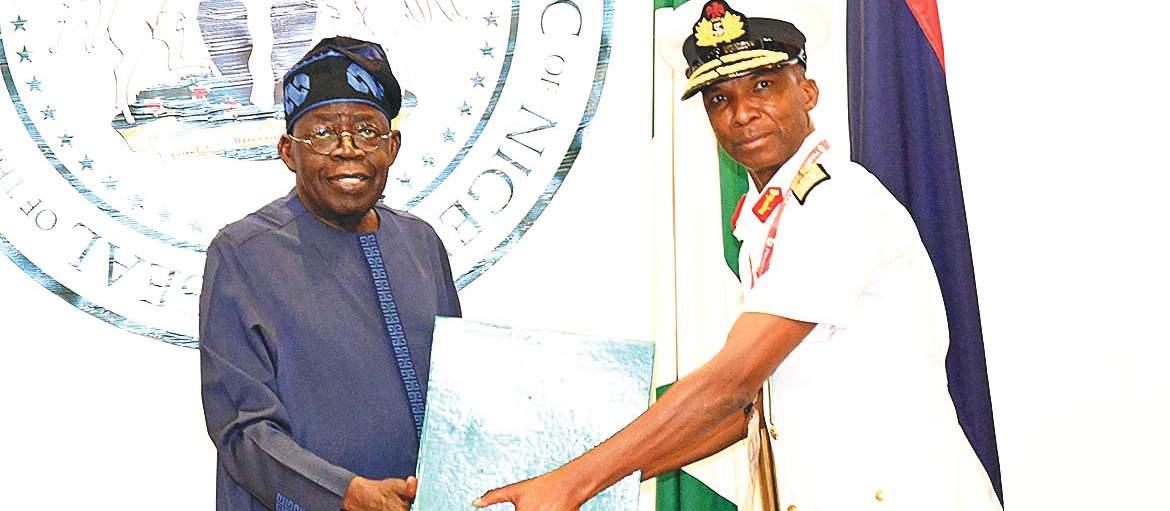
President Bola Ahmed Tinubu (L) receiving copies of a research paper from the representative of the participants on behalf of the Commandant, National War College, Real Admiral A. A. Ahmed, during the presentation by National Defence College (NDC) Course 33, during a visit to the President at the Presidential Villa, Abuja, yesterday
Aims to reduce methane emissions by 60% by 2031 NMDPRA: Domestic fuel supply grew from 1.3bn litres in 2024 to 3.8bn litres in 2025
The Nigerian Upstream Petro- leum Regulatory Commission (NUPRC) yesterday stated that achieving a 2.5 million barrels per day crude oil production in 2026 was achievable, especially with the planned reactivation of shut-in and dormant oil wells.
evacuation routes, coupled with intensified collaboration with national security agencies, has significantly curtailed crude theft and enhanced accountability across the industry.
Major marketers seek free, fair competition in oil sector Minister says PIA has improved transparency, enhanced investor confidence to generate nearly 90 per cent of Nigeria’s foreign exchange earnings and 70 per cent of government revenue, he pointed out that Nigeria was fully aware that the long-term viability of the energy sector depends on aligning growth with climate responsibility.
Speaking in Abuja at the 2025 Energy Correspondents Association of Nigeria (ECAN) Conference, tagged: “Four Years of the PIA: Achievements, Gaps and the Road Ahead”, the Chief Executive of the commission, Gbenga Komolafe, noted that the NUPRC was also aiming to slash methane emissions by 60 per cent by 2031.
Besides, Komolafe noted that the approval of 37 new
“Through our ‘Project One Million Barrels’ Initiative, launched in 2024, Nigeria is actively ramping up crude oil production by reactivating dormant fields, fast-tracking regulatory approvals, and en- hancing operational efficiencies across the upstream value chain.
“With a clear target of increas- ing production to 2.5 million bpd by 2026, the initiative has already demonstrated strong momentum with current unreconciled daily production averaging 1.7 - 1.83 million bpd.
“Equally crucial is the
protection and optimisation of national hydrocarbon as- sets. The approval of 37 new evacuation routes, coupled with intensified collaboration with national security agencies, has significantly curtailed crude theft and enhanced accountability across the industry. At the same time, the enforcement of the Domestic Crude Sup- ply Obligation (DCSO) is securing consistent feedstock to local refineries, strengthen- ing Nigeria’s internal supply chains and building long-term economic resilience,” he stated.
Represented by the Head of Regulatory and Statutory Compliance, NUPRC, Kingston Chikwendu, Komolafe in his keynote address, stressed that Nigeria faces a dual challenge
of managing the risks inherent in a dynamic global energy market while seizing the vast opportunities these resources offer for sustainable growth and energy security.
This is particularly significant for Nigeria, which he averred holds approximately 30 per cent and 34 per cent of Africa’s oil and gas reserves, respectively.
Komolafe highlighted the recent bid rounds which he explained were anchored on quality data access, regulatory certainty, and an investor-cen- tred reform agenda recorded unprecedented successes. These, according to him, included the 57 PPL awards of 2022, the 2022 Mini-Bid Round, and the 2024 Licensing Round.
While hydrocarbons continue
The National Assembly has criticized the inability of some Host Community Development Trust, HCDT, to execute any project in oil bearing communities despite the sum of N373bn made available to them for the funding of projects.
But the Executive Director of Foundation for Partnership Initiatives in the Niger Delta, (PIND), Mr. Sam Daibo, has said the Bridges Project has shown that the success of the Petroleum Industry Act, PIA, and particularly the HCDT model would depend not just
on compliance, but on col- laboration, trust, and shared accountability.
The chairman, House Committee on Host Communities, Mr. Dumnamene Dekor, expressed dissatisfaction over the utilization of the HCDT, during the Bridges Project Host Community Development Trust Stakeholders Dialogue Forum held at Ikot Ekpene Local Council of Akwa Ibom State yesterday.
The two-day close-out forum, themed “Four Years of the PIA: Lessons, Gains, and the Path Forward for Host Community Development Trusts (HCDTs),” was
organized by Partnership Initiatives in the Niger Delta, (PIND), in collaboration with the Ford Foundation.
Dekor warned the House of Representatives may soon consider a Bill for a law to change the leadership of some Trusts who have received Partnership Initiatives in the Niger Delta, (PIND); but yet to execute one project after more than a year of existence.
“’Over N373bn is available to all the Trusts. What percentage of this has been put to use? This is another question. And so, for those Settlors and those Trusts that must have been funded but
they are yet, for so many months and some of them more than a year, to even start one project, then there’s the need to look at it.
“Our gas-centric energy transition strategy is a corner- stone of this effort, anchored by flagship initiatives such as the Decade of Gas, the Nigerian Gas Flare Commercialisation Programme (NGFCP), and the Presidential CNG Initiative. These programmes collectively aim to eliminate routine gas flaring by 2030 and reduce methane emissions by 60 per cent by 2031,” he added.
Beyond infrastructure, the NUPRC, he said, is also championing the creation of a transparent, competitive, and investor-friendly gas market, unlocking the commercial potential of an estimated 600+ trillion cubic feet of gas resources (upward potential) and positioning Nigeria as a central hub in the global energy transition.
He underscored the new
frontier opportunities in on- shore, shallow water and deep offshore blocks, especially in underexplored basins, enabled by the new licensing rounds regime.
Also, in a speech made avail- able to journalists at the event, the NMDPRA Chief Executive, Farouk Ahmed, stated that over the past four years, the Authority has implemented a series of reforms and initiatives aimed at strengthening industry compliance, improving service delivery, and fostering stakeholder collaboration.
These efforts, he stressed, have led to improved monitor- ing mechanisms, data-driven decision-making, and the adoption of innovative tech- nologies to support regulatory effectiveness.
Ahmed, who was rep- resented by the NMDPRA spokesman, George Ene-Ita, said that the Authority has suc- cessfully gazetted 18 regulations and developed guidelines and standard operating procedures for implementation in the sector.
Continues online
Onyebuchi Ezigbo in Abuja
The Petroleum and Natural Gas Senior Staff Association of Nigeria (PENGASSAN) has expressed concern over the condition of pensioners in the country.
The association said that most
of the pensioners have had their income eroded by years of economic down-turn coupled with inflation and devaluation.
Speaking at a One-day Sum- mit on the Future of Pension in the Nigerian Oil and Gas industry, organised by PENGASSAN, the president of the
association, Festus Osifo said that most retirees have been plunged into hardship and penury as a result of stagnant income they receive. He said that the condition of these retirees have been further compounded by the volatility of the country’s economic climate.

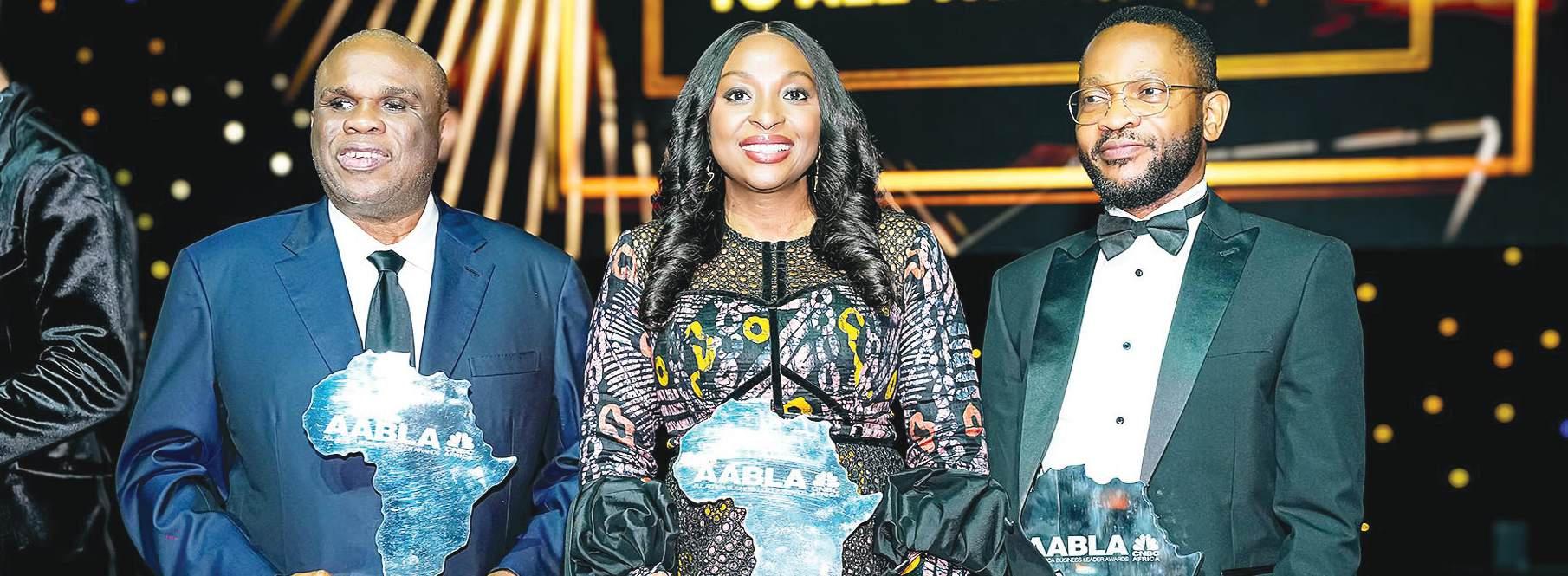
L-R: Former President and Chairman of Afreximbank, Prof. Benedict Okey Oramah; President/GCEO of Transnational Corporation Plc and winner of the 2025 Business Woman of the Year Award, Dr. Owen D. Omogiafo; and Chief Financial Officer of Heirs Energies Limited, Samuel Nwanze, at the 13th All Africa Business Leaders Awards held in South Africa…recently
Shettima demands shift to asset optimisation to drive trillion-dollar economy
Deji Elumoye in Abuja
The National Council on Privatisation (NCP) on Thursday approved the request by the Bureau of Public Enterprise to follow through on the engagement with Transcorp Power Consortium to secure execution of the Performance Agreements (PAs) on the sale of Afam Power Plc and Afam III Fast Power Limited.
The target is to regularise outstanding conditions and operational targets for the post-acquisition plan and ensure commercial viability of the plant.
This is just as NCP Chair- man, Vice President Kashim Shettima, has demanded a fundamental shift in Nigeria’s privatization agenda, urging a move from simply selling state-owned enterprises to asset optimisation designed to power the nation’s trillion-dollar economy ambition.
The approval for the ex-
ecution of the Performance Agreements on the sale of Afam Power Plc and Afam III Fast Power Limited followed a memo presented to the NCP by Director General of BPE, Ayodeji Ariyo Gbeleyi, at its third meeting held at the State House, Abuja.
According to him, the Federal Government completed the sale process of Afam Power plant, with an outstanding N53.9 billion collected as privatization proceeds.
The DG said while the asset has been fully handed to the core investor, Transcorp Power Consortium, the government also restructured its transaction thisAfteryear.the sale of the Afam Power Plant to the Transcorp Consortium, which was finalised in November 2020, the Federal Government needed to execute the Performance Agreements, a standard part of the post-acquisition process in Nigeria’s power
sector privatisation, outlining the investor’s commitment to specific performance targets, such as increasing the plant’s operational capacity within a given timeframe.
Gbeleyi noted that with the execution of the PAs to regularise the transactions, the BPE can now commence the
mandatory post-privatisation monitoring of the core investor’s performance obligations.
The DG said Council also deliberated extensively on its performance and that of the BPE in the year 2025, in terms of what was accomplished, including the unbundling of the Transmission Company
of Nigeria (TCN).
“As you heard at the meeting, the unbundling of the Transmission Company of Nigeria into two entities, Nigerian Independent System Operator, as well as the Trans- mission Service Provider, was achieved in the course of this year,” he explained.
Before the approval, Chair- man of the NCP, Vice President Shettima, who demanded a fundamental shift in Nigeria’s privatisation agenda, said there is a need to shift from simply selling state-owned enterprises to asset optimisation designed to power the nation’s trilliondollar economy ambition.
Targets $1 trillion economy through innovation, enterprise
Sunday Ehigiator
The Presidency has announced plans to convene a landmark national engagement themed, ‘Dear Entrepreneurs, We See You, We Hear You’, aimed at fostering deeper collaboration between government and Nigeria’s vibrant entrepreneurial community.
The dialogue which forms part of President Bola Ahmed Tinubu’s Renewed Hope Agenda will bring together business leaders, innovators, and small business owners from across the country for a high-level conversation on advancing enterprise-driven economic growth.
Announcing the initiative,
the Senior Special Assistant to the President on Entrepreneurship Development (Communications, Innovation and Digital Economy), Ms. Chalya Maryam Shagaya, in a statement yesterday, described the dialogue as “a defining moment to strengthen collaboration between government and the
Deji Elumoye in Abuja
President Bola Ahmed Tinubu has congratulated the Super Eagles on their emphatic 4-1 victory over Gabon in Thursday’s FIFA World Cup qualifying Africa Playoff match, describing the performance as a clear expression of the Nigerian character that rises, adapts, and prevails.
The President, in a statement issued by his Adviser on
Information and Strategy, Bayo Onanuga, noted that the team played with courage, balance, and precision, and reminded the country that football has always been one of Nigeria’s most potent symbols of unity and shared pride.
According to him, the victory added fresh momentum to the national spirit and strengthens the collective resolve to secure a place at the World Cup.
President Tinubu com-
mended the players, the coaching staff, and the entire technical and administrative crew for their unwavering commitment to the national cause, adding that the dedication has brought the national team victory.
He added that the victory reflects the deep pool of talent that Nigeria continues to produce and the determination of the Super Eagles to reclaim their place among the conti-
nent’s most respected teams.
The President also praised the millions of Nigerians at home and abroad who continue to support the team with passion and loyalty, emphasising that their energy remains a powerful driving force for the players, especially at critical moments of international competition.
In a message to the squad, President Tinubu reiterated the need for the team to build on
this victory and remain focused on the remaining qualifiers saying every match presents an opportunity to show discipline and character, and to prove again that Nigeria’s ambition is firmly within reach.
According to President Tinubu, “this is the true Nigerian spirit of resilience against all odds. Do not stop until you secure a qualification.
Super Eagles, keep soaring. The nation stands with you!”
nation’s job creators while reaffirming the administration’s commitment to building a $1 trillion economy driven by innovation, enterprise and inclusive growth.”
Shagaya explained that her office has, since inception, engaged extensively with entrepreneurs across sectors such as agriculture, manufacturing, technology, creative industries, fashion, renewable energy, education, insuretech, fintech, and oil andShegas.said these consultations have revealed both the resilience and challenges within the nation’s entrepreneurship ecosystem, providing the foundation for the upcoming policy dialogue. Her words: “This administration has demonstrated an unwavering commitment to advancing entrepreneurship as a driver of national transformation. This dialogue is not just a conversation; it is a call to action to refine, realign, and reinforce the policies that empower Nigerians to build, innovate, and create value.”

Emmanuel Addeh in Abuja
The federal government yesterday announced the suspension of the fresh 15 per cent import duty on imported petrol and diesel, stressing that the implementation was ‘no longer in view’.
A statement by the Nigerian Midstream and Downstream Petroleum Regulatory Authority (NMDPRA), also assured Nigerians that the country has robust domestic supply of petroleum products sourced from both local refineries and
importation to ensure timely replenishment of stocks.
It therefore warned against panic buying of petroleum products, urging Nigerians to go about their normal duties, without apprehension over the availability of critical fuels.
Nigeria’s recent decision to impose a 15 per cent import duty on petrol and diesel was conceived in some quarters as a bold step toward reducing the country’s dependence on imported refined products and encouraging the use of locally produced fuel in certain quarters.
M ATAwA lle: wI ke Ignore D Serv I ce
and displayed discipline and respect throughout the encounter.
The explanation came hours after Minister of Defence, Mohammed Badaru, reaffirmed the federal government’s com- mitment to protecting and safeguarding officers of the armed forces while performing their lawful duties.
Badaru, who gave the as- surance when he addressed a press conference in Abuja
order restraining AMCON from taking any steps in the appointment of a Receiver over GHL and also reinforced the same order on October 22.
However, Justice Akintayo Aluko of the same Federal High Court, Lagos, two days later, on October 24, ruling in an ex parte application brought by AMCON, made an order for the appointment of a Receiver over GHL, necessitating the contempt proceedings against AMCON, its officials, as well as legal representatives, who were aware of the subsisting order of Justice Lewis-Allagoa.
GHL, in the court documents, specifically accused AMCON of misleading the Federal High Court, Lagos, and Justice Akintayo Aluko into granting an order for the appointment of a Receiver over GHL, in the sense that they refused to disclose the existence of a substantive injunction issued by Justice A. LewisAllagoa of the same Federal High Court, Lagos days earlier, which restrained them from taking any steps whatsoever towards “APPOINTING OR CONTINUING WITH” any appointment of a Receiver over GHL.
GHL submitted, “In a gross abuse of court process, AMCON and its lawyers failed to disclose to Justice Aluko that Justice Lewis Allagoa had in fact restrained AMCON from appointing or continuing any receivership when they obtained the Order Ex Parte.
“Furthermore, they misrep- resented the facts that there
to officially flag off the 2026 Armed Forces Celebration and Remembrance Day (AFCRD), cautioned against actions that could undermine the authority, professionalism, or dignity of uniformed personnel in the discharge of their responsibilities. His reaction followed a viral video showing Wike, verbally assaulting the naval officer on guard duty at a disputed estate land in Abuja.
was an Eligible Bank Asset (EBA) issued by AMCON to GHL, this is not true.
“Indeed, AMCON made a part-payment and deposit towards a First Bank of Nigeria (FBN) EBA and made Tranche 1 payment to First Bank of Nigeria Limited (FBN), and did not make the 2nd and final payment to FBN to complete the consideration towards an EBA.”
The applicants further disclosed that FBN had since offered to return the EBA deposit in letters to AMCON and processes filed in court, adding that AMCON, instead of pursuing FBN, for some curious and inexplicable reasons, are seeking to go after GHL, despite all their
OML 42. The ex parte orders restrained the defendants from operating or dealing with their funds or shares in various banks and financial institutions across Nigeria.Pursuant to the orders, the Receiver/Manager appointed by the Nestoil lenders, Mr. Abubakar Sulu-Gambari, SAN, reportedly took possession of the companies’ head office in Victoria Island, Lagos and attempted to disrupt crude oil production and export activities in OML 42.
However, Legal experts have opined that, pursuant to Order 26 Rule 10(1) and (3) of the Federal High Court (Civil Procedure) Rules, 2019, the ex parte orders granted on October 22 had automatically expired yesterday, having exceeded the
On the other hand, the duty, many argued, would add to the per litre landing cost of petrol and diesel, which would almost certainly raise pump prices. The plan, approved by President Bola Tinubu in late October 2025, was part of efforts to protect emerging domestic refineries, particularly the Dangote Refinery, which has been increasing output.
The government’s argument was that Nigeria could not continue to rely on imported fuel when it now possessed growing refining capacity that
But Wike, while reacting to the position of former army chief, General Tukur Buratai, said Buratai misconstrued the incident with Yerima as a threat to national security and a slight on the authority of President Bola Tinubu.
Former Chief of Defence Staff, General Lucky Irabor, also weighed in on the matter, describing it as an unfortunate development that raised deeper
correspondence to the contrary blaming FBN, which are all before the courts.
Consequent upon the above, the Form 48 – Notice of consequence of disobedience of court orders – has been issued against the following: Dr Bala Bello (Chairman of AMCON); Mr Gbenga Alade (MD of AMCON); Mr Adeshola Lamidi (ED of AMCON); Mr Lucky Adaghe (ED of AMCON); and Dr Aminu Mukhtar Dan’amu (ED of AMCON).
Others include Mr Oluseyi Akinwunmi (purported Receiver appointed by AMCON); Mr Bidemi Ademola-Bello SAN (Counsel to AMCON and the MD of AMCON, who was in court when Honourable Justice A. Lewis-Allagoa made the
14-day statutory limit following the filing of their motion to discharge the orders.
They noted that under the cited provisions, any ex parte order automatically lapses 14 days after the filing of a motion to vary or discharge it, unless the court expressly directs otherwise in the interest of justice.
The relevant rule stipulates that an order made on motion ex parte shall not, unless the court otherwise directs in the interest of justice, last for more than 14 days after the affected party has applied to vary or discharge it, or another 14 days after such application has been argued.Furthermore, where the motion to vary or discharge an ex parte order is not heard within 14 days of filing, the order shall
needed to be protected and made competitive. Officials also saw the tariff as a way to curb excessive importa- tion, strengthen the naira by reducing demand for foreign exchange, and create incentives for local value addition in the downstream oil sector.
However, the proposal immediately triggered widespread concern as labour groups, business owners, and consumer advocates warned that the duty would push up fuel prices, deepen inflation, and worsen the already heavy burden on
questions about public respect for state authority and national institutions.
However, lawyer and human rights activist, Femi Falana, SAN, said both Wike and Yerima erred before the law.
But former Chairman of National Human Rights Commission, Anselm Odinkalu, criticised Wike, accusing him of acting outside the law in what he described as a recent forced
order and undertook in open court to abide by the orders of the court); and Mr Ade Adedeji SAN (Counsel to AMCON and the MD of AMCON, whose firm is representing AMCON and the MD of AMCON).
Meanwhile, Justice A. Lewis-Allagoa had now ordered substituted service of the contempt processes to all of the above-named persons through their official email addresses and WhatsApp phone numbers, and/or by delivering same to them at their official addresses and/ or by publishing same in at least two newspapers with nationwide circulation in Nigeria, and other news media with nationwide presence in Nigeria.
lapse unless the court otherwise directs in the interest of justice.
By this provision, the defendants’ motion to discharge the order, filed on October 30, 2025, remained unheard as of November 13, 2025, thereby causing all the orders to lapse automatically.
The experts cited judicial authorities affirming that ex parte orders, including Mareva orders, are interim reliefs intended to last only briefly and cannot subsist indefinitely.
They emphasised that “An ex parte order is, by its nature, made in the absence of the other party and is meant to last for a very brief period. By the relevant Rules of Court, such an order—whatever its form—shall not exceed 14 days in duration, and no more.”
households.
But the NMDPRA, in the statement signed by its Director, Public Affairs Department, George Ene-Ita, stated that the take-off of the initiative had been put in abeyance.
“The Authority wishes to use this opportunity to advise against any hoarding, panic buying or non-market reflective escalation of prices of petroleum products. It should also be noted that the implementation of the 15 per cent ad-valorem import duty on imported Premium Motor
entry into a private property.
Speaking in an interview on DCL Hausa, Matawalle described the incident as “unfortunate”.
He explained that Wike had earlier contacted both the Chief of Defence Staff and Chief of Naval Staff, who advised him to allow the military to investigate the issue before taking any action.
He added that when the Minister of the Federal Capital Territory (FCT) arrived at the location, the officer explained that he was simply carrying out orders.
Matawalle said the FCT minister should not have exchanged words with the officer, but ought to have channelled his concerns through the appropriate superior officers.
He stressed that the naval officer’s actions were lawful and professional, adding that he displayed the discipline, loyalty, and obedience expected of a trained military officer.
He said the young officer merely carried out his duty and deserved commendation.
Clarifying that the officer had not breached any military regulations, but conducted himself properly throughout the incident, Matawalle stated, “He committed no offence under military law; he obeyed a lawful order and followed due process.
They further argued that the 14-day limitation upholds the constitutional right to fair hearing guaranteed under Section 36(1) of the 1999 Constitution (as amended), as ex parte reliefs are granted without hearing the other party and are designed solely for urgent, temporary preservation of rights pending full hearing. Extending them beyond their lawful lifespan, one of the experts contended, would contravene constitutional principles of justice.
“The rationale for limiting ex parte orders to 14 days,” they explained, “is to prevent one party from being permanently prejudiced by an order obtained without being heard. The law therefore guards against abuse of judicial discretion and ensures adherence to due process.”
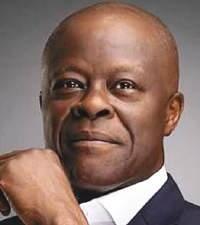
assured the general public that there is adequate supply of petroleum products in the country, within the acceptable national sufficiency threshold during this peak demand period.
If you observe carefully, he spoke respectfully and behaved ap- propriately.”
He cautioned that govern- ment officials must show due respect to members of the armed forces, stating that any act of disrespect towards a uniformed officer indirectly undermines the authority of the president, who serves as Commander-in-Chief of the Armed Forces.
Matawalle stated, “There is no offence under military law for which the officer should be punished. Wike should not have engaged him in an altercation, especially out of respect for the uniform he was wearing.
“Anyone who disrespects a soldier indirectly disrespects the Commander-in-Chief. There is, therefore, no basis for any disciplinary action against the officer.”
Matawalle emphasised that his remarks were not intended to justify indiscipline within the military but to highlight the importance of adhering to established command procedures. He explained, “This is not about encouraging the military to act disrespectfully towards civilians. However, the minister should understand that every officer has superiors. I under-
Continued on page 42
In the same vein, the law also offers no further basis or protection for enforcement once an ex parte order expires. The basis of an enforcement action is a live order. Once the order expires, further enforcement is not covered by Law. Agencies involved in the enforcement of the expired orders should therefore immediately vacate and withdraw from premises, assets etc once the order expires. Legal commentators note that, unless the plaintiffs file a fresh motion or the court expressly extends the orders in the interest of justice, the Mareva injunctions have ceased to have effect. “There is no longer any lawful basis for continued occupation of premises or assets or enforcement of an expired order” said one commentator.
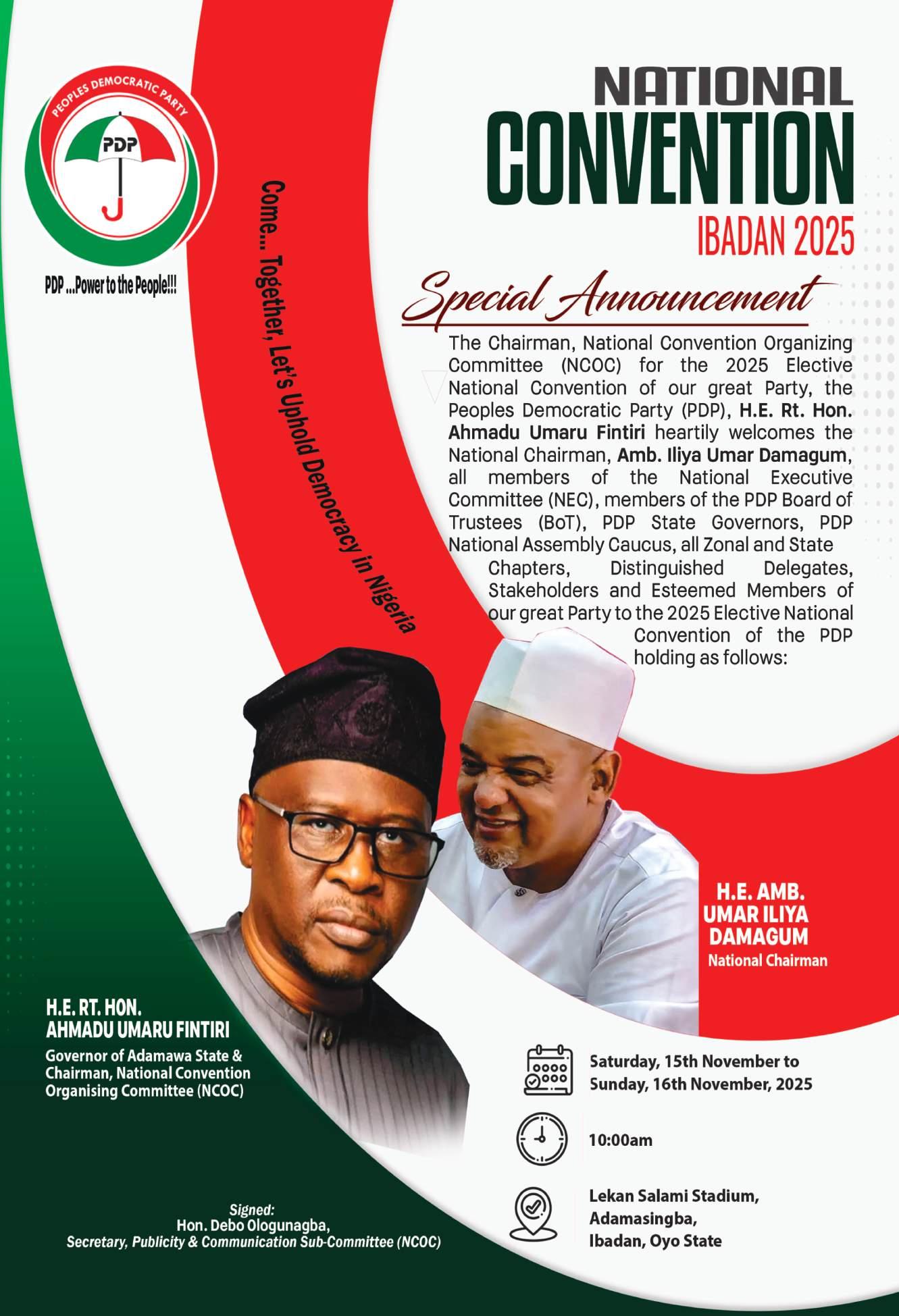
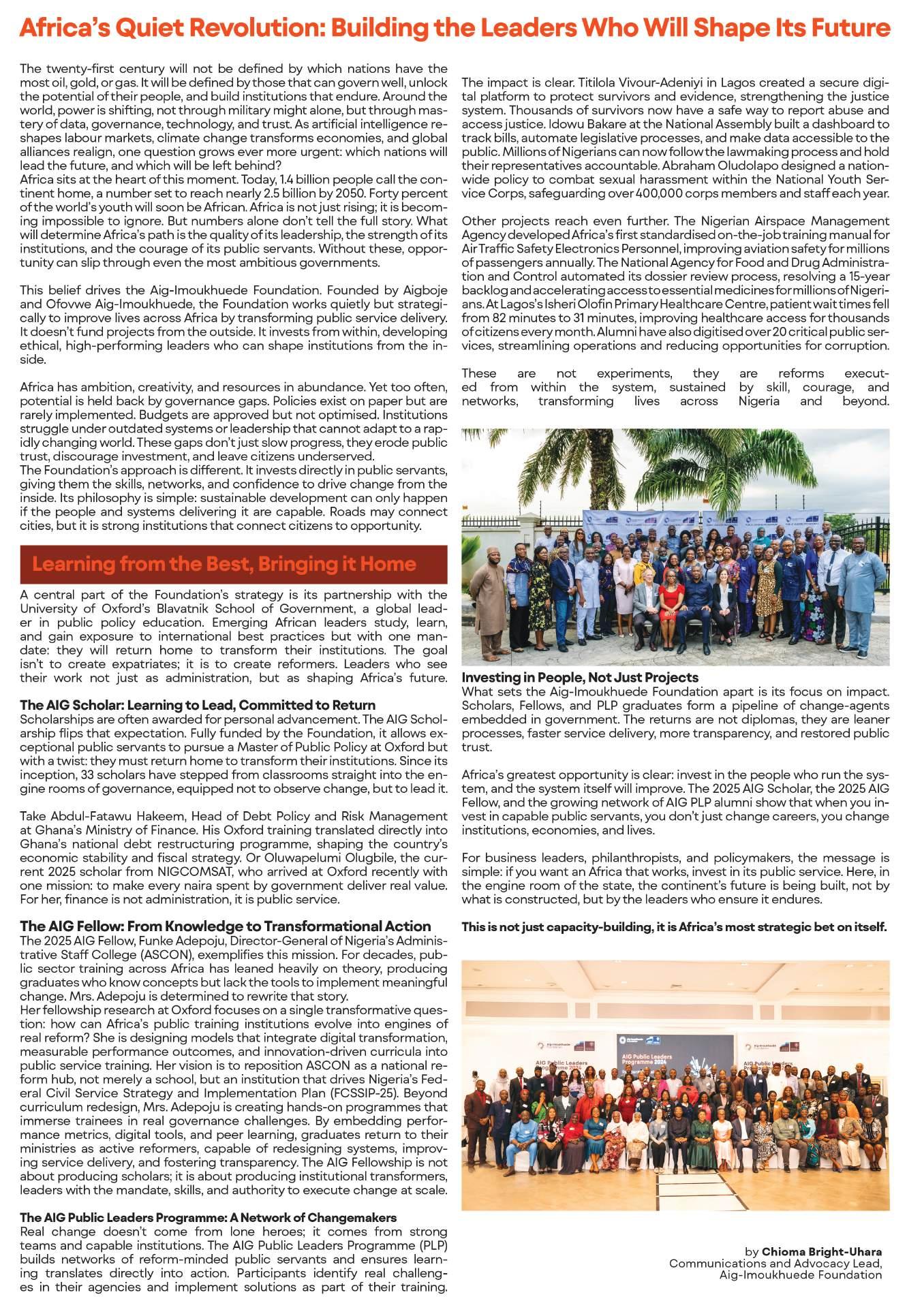


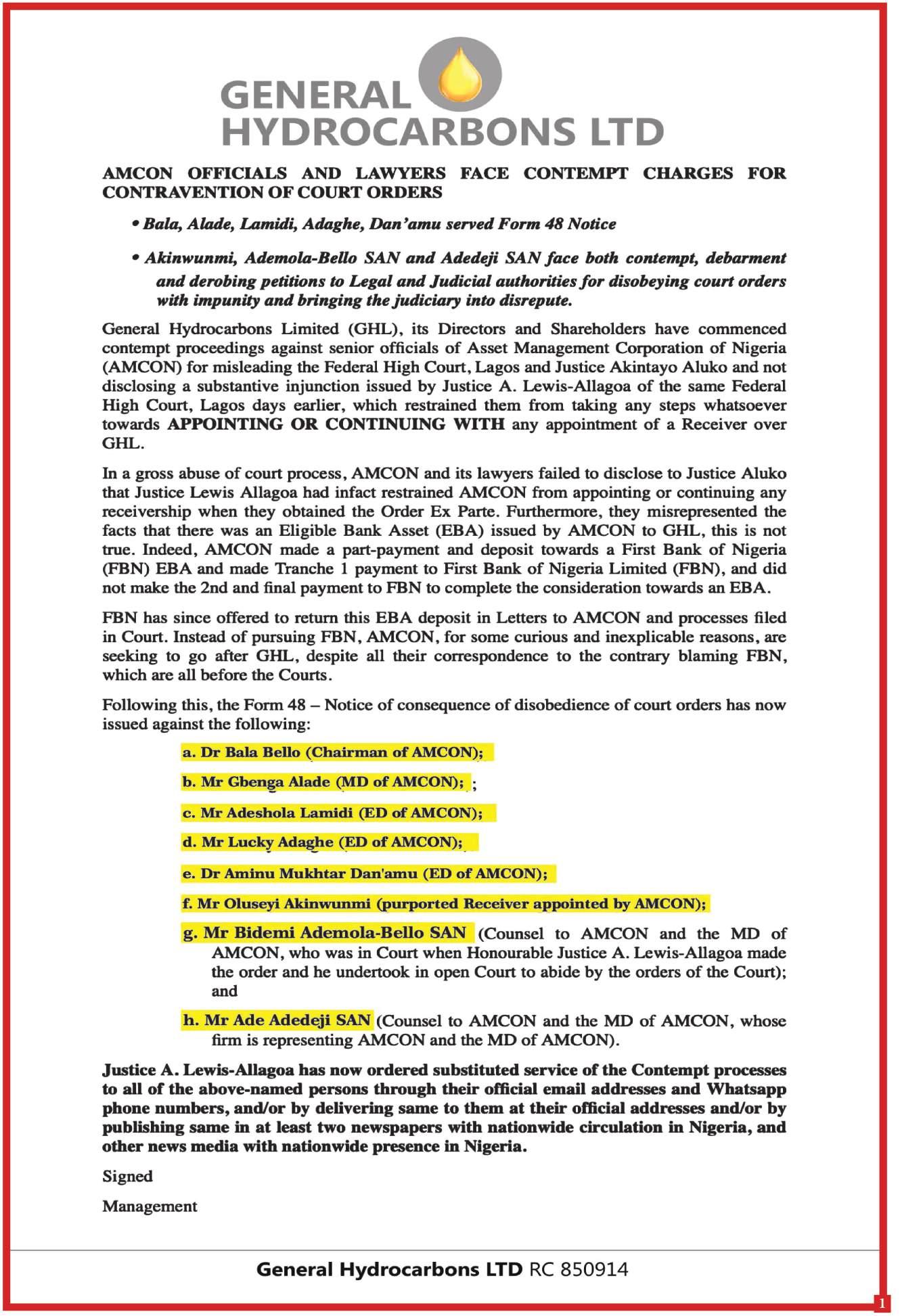
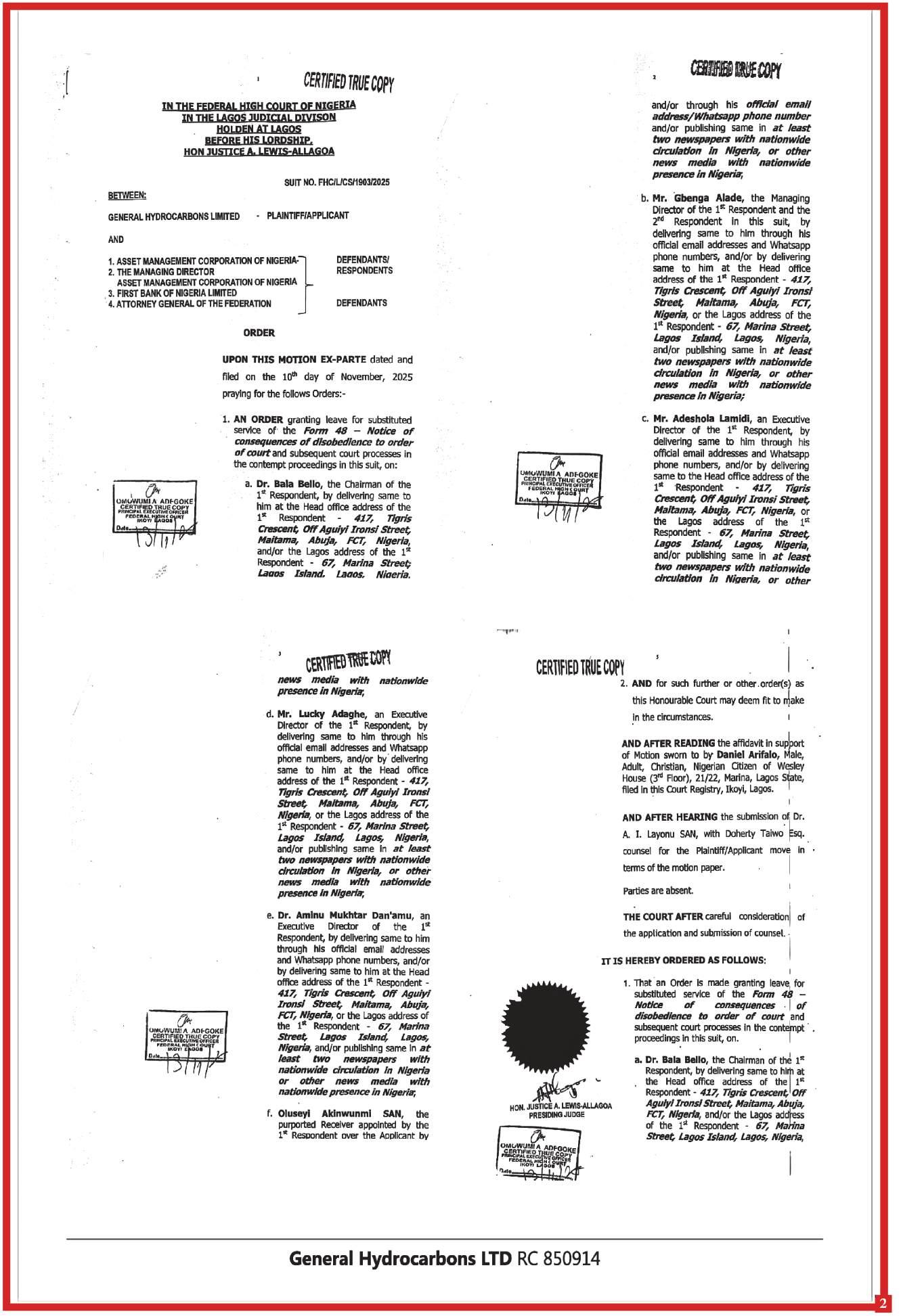
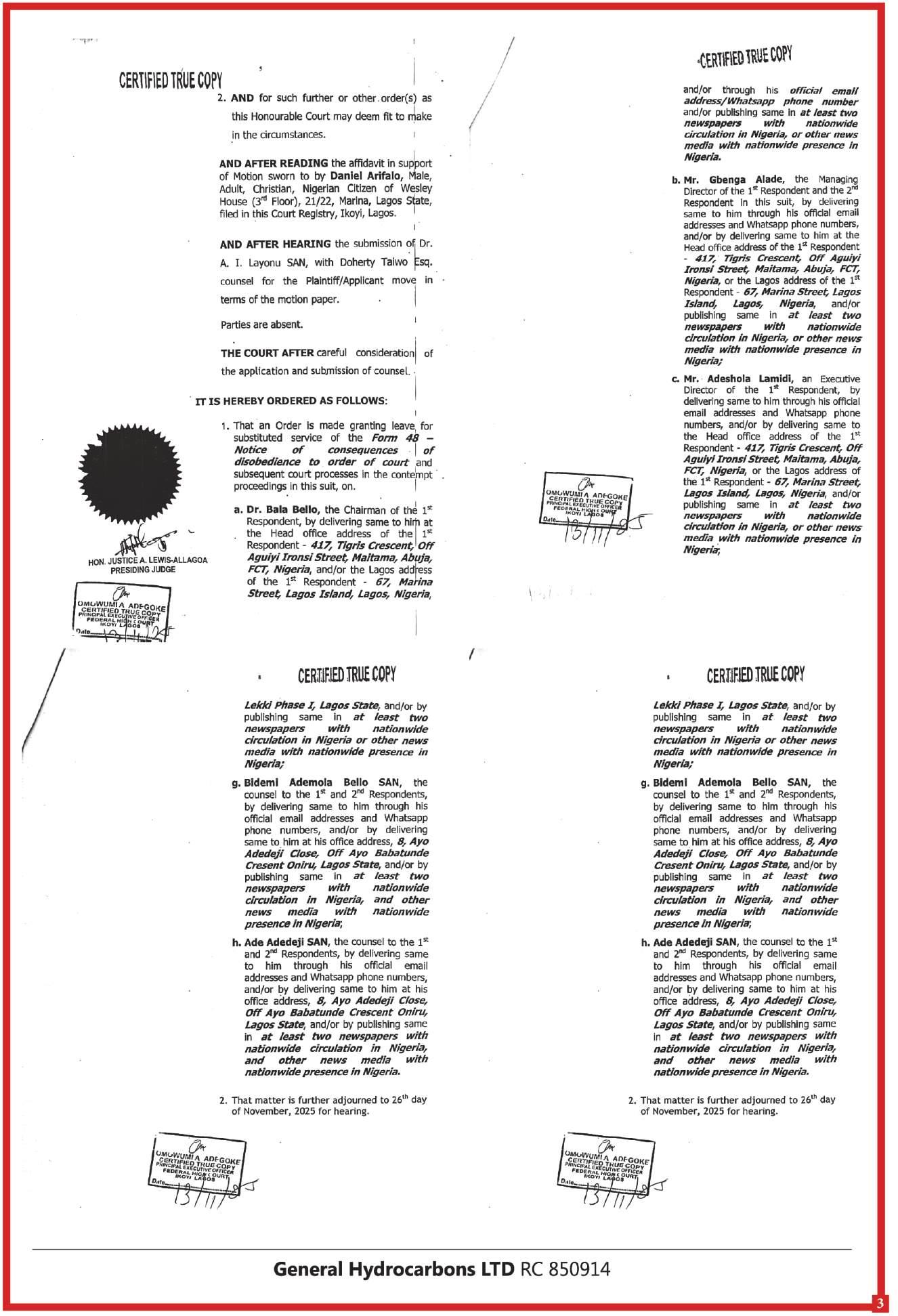
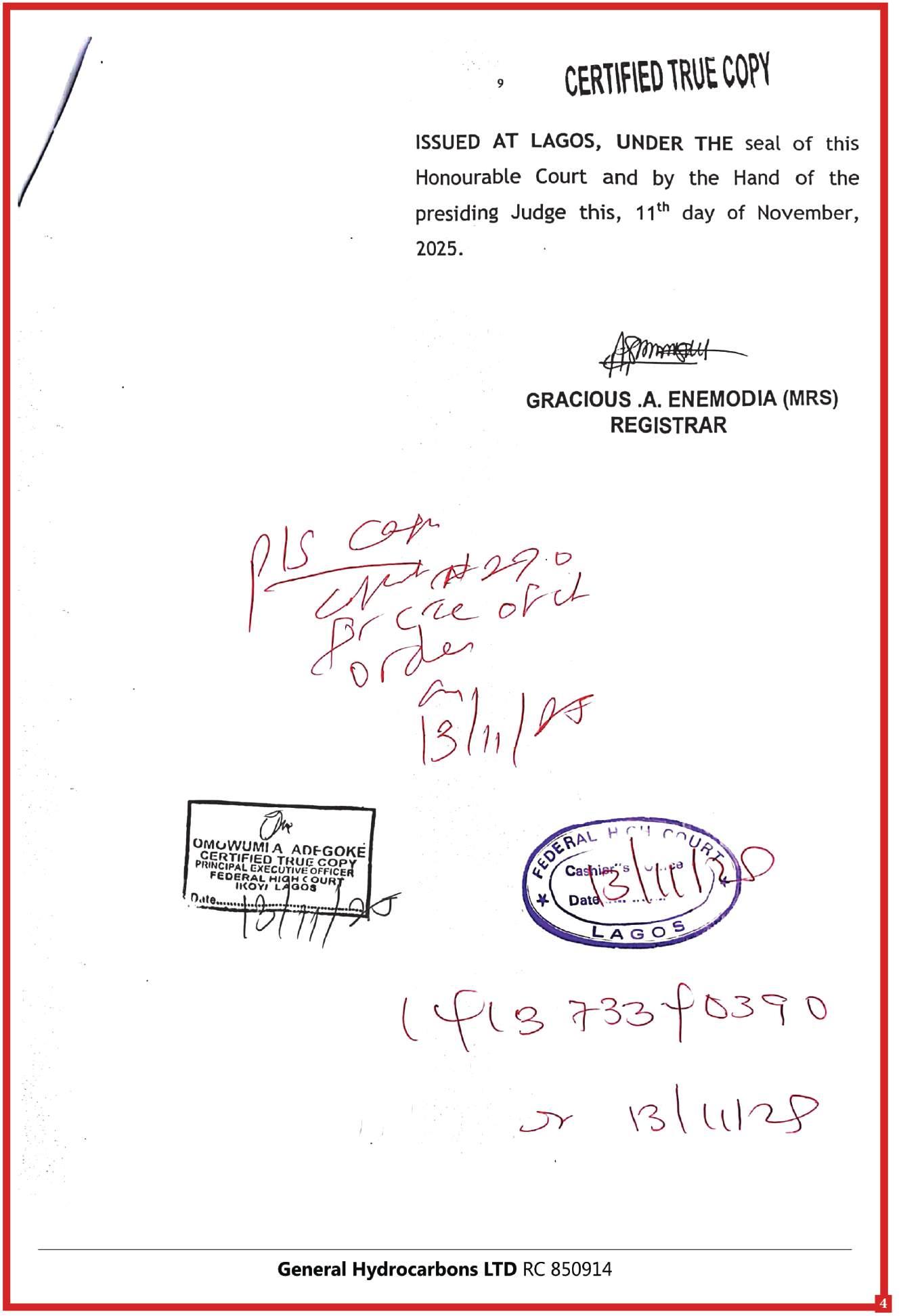
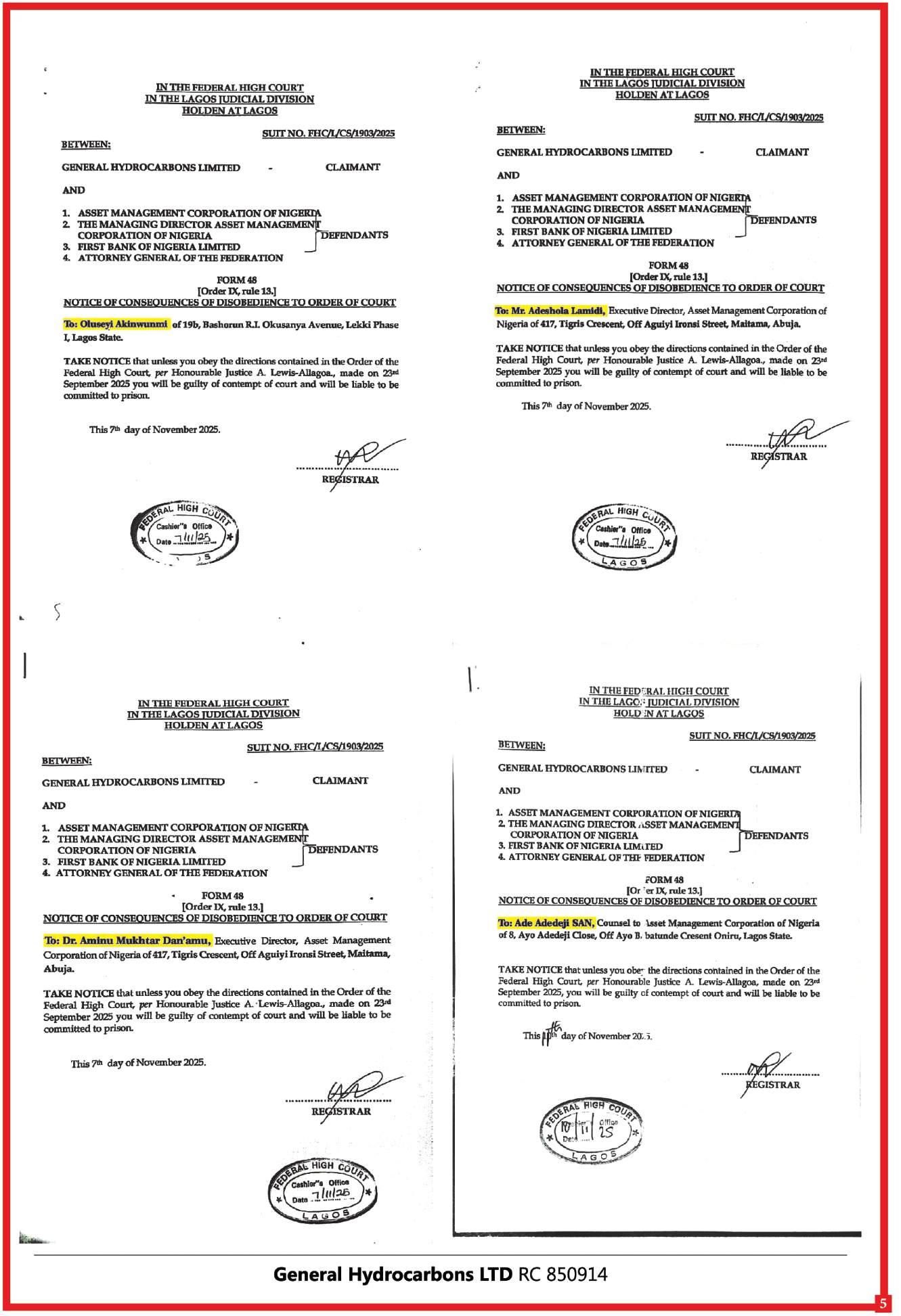
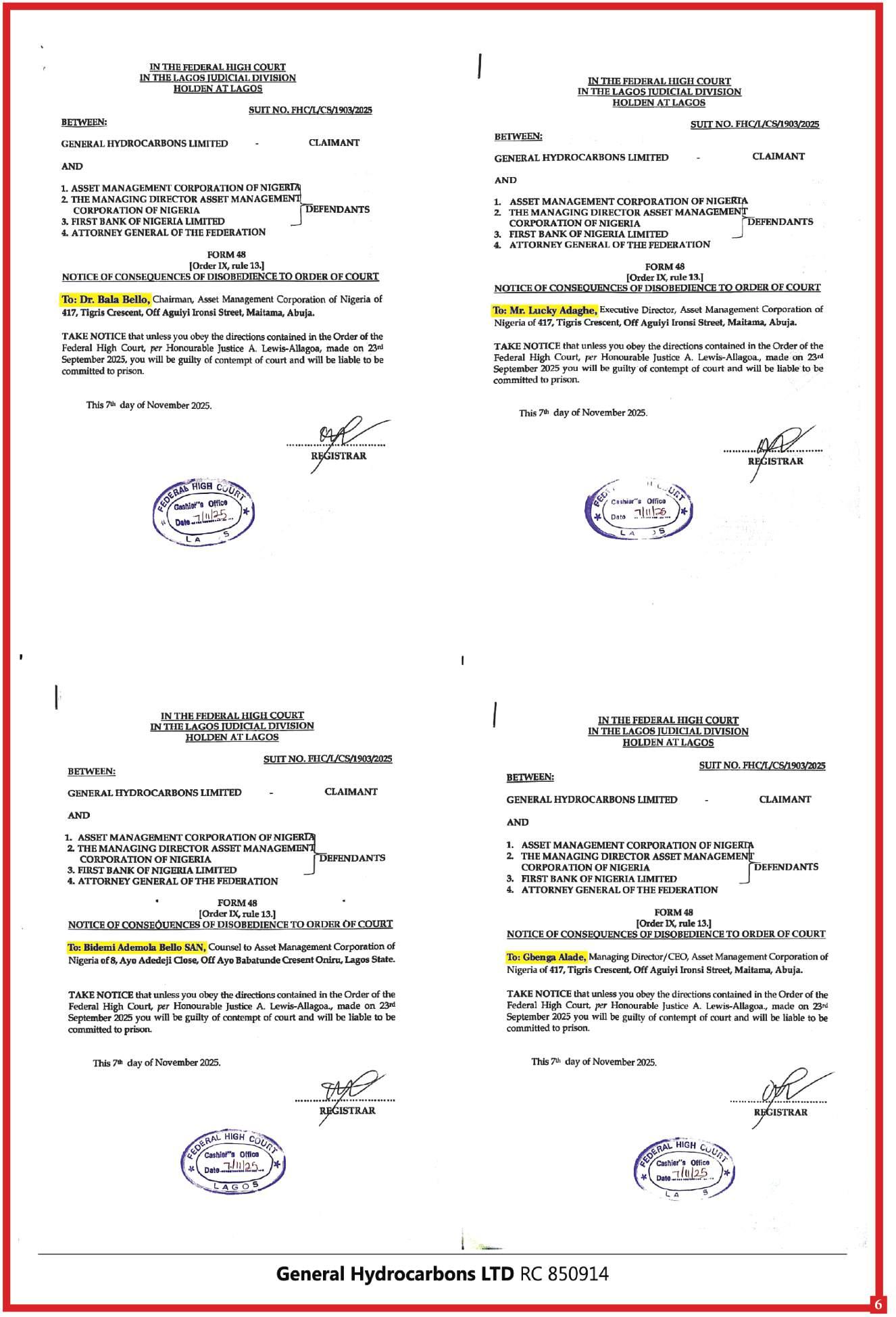
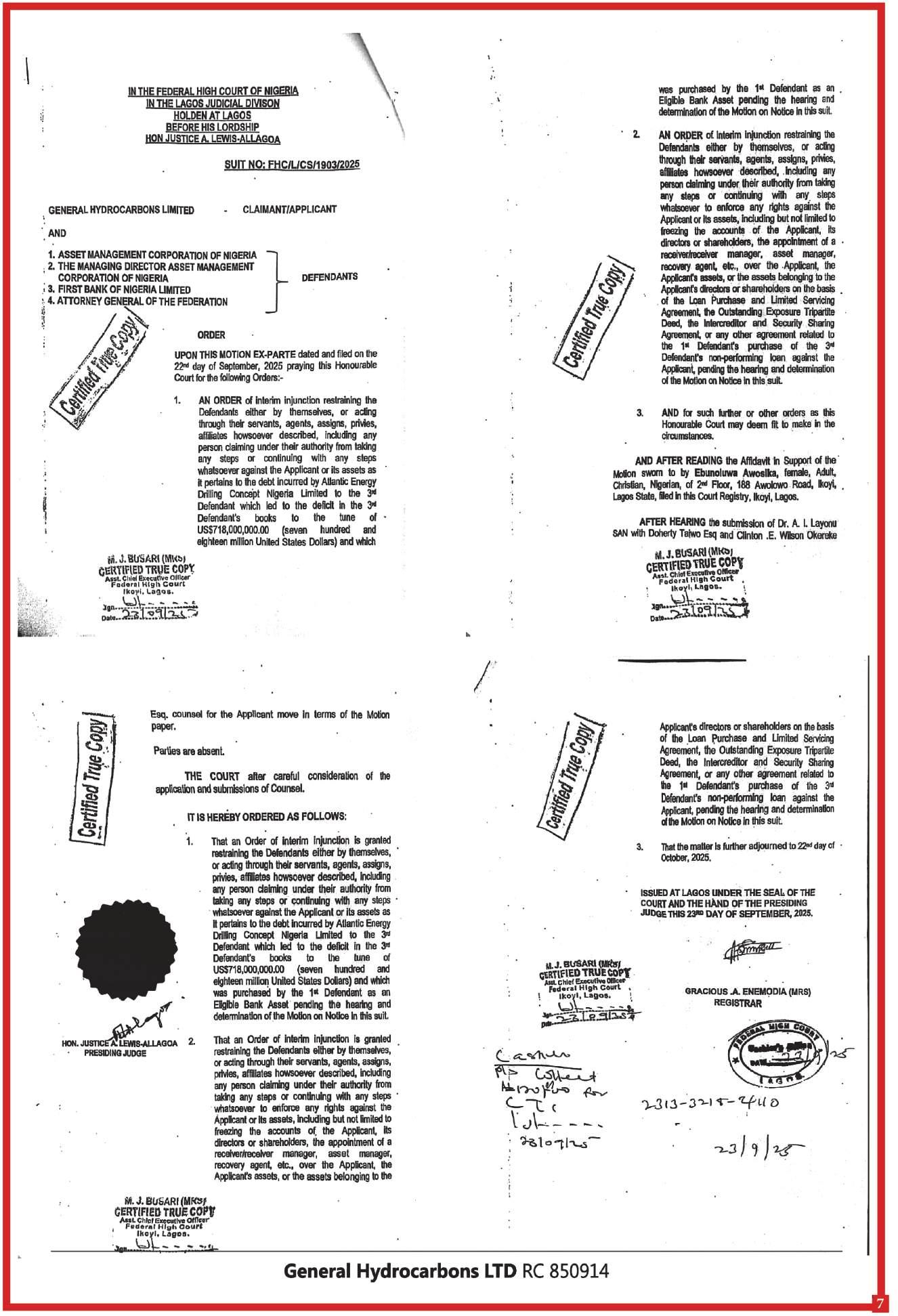
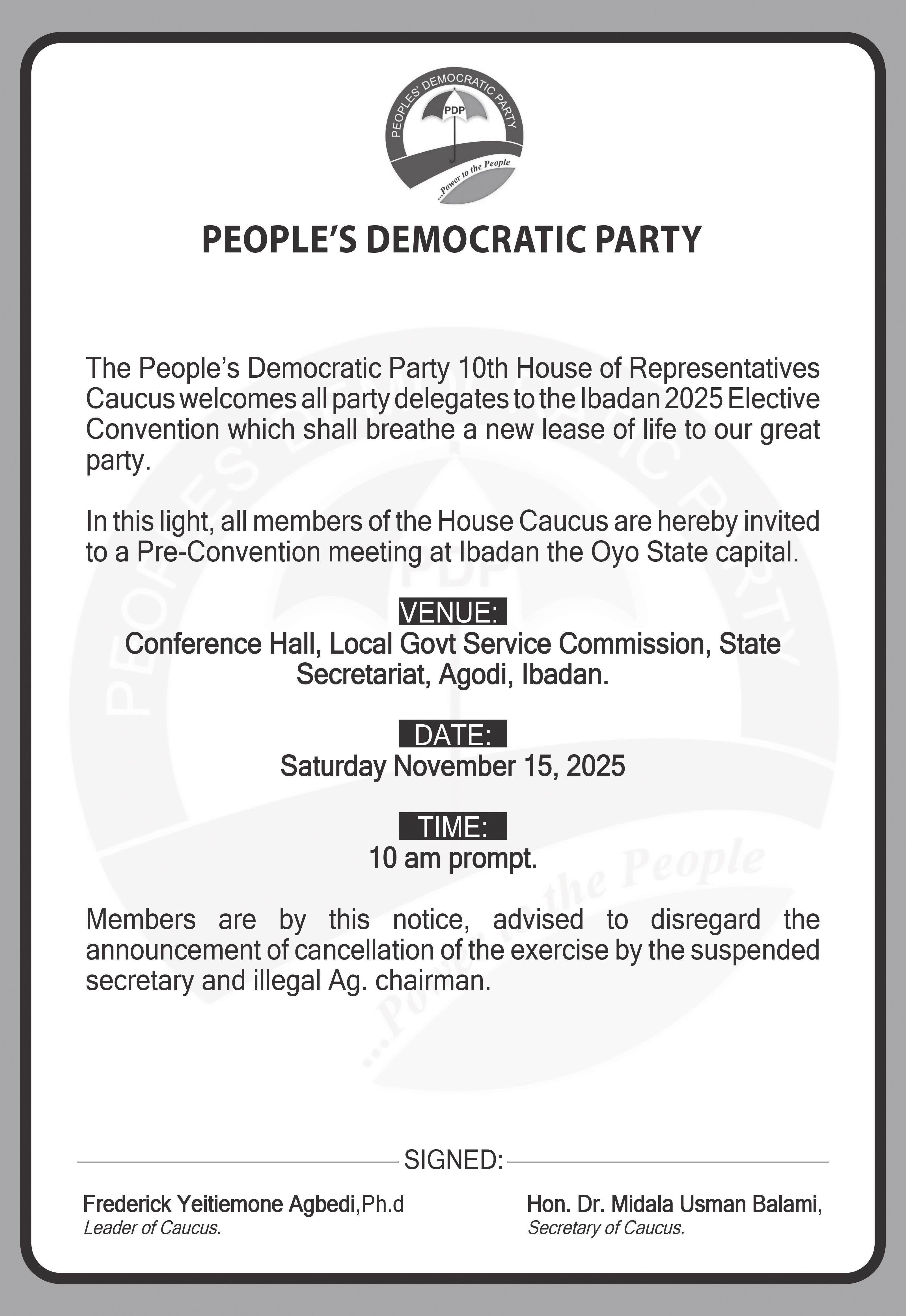
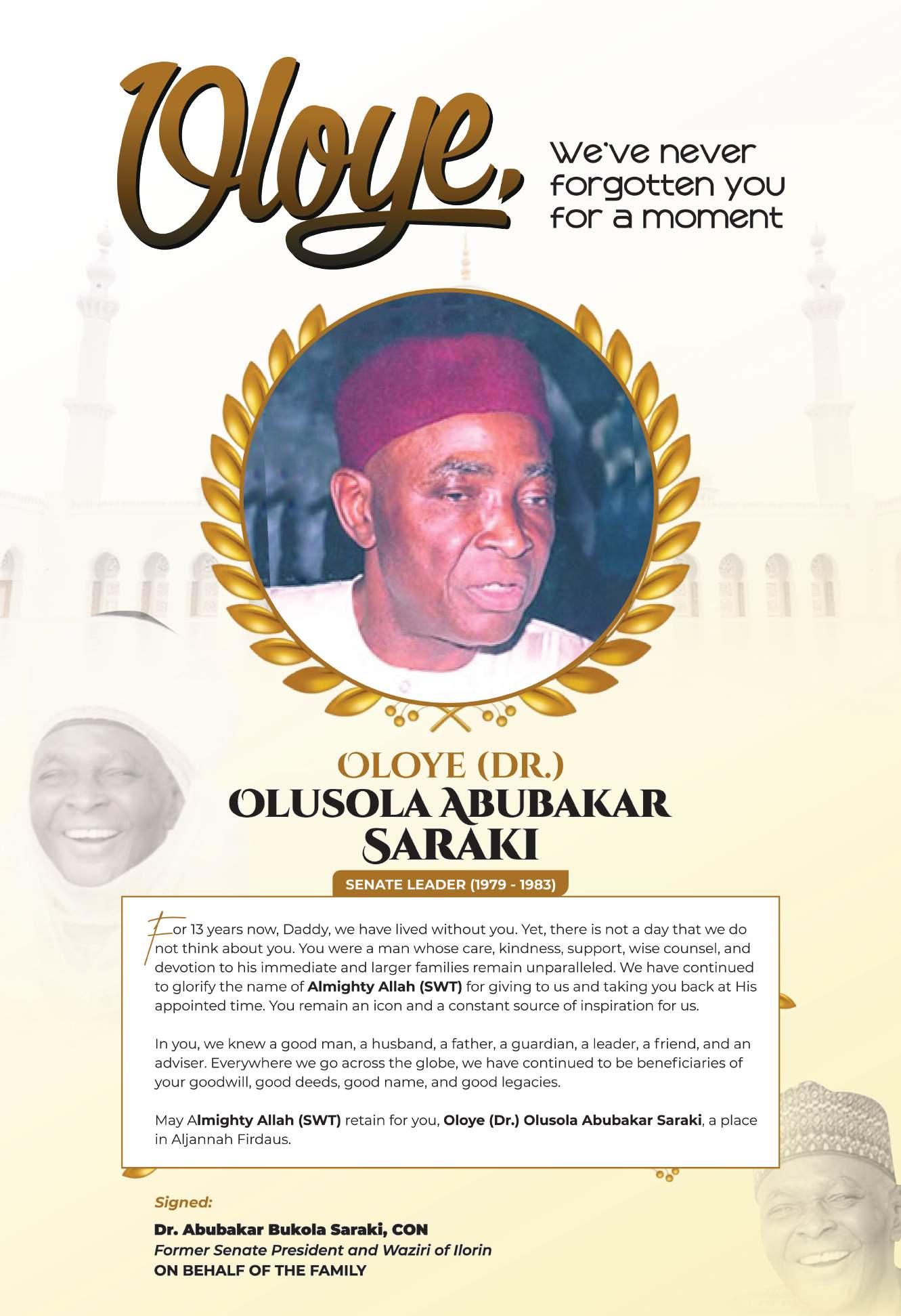
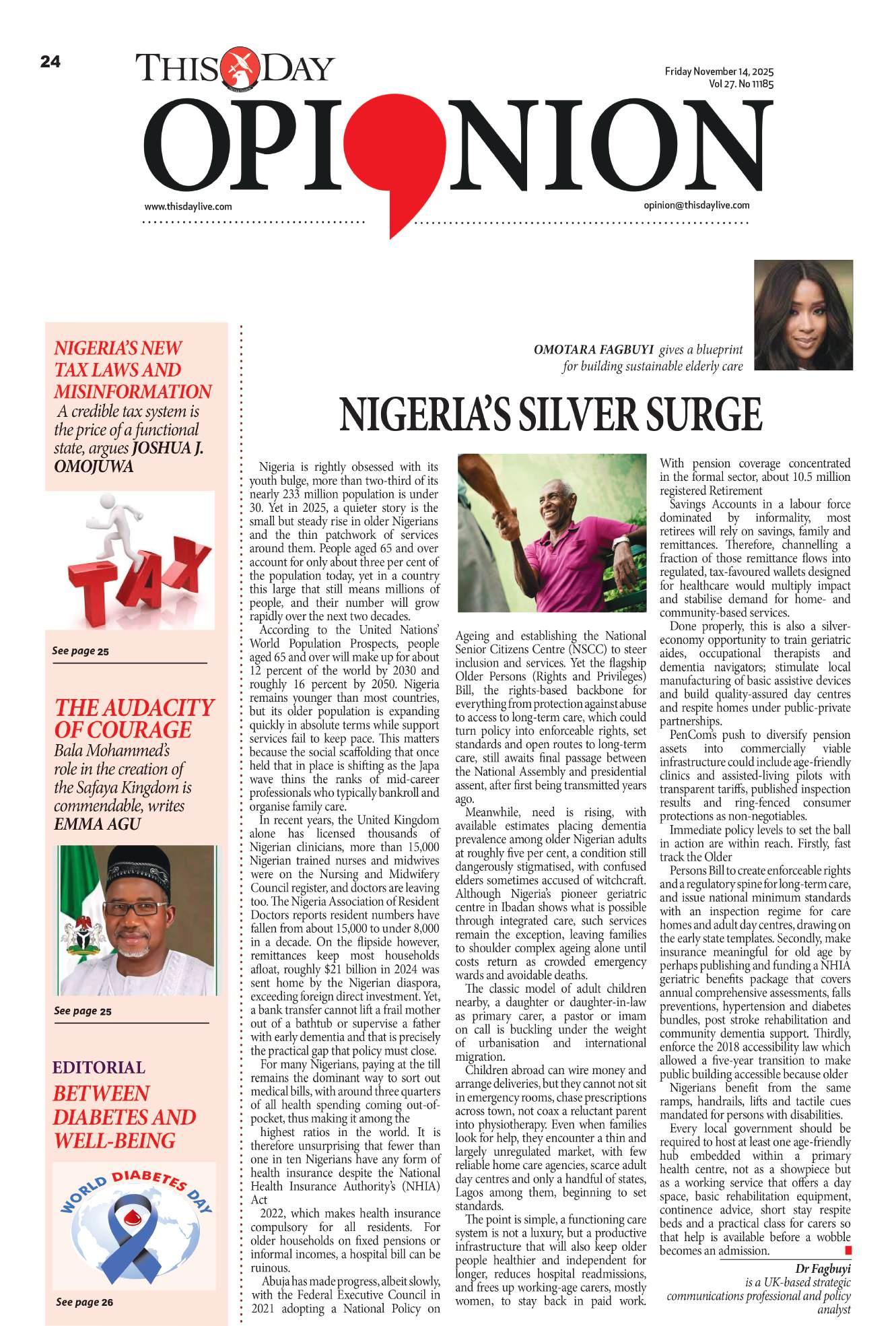
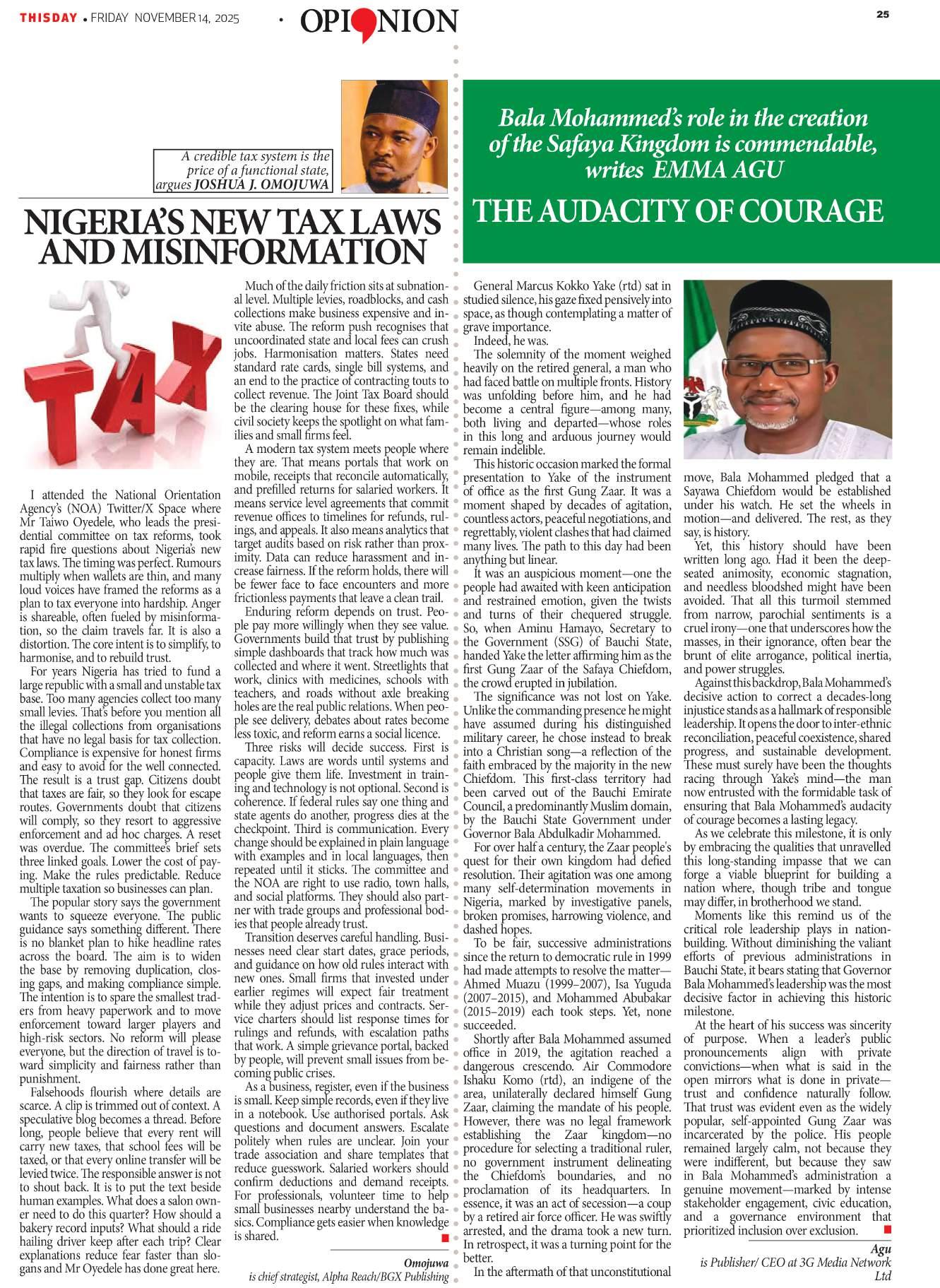
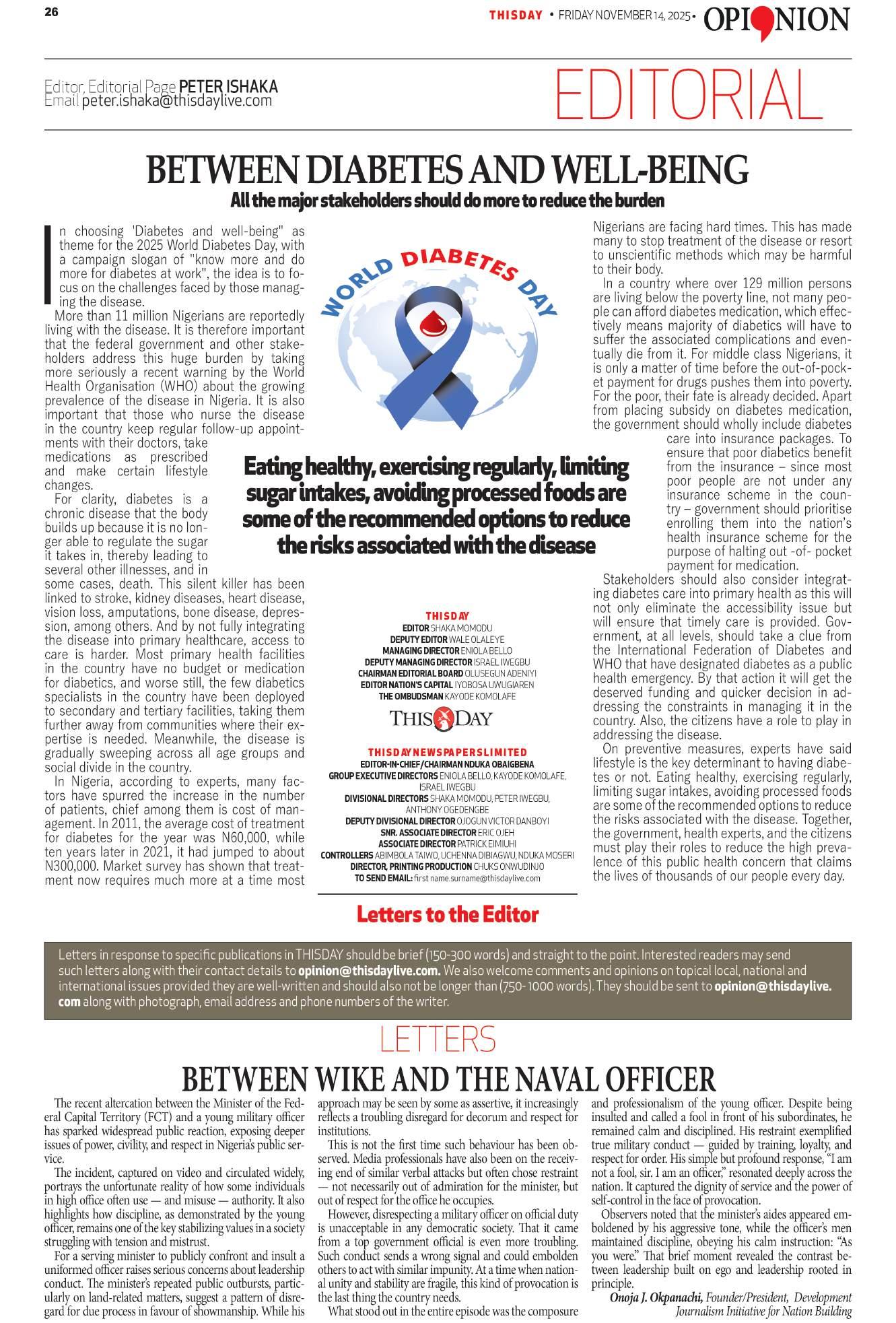

Emameh Gabriel writes that a landmark moot court competition held in abuja has drawn international acclaim, marking a significant advancement for Nigeria’s aviation sector and its integration into the global financing landscape.
The first ever Nigeria Cape Town Convention (CTC) Moot Court Competition has drawn widespread acclaim from the Aviation Working Group (AWG), the Federal Ministry of Aviation and Aerospace Development, and the Federal High Court in Abuja. Officials at the event’s grand finale described the competition as both enriching and remarkable.
The timing of the event underscores its strategic importance, coinciding with Nigeria’s remarkable ascent in global aviation compliance. The nation’s rating under the Cape Town Convention has jumped to 75.5 percent, demonstrating substantial progress toward meeting international aviation financing requirements.
The groundbreaking competition emerged from a partnership between the Cape Town Convention Academic Project (CTCAP), UNIDROIT, and the University of Cambridge. Its core mission: to immerse Nigeria’s future legal professionals in the intricacies of the international treaty that governs aviation commerce. Through realistic courtroom simulations built around detailed hypothetical cases, participants gained practical understanding of the convention’s complex provisions.
The initiative reflects the forward-looking vision of the Minister of Aviation and Aerospace Development, Mr. Festus Keyamo. His objective is to prepare the next generation of legal practitioners for the demands of international aviation law, focusing specifically on the Cape Town Convention - a treaty Nigeria has formally endorsed.
Keyamo brought personal credibility to the mission, having established his legal credentials decades earlier when he was recognised as the top advocate at the 1992 Teslim Olawole Moot Court Competition in International Law.
The Nigerian moot court fact pattern focused on cross border insolvency and was argued by the University of Benin (representing the Airline and Nigerian Guarantor) and the University of Lagos (representing the Lessor and the Bank).
In his remarks, the Secretary General of the Aviation Working Group, Jeffrey Wool, emphasised the value of the moot court in familiarising students with the treaty.
“We note that the court recently passed a Practice Directive on how to address Cape Town Convention cases. This is an opportunity in the educational setting to become familiar with the treaty and to give students firsthand experience working with judges, industry experts, and academics,” Wool said.
As a Co-Director of the Cape Town Academy Project, Wool also commended the students’ performance as “excellent,” adding, “I have had the honour of attending five other moot courts around the world—in Cambridge, Singapore, New York, Ireland, and Canada. The Nigerian students performed at a level comparable to top universities worldwide. They should be proud of themselves.”
Addressing attendees at the awards dinner, the Minister who was represented by the Director of Human Resources and Administration, Dr. Anastasia Gbem, positioned Nigeria’s event within a global context, noting that similar competitions have taken place in several leading nations including the United Kingdom, Canada, Singapore, Malaysia, Indonesia, and Ireland.
Minister of Aviation and Aerospace Development, Festus Keyamo, in his keynote address, welcomed dignitaries including the Chief Judge of the Federal High Court, Honourable Justices, the Secretary General of the Aviation Working Group, CEOs of aviation agencies, distinguished delegates, captains of industry, law faculty deans, student participants, and members of the press.
“It gives me immense pleasure to welcome you all to this epoch-making event of the International Cape Town Convention Moot Court Competition taking place here at the
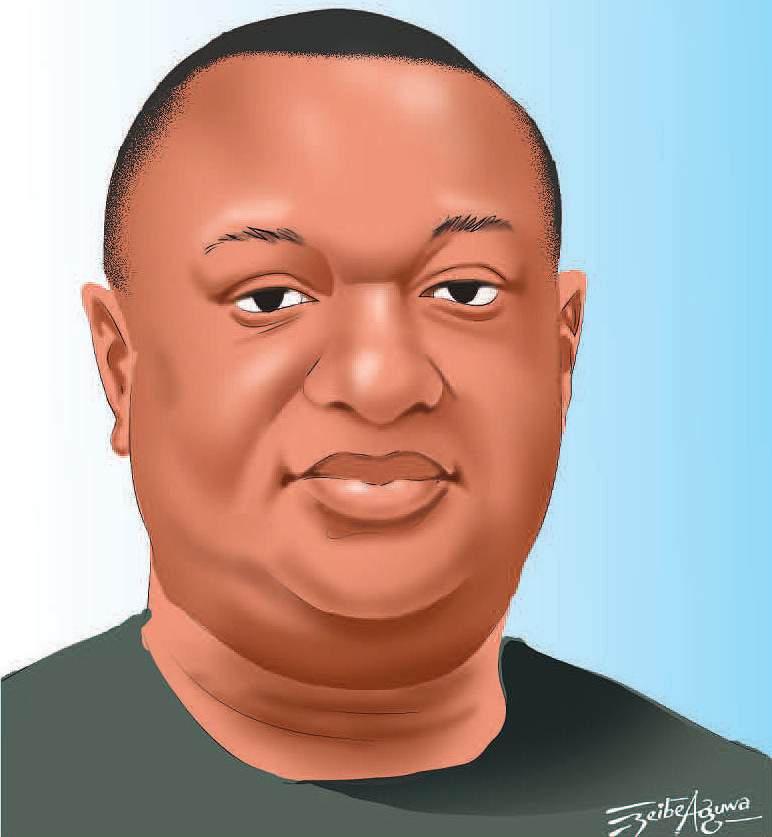
Federal High Court in the city of Abuja. This moot court marks one in the series of many that have taken place in other parts of the globe
in particular the United Kingdom, Canada, Singapore, Malaysia, Indonesia and Ireland”.
The Minister emphasised that Nigeria had
achieved a significant milestone as the first African country to successfully host the competition, which generated substantial interest from students and was keenly contested by 18 universities across Nigeria’s six geo-political zones.
He traced Nigeria’s journey with the Cape Town Convention, noting that it began with ratification and domestication more than two decades ago. “Since then, Nigeria has progressively taken steps to ensure compliance with her obligations under the convention”.
Highlighting President Bola Tinubu administration’s commitment to good governance, Keyamo detailed Nigeria’s “unparalleled commitment in promoting compliance and implementation of the Cape Town Convention with the adoption of the Federal High Court Practice Direction and the Irrevocable Deregistration and Export Request Authorization (IDERA).”
These measures, he noted, resulted in removing Nigeria from the AWG blacklist and raising Nigeria’s compliance rating from 49% to 75.5% in less than two years.
“This targeted regulatory enhancement has opened the gateway of business opportunities for our local airline operators who can now easily access the aircraft markets at more affordable cost and thereby well positioned to compete favourably at the global market and increase growth of the industry,” the Minister explained.
He revealed that the benefits are already materializing, citing “the dry lease of aircraft recently concluded successfully by one local operator which has not happened in past 10 years in the industry.”
-Gabriel writes from Abuja.
NOTE: Interested readers should continue in the online edition on www.thisdaylive.com
Kogi State recently inaugurated 80 revitalized primary health care facilities across the state, marking a significant milestone in the administration’s efforts to provide accessible, affordable, and quality healthcare to the citizenry in the Confluence state.
Governor Usman Ododo of Kogi State has praised President Bola Tinubu’s dedication to transforming Nigeria’s health sector, noting that the President’s visionary reforms have freed up more funds for states to invest in primary healthcare delivery.
The governor, who spoke in Lokoja while inaugurating 80 revitalized primary health care facilities spread across the state, also ac knowledged the contributions of development partners, including the Federal Ministry of Health and Social Welfare and the National Primary Health Care Development Agency (NPHCDA), which donated medical equip ment and commodities to the state.
“Today’s gathering symbolizes our vision of building a sustainable and people-centered healthcare system that serves every community across Kogi State,” Ododo said.
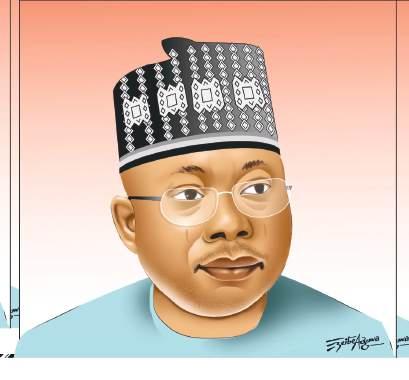
The revitalized facilities, upgraded under the World Bank IMPACT Project and NPHCDA, are expected to significantly improve service delivery at the grassroots level.
The governor also presented the State Leadership Challenge Awards to outstanding Local Government Areas and individuals, recognizing their dedication to healthcare delivery.
Ododo warned against vandalism and misuse of public assets, saying anyone caught sabotaging government efforts would face the full weight of the law.
He commended the Commissioner for
Health, Dr. Abdulazeez Adams Adeiza, and the Executive Director of the State Primary Health Care Development Agency, Dr. Muazu Musa Omeiza, for their outstanding work in redefining the future of healthcare in Kogi State.
The event was attended by dignitaries, partners, and stakeholders, who pledged to continue supporting the state’s healthcare development efforts.
Earlier in a welcome address, Executive Director of the Kogi State Primary Health Care Development Agency, Dr. Muazu Omeiza, highlighted the transformation of 80 PHC facilities from Level one to Level two status.
He explained that the upgrade means improved infrastructure, including two consulting rooms, uninterrupted power supply through solar energy, functional toilets, fenced compounds, staff quarters, and portable water supply.
“A Level two facility means improved infrastructure, two consulting rooms, uninterrupted power supply through solar energy, functional toilets, fenced compounds, staff quarters, and portable water supply,” Omeiza explained and noted that the upgrades will enable round-the-clock service delivery, especially for maternal and child health.
“By God’s grace, maternal, infant, and child mortality rates will be reduced to the barest minimum”.
He also emphasized the importance of community ownership and stakeholder engagement, calling on traditional institutions, religious leaders, and local communities to play active roles in sustaining the progress made.
Also speaking, Commissioner for Health, Dr. Abdulazeez Adams, hailed the collaboration between the state and development partners. According to him”These glaring evidences of performance cannot be hidden. What we see today is the product of visionary leadership, selfless service, and partnership between government and key health agencies”.
NOTE: Interested readers should continue in the online edition on www.thisdaylive.com
with Lanre Alfred …truth behind the headlines, conspiracies, cover-ups, trials and triumphs
There are women who command a room and there are women who become the room. Oyin Adeyemi, Executive Chairman and CEO of Still Earth Holdings and Tirex Petroleum, belongs to the latter. I have met enough titans of industry and aristocrats to know when I am in the presence of something rare.
With Oyin, it is not about the shimmer of her diamonds or the grace in her posture; it is about the still energy she exudes, that poised composure that makes noise irrelevant. She doesn’t compete with the room; she defines it.
I have followed her journey quietly, and almost reverently, as one follows the arc of a star that never burns out. She doesn’t court attention, yet the world turns to look. Oyin, unlike too many of her peers, does not proclaim genius through spectacle, she inhabits it and gives it life.
She has mastered the subtle art of modesty in acclaim, and that, I believe, is where her true power lies.
When I began conceiving the book, ‘Genius of Still Earth,’ I knew she would not merely feature in it, she would be it.
I write in the quiet, reflective voice that seems appropriate for a chronicler of lives lived large, and now lived richly in liturgical prose. In the unfolding ledger of my authorship I have sought to honour Nigerian figures whose trajectories leap beyond the ordinary, book after book. For example, with creative care I completed The Man Who Carried a City, a labour of love on Babajide Sanwo Olu, Governor of Lagos State, published in his 60th year.
Then, I wrote The Big Kahuna: Triumphs of Abdulsamad Rabiu at 65, a literary sculpture of the life of Abdulsamad Rabiu, whose industrial and philanthropic imprint demanded a form worthy of its subject.
And further back still, I turned my attention to the governance of Dapo Abiodun with the coffee-table volume Dapo Abiodun: The State House As His Pulpit, tracing his leadership of Ogun State.
Of all the books I have written, though, it is the latest—about Oyin Adeyemi—that stands out in my own mind as both breathtaking and a fantastic page-turner. I endeavoured to reflect the cadences of her journey, the tectonics of her ambitions, the intimate interstices of public and private self all woven into one luminous tome. It is a story told with the clamour of human stakes and the hush of spiritual longing. I say, quite simply, that the Oyin Adeyemi volume is one of the volumes in which I poured most of my heart. Written in about 300 pages, its glow will linger in the memory of the reader long after the physical leaves have been turned.
And, of course, she is deserving of such special publication; because, if there was a living metaphor for grace in form and brilliance in restraint, it is Oyin.
She represents everything I find compelling about modern African sophistication: deliberate, elegant, fiercely intelligent, and utterly unbothered by the noise of competition. Oyin doesn’t chase applause; she creates awe. Every space she designs, every object she curates, and every word she speaks feels measured, balanced, and purposeful. There’s an unmistakable discipline about her: that rare kind of intelligence that marries taste with intent.
To watch Oyin work is to see a kind of quiet rebellion unfold. She operates in a field long dominated by men who built reputations on concrete and bravado. Yet here she stands, effortlessly rewriting the rules, introducing poetry into architecture and meaning into modernism. She is proof that femininity, when armed with intellect, is not ornamental, it is game-changing.
I’ve walked through her spaces, and I use the word “walked” deliberately, because you don’t just enter an Oyin Adeyemi creation; you journey through it. Each room feels like a paragraph in a novel of light and geometry.
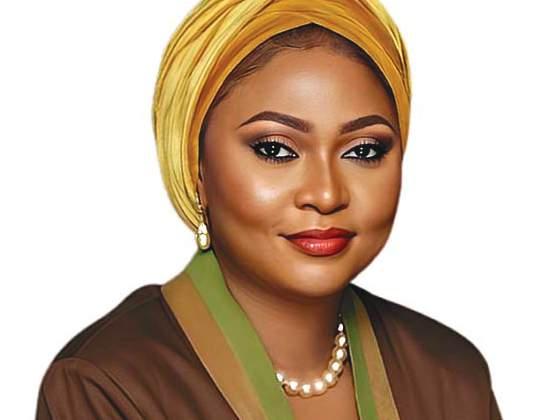
Every texture tells a story; every wall holds a conversation. There is rhythm, silence, and soul in her designs, as though she chants to the earth and the earth listens.
She reminds me of Zaha Hadid, yes, but with a distinctly African voice. There’s a warmth, a rootedness in her aesthetic creations that defies imitation. She fuses ancestral energy with global form; she translates tradition into timeless design. Where others see space, she sees spirit. That is herAndgenius. it isn’t just about buildings. It’s about philosophy. Oyin approaches life the way she approaches design, with proportion. In her presence, there’s no clutter, no chaos, no need for verbosity. Everything fits where it should. She wears her jewelry the way she wears her achievements, subtly, precisely, as punctuation, never as Beyondparagraphs. her adventure in construction, her recent foray into the oil industry has been quite instructive. There is something poetic about Oyin, and its characteristic of women who build; the ones who do not simply inherit the world as it is, but insist on drafting their own blueprints, brick by trembling brick, or in this case, rig by relentless rig. Oyin is one such woman.
When Tirex Petroleum & Energy began its ascent, it did so like a scholar cracking open an ancient text, gently, reverently, as if afraid to wake the gods that slumber beneath the sea. To Oyin, the ocean was never an adversary. It was a dialogue partner. And what a conversation it has been. Every platform she’s commissioned, every well Tirex has drilled, feels like a stanza in some secret poem between humankind and the elements.
Where others see pipes, she sees prayers. Where some see crude, she sees courage distilled into form. She speaks of pressure readings the way architects speak of light, as something that reveals character. I’ve heard men in hard hats call her “the quiet storm.” They mean it as praise, I think. Take the Saturn-1 well for Chevron Nigeria Limited, completed in April 2022, ninety days of sheer precision. Most people saw a contract closed and a timeline met. I saw a quiet revolution. For the first time, an indigenous firm matched the tempo of the multinationals, line for line, drill for drill. Engineers who once fetched coffee on offshore rigs now called the shots. It was, in many ways, Nigeria’s coming-of-age story, told not in boardrooms or press briefings but in saltwater and flame.
And that’s the thing about Oyin. She never performs her power. She practices it. Every project feels less like extraction and more like exorcism, a deliberate cleansing of the national psyche. She seems to be saying, “Look, we can do this competently, honestly, and beautifully.”
When Tirex undertook the Platform Installation and Six Wells Project for First E&P, in collaboration with Shelf Drilling, it wasn’t surpassed production, offering civics lesson in the form of quality engineering. Three hundred and fifteen days at sea, hundreds of Nigerian engineers, technicians, and local vendors working in rhythmic coordination. The kind that redeems a country’s name.
It’s easy to romanticize this woman, but I find her most impressive when she’s utterly practical. She talks about oil the way priests talk about sacraments; as something sacred that must be handled with clean hands. She insists that every well Tirex drills is an “altar of intention.” It’s the kind of phrase that could sound pretentious in another mouth, but from Oyin it sounds like principle.
And what’s fascinating is how her leadership turns industry into pedagogy. Under her, Tirex functions like a classroom disguised as a company. Local engineers get trained; host communities get infrastructure; small vendors find stability. The rigs become miniature societies at sea, humming to a rhythm of efficiency and quiet pride.
Now, I’m no stranger to Nigeria’s oil narrative: the plunder, the politics, the performative outrage. We’ve told the same story for sixty years: black gold, red greed, white papers. But Tirex rewrites the script. It reframes oil not as curse, but as catalyst. It’s not that Oyin denies the industry’s sins; she simply refuses to be complicit in them. In her world, every barrel of crude is also a barrel of evidence, that Nigerians can extract value without extracting their soul.
And perhaps that’s her most subversive act, running an oil company with a conscience. It shouldn’t sound radical, but it does. She’s that rare CEO who talks about inclusion without a PowerPoint deck, who measures success not just by production output but by the number of local contractors she’s elevated along the way.
In Port Harcourt, Warri, and Bonny, testimonies trail her projects like perfume. Vendors speak of contracts paid on time. Young engineers say her mentorship programs changed their lives. The cynics — and there are many — call it corporate theatre. But even theatre, when well-staged,
restores faith in the possible.
Her fiscal prudence is legendary. Tirex doesn’t chase the boom-and-bust hysteria of the sector. Oyin reinvests. She modernizes equipment. She pays her people well. In a country where executives treat company accounts like personal inheritance, that restraint is revolutionary. What intrigues me most, however, is not the success but the symbolism. Tirex has become a mirror in which Nigeria might glimpse the version of itself it claims to be: disciplined, ethical, and competent. Every time I watch one of those rigs flare against the horizon, I imagine her chanting a small prayer: Let the country catch up to its potential.
Of course, she would never say that out loud. Oyin isn’t the type to grandstand. She builds, she leads, she corrects quietly. She embodies that old-fashioned virtue that has gone out of style in our political and corporate culture, integrity that doesn’t need an audience.
Still, I find myself wondering: what happens when a woman like her begins to redefine an industry? When oil ceases to be a symbol of greed and becomes an emblem of grace? Nigeria has a way of breaking its best minds, but Oyin seems unbothered by that possibility. She moves through the noise with monk-like focus, as if to prove that the real revolution will not be televised; it will be engineered.
And so, each time I hear the hum of Tirex’s operations, I think not of profit margins or production quotas. I think of architecture. Of grace built in steel. Of a woman who decided that to build Nigeria, one must first believe it is still worth building. I find her commitment and subtlety refreshing in an era of overstatement. Oyin is the counterpoint to a culture addicted to noise. While others are busy announcing relevance on social media, she’s busy constructing legacies in silence. That’s why I call her the genius of still earth. Because stillness, in her case, is not inertia; it is command.
There’s something magnetic about women like her; women who have mastered the art of soft power. Nigeria doesn’t produce many of them, not because it can’t, but because our culture often mistakes loudness for leadership. Yet Oyin has proven that refinement is a force, that one can lead without shouting. She has turned elegance into authority.
Her projects are less about construction and more about curation. They feel like living essays written in concrete, steel, oil, and serenity. That, to me, is the essence of genius: the ability to empower, establish value and create continuity in a plethora of meanings. In every facet of her life, Oyin Adeyemi achieves that synthesis. She is, at once, artist and architect, curator and creator, thinker and doer. Her mind, like her spaces, is structured yet fluid. Her success, like her design, feels inevitable.
When I look at Oyin, I see a masterclass in modern womanhood. She is proof that one can be both fierce and feminine, commanding and compassionate. She doesn’t apologise for her taste or her talent. She has carved her niche in granite and integrity and that, in today’s world, is no small feat.
So yes, I will say it plainly: she deserves every pedestal she stands on. In industries that often measure genius by gender, she has made her gender less the conversation and her brilliance and femininity, the fine print of celebratory headlines.
Genius of Still Earth exists because Oyin Adeyemi exists. Tirex Petroleum thrives because Oyin thrives. She reminds us that creation can be contemplative, genius can be gentle, while enterprise can offer both power and peace. I chose to celebrate her not because she is successful, but because she is significant. Because she represents something rare and necessary; a vision of African excellence that is subtle, enduring, and profoundly intelligent. That, to me, is genius. The genius of still earth.
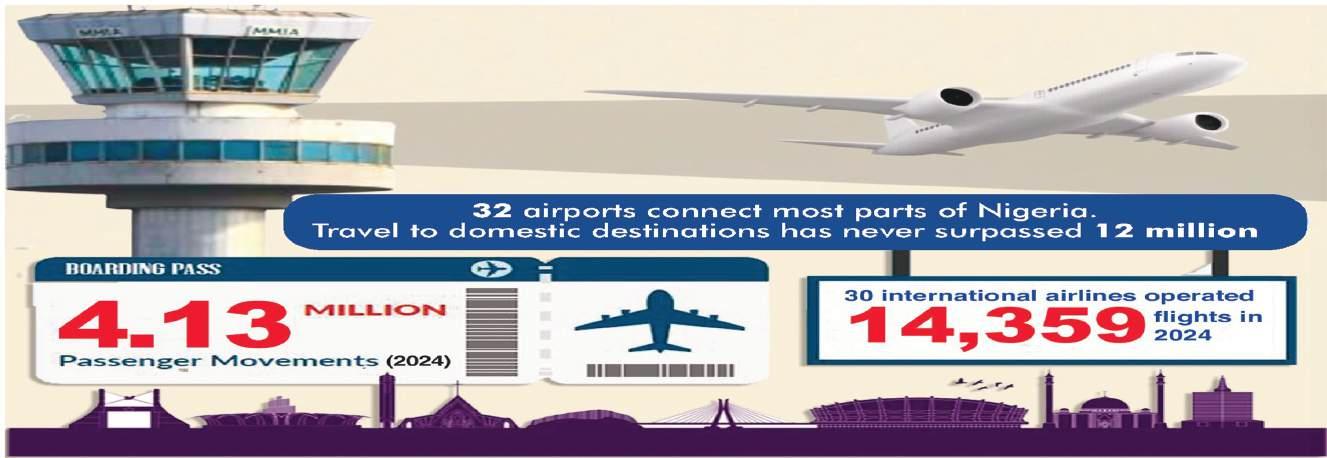
Airline operators have decried the huge levies paid on each ticket in domestic travel, which according to them, builds up the cost of airfares and serves as disincentive to air travel in Nigeria.
For more Nigerians to travel by air and for airlines to operate profitably and grow, they said taxes have
to be reviewed downwards by government, insisting that the major reason why less than one per cent of Nigerians travel by air is the high cost of ticket.
According to them, without the high number of passengers travelling by air, airline operation cannot be profitable.
The operators said that the high mortality rate of airlines in Nigeria
was due to high cost of operation, low passenger volume occasioned by high airfares, inhibiting airlines to record high passenger throughout the year.
With over 32 airports connecting most parts of Nigeria, the number of Nigerians that travel to domestic destinations has never surpassed 12 million. The highest recorded of air travel in Nigeria was
16 million in 2022, which includes domestic and international passenger movement.
According to the Chairman of United Nigeria Airlines and the spokesman of Airline Operators of Nigeria (AON), Professor Obiora Okonkwo, Nigerian airlines are being taxed to death.
“I am the spokesperson
of AON. I’m telling you that we are being taxed to death. It is too much to the extent that we cannot even breathe anymore. It is suffocating us. We are only urging them (government) to apply only the taxes charged to airlines in other progressive countries because airline business is global and follows the same standards,” Okonkwo said.
He gave kudos to the federal government for the tariff waiver on importation of aircraft and spares, but noted that to further help the airlines, government should facilitate a system whereby the airlines could access credit facility from banks at single digit interest rate.
Eromosele Abiodun
The Director General of the Nigerian Maritime Administration and Safety Agency (NIMASA), Dr. Dayo Mobereola has noted that effective Port State Control (PSC) is one of the most potent tools of ensuring global safety and maintenance of environmental standards in shipping.
Mobereola who said this at a 5-day Regional Train the Trainer Workshop
on Port State Control for Member States of the Abuja Memorandum of Understanding (MoU), with the support of the International Maritime Organisation (IMO), further emphasised that the quality of the professionals who implement PSC determines its overall success.
Represented by the Executive Director, Operations, Fatai Taiye Adeyemi, he described the workshop as a reflection of
Africa’s shared commitment to safer, cleaner, and more efficient shipping.
“Your presence here demonstrates our collective resolve to strengthen efficient maritime governance, improve safety standards, and enhance environmental protection across West and Central Africa,” he stated.
He commended the IMO, the Abuja MoU Secretariat, and all technical partners for
their continued support towards capacity-building, regional cooperation, and the promotion of maritime safety in Africa.
Delivering a goodwill message, the representative of the IMO, Captain Ahmed Sewelam, reaffirmed the organisation’s unwavering commitment to supporting member states through its technical cooperation programme to strengthen effective and harmonised port state control regimes
globally.
“Effective regional cooperation and harmonized PSC practices are essential to eliminate substandard shipping and promote consistency across the region,” Captain Sewelam said.
He explained that the workshop provides a unique platform for delegates to strengthen their collective capacity as Port States, while discussing key elements such as inspection
procedures, reporting, and strategies for improved performance noting that “together, we can strengthen Port State Control implementation and advance maritime safety and sustainability in the region”.
On his part, the Secretary General of the Abuja MoU, Captain Sunday Umoren, reiterated that capacity building remains a top priority of the Abuja MoU.
Stories by Chinedu Eze
Former Commissioner for Information in Plateau State, Yakubu Dati, has warned that if action was not taken to check unruly passengers in aviation sector, their behaviour may lead to safety breach at airports.
Dati made this known during his keynote address at the 2025 Federal Airports Authority of Nigeria Safety Week event held in Lagos. According to him, the
aviation industry has experienced significant increase in incidents involving unruly passengers over the past decade, which must be put under control.
The rise in unruly passenger behaviour, he said, posed serious challenges to operational efficiency and, at times, compromises aviation safety.
He said that effective conflict management
within the aviation sector requires the integration of negotiation, mediation, communication, and safety management systems.
Also speaking at the event, FAAN’s General Manager, Safety Services, Mba Ifeoma Lorrettor, said safety remained not just a policy and regulation in FAAN but a foremost value as it defines the authority’s culture, shapes operations, and sustains public trust across airports.

The Alternative Bank (‘AltBank’) has been honoured as the ‘Innovative Bank of the Year’ at the 7th African International Conference on Islamic Finance (AICIF), underscoring its commitment to transformative, inclusive financial solutions across the continent.

The award, presented in Lagos, celebrates the bank’s commitment to driving positive change through financial products and services grounded in non-interest principles.
“It reflects the trust our clients place in us and our shared vision of a more sustainable and inclusive future.”
“This award affirms what we’ve always believed, that innovation and integrity can coexist at the heart of banking,” said Korede Demola-Adeniyi, Executive Director (South) at The Alternative Bank.
Professor AbdulRazzaq Alaro, Chairman of the AICIF Award Panel, praised the transparency of the process, commending the awardees for their significant contributions to advancing interest-free financing for Africans.
Chief Executive Officer of ed-tech start-up, Dataleum, Mr. Bode Roberts, has been named winner of The Future Awards Africa Prize for Professional Services 2025.
The recognition was announced at a ceremony held in Lagos.
The award honours Roberts’ exceptional contributions to transforming professional education and skills development across Africa through innovative technology solutions.
As CEO of Dataleum, Roberts has pioneered accessible, data-driven learning platforms that are reshaping how professionals acquire and enhance their capabilities in the digital economy.
This year’s edition, themed: ‘Threads of Legacy’, celebrates young change
makers whose work today is shaping Africa’s tomorrow.
The Future Awards Africa, widely recognised as the continent’s most prestigious recognition platform for young achievers, continues its tradition of spotlighting individuals making meaningful impact across various sectors.
Group Business Editor
Eromosele Abiodun
Deputy Business Editor
chinedu Eze
Comms/e-Business Editor
Emma Okonji
Asst. Editor, Energy
Emmanuel Addeh
Asst. Editor, Money Market
Nume Ekeghe
Correspondents
Kayodetokede(CapitalMarkets)
James Emejo (Finance)
Ebere Nwoji (Insurance)
reporter Peter Uzoho (Energy)
The Chairman of the Board of the Federal Airports Authority of Nigeria (FAAN), Dr. Umar Abdullahi Ganduje, on Tuesday led members of the Federal Airports Authority of Nigeria (FAAN) Board of Directors on an extensive inspection tour of the Mallam Aminu Kano International Airport (MAKIA).
The delegation, which included the Managing Director/Chief Executive of FAAN, Mrs. Olubunmi Kuku, the Board Secretary and Director of Legal Services, Mrs. Bridget Gold, Nasiru Muazu and Dr. Ahmad Ibrahim Suleiman (Members of the FAAN board), embarked
on a comprehensive tour covering the airside, terminal, and landside areas of the airport.
Also on the entourage was the Director of Public Affairs and Consumer Protection, Mr. Henry Agbebire, who provided insights on communication and stakeholder engagement strategies aligned with FAAN’s transformation agenda.
The team inspected critical facilities, including the Fire Bay, Water Treatment Plant, and both the Domestic and International Terminals, as well as key airside infrastructure vital to airport safety and efficiency.
Chinedu Eze
Last week’s delivery of Boeing B777 to Air Peace by AerCap on dry lease arrangement marked the beginning of a new era for Nigerian carriers to expand capacity and become competitive in the global aviation sector.
The dry lease delivery was actualised after of a long struggle by the Minister of Aviation and Aerospace Development, Festus Keyamo, to remove Nigeria from lessors’ blacklist and return them to the aircraft dry lease market.
Although it was a tortuous journey, its positive result is soothing. The delivery of was celebrated because it was the first after more than 10 years struggle and thus reopened the opportunity for Nigerian airlines to acquire aircraft through dry leasing.
With the new possibility, airlines can provide more seats for the flying public, join the international mart and compete effectively. Also air fares will come down and the airlines will create more jobs for airport caterers and other service providers in the aviation industry and beyond.
To make the development possible, the federal government had to sign a guarantee before AerCap release its aircraft to Nigeria.
By signing guarantee for Air Peace, the federal government showed the confidence it has in its airlines. This is the first time a Nigerian government has done such for an airline. It also showed how committed the federal government in helping businesses in Nigeria thrive.
Industry insiders commend the minister for his altruistic commitment and it is worth noting that he succeeded a minister who was known to mock Nigerian carriers for their lack of capacity and who reeled out the debts owed by domestic airlines like the first verse of a daily sermon during press conferences. Such utterances were a total disincentive to investment in the aviation industry.
Through Keyamo’s push, Nigeria achieved its aircraft leasing practice direction, through the domestication of the Cape Town Convention, followed by the Federal High Court issuing a Practice Direction in 2024 to provide a clear legal framework for handling aircraft leasing disputes. The process was initiated by the government to address
the challenges Nigerian airlines faced in leasing aircraft, and the new rules are designed to boost investor confidence by creating a more predictable legal environment.
Keyamo also facilitated the signing of the updated IDERA (Irrevocable Deregistration and Export Request Authorisation) procedures alongside the Director-General of the Nigeria Civil Aviation Authority (NCAA). The signing was an administrative and procedural step to comply with the Cape Town Convention and to make it easier for Nigerian airlines to access dry-lease aircraft by building confidence for global financiers and lessors.
To appreciate what President Tinubu’s administration has achieved, there is need for a retrospect. There was a time Nigerian airlines were reneging on the dry lease terms they had with lessors. The two of such incidents that went viral in the media, involved two airlines that refused to release the aircraft they leased to the lessors. In order to insist on holding the aircraft, they went to court which ruled in their favour, thus putting the Nigeria Civil Aviation Authority (NCAA) in a quandary.
NCAA signed the Cape Town Convention on behalf of Nigeria in 2010. The Convention stipulates that lessors are free to take back their aircraft if airlines reneged on the terms of agreement and it is the responsibility of the regulatory authority to ensure that it happened; so, going to court was negating that regulatory provision. That was why it intervened belatedly in these two cases but by then, the lessors had unofficially blacklisted Nigerian carriers.
Peeved by the blacklist, former Managing Director of Virgin Nigeria Airways, Capt Dapo Olumide, in a paper he presented at that period said Nigerian airlines were notorious for defaulting on leasing agreements. He recalled that some airlines in the past used litigation to hold back leased aircraft and when the lessors came for them the court would rule against their taking them back. In fact, there were occasions leased aircraft were allowed to rot away in Nigeria because the lessee airlines refused to return them after they had defaulted in agreement.
the story continues online on www.thisdaylive.com
Olusola Adeoye
Global oil and gas industry players, including the Managing Director of TotalEnergies Nigeria, Mattieu Bouyer; Managing Director of ExxonMobil Nigeria, Jagir Baxi; the Commission Chief Executive (CCE) of the Nigerian Upstream Petroleum Regulatory Commission (NUPRC), Gbenga Komolafe, and and the Group Chief Executive Officer (GCEO) of Solewant Group, Mr. Solomon Ewanehi; were in the United Kingdom for the just-concluded NUPRC’s Roadshow held in Dorchester, London.
Other industry leaders who showed strong presence at the event include: Chief Executive Officer (CEO) of Seplat, Mr. Roger Brown; Chairman of AA Holdings, Austin Avuru; Chairman of Governing Board of the Organisation of Petroleum Exporting Countries (OPEC), Mr. Ademola Adeyemi-Bero, and federal lawmakers.
At the event, the GCEO of Solewant Group, Ewanehi listed transparency, innovation, collaboration, and emerging technologies as key drivers necessary for the growth of Africa’s energy sector.
Tagged: “Project 1MMBOPD’ Additional Production Investment Forum”, the two-day event was aimed at accelerating Nigeria’s goal of producing an additional 1 million barrels of crude oil per day (bpd) through innovation and collaboration.
According to NUPRC, the project aimed at achieving additional 1 million barrels per day will open a multi-year window for drilling, logistics and technology services.
NUPRC listed other gains to include: early project visibility- understanding capital expenditure (capex), direct access to decision makers, compliance pathways and partnership models for local content, direct feedback from the regulators, IOCs and asset financiers, as well as consortia formation - partnering with complementary firms for integrated service offerings.
Sharing insights on the roadshow in an interview on ARISE News Channel, Ewanehi identified key highlights to include: New upstream investment opportunities; ESG-driven, local content–focused projects, and $7 billion co-investment opportunities in Nigeria’s oil and gas sector.
Ewanehi noted that the engagement was informative, educative, and inspiring, reflecting Solewant Group’s continuous drive to promote innovation, transparency, collaboration, and growth in Africa’s energy sector.
“The energy in the room was very massive and energy experts were talking about how to deepen our operations. “All that we were talking about was how to increase our crude oil production by one million barrels per day. “Currently, you are aware that we are now at the threshold of 1.7 and 1.8 million barrels per day,” Ewanehi explained.
Speaking about transparency, he said there was a strong commitment of the industry leaders to transparency.
“We need to be transparent in what we are doing. Investors across the globe were there at Dorchester in London. We had discussed this issue of transparency.
“We need to be transparent. Data is key – of course you know that data is key to our energy business. The second thing we were looking at during the roadshow was the momentum. If you look at how events have been unfolding, this is the third of its kind here in London. And we had similar road shows in the
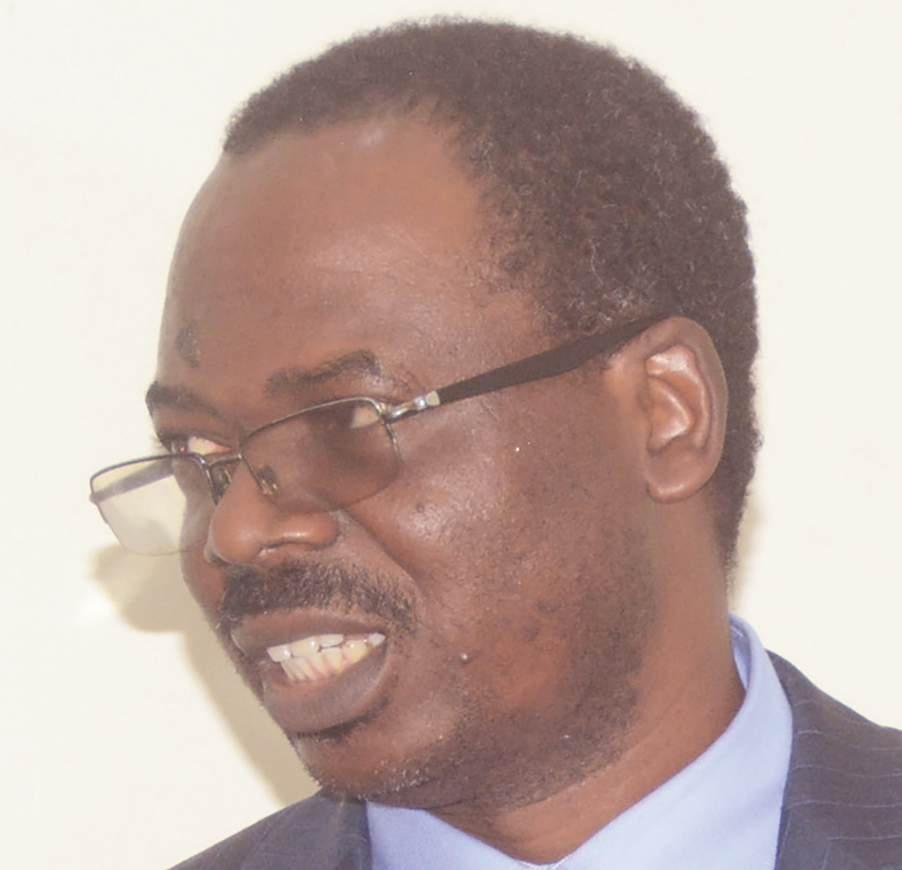
United States and in Nigeria. And we have the information from the CCE of NUPRC, that the President of Nigeria has given the approval for more of the assets to be offered in a licensing round in December,” Ewanehi added.
The GCEO of Solewant Group also disclosed that international investors at the event sought and were given assurances by the federal lawmakers and regulators on availability of robust legal framework to give investors comfort and protect their investments.
“We were looking at the regulatory framework– we had to look at the framework. With the strong regulatory framework, investors will be interested in coming into the industry,” he added.
Earlier at the roadshow, the CCE of NUPRC, Komolafe had announced the commencement of the 2025 licensing round from December 1, 2025.
Komolafe said the announcement was in line with the Petroleum Industry Act (PIA) following the approval of President Tinubu who doubles as the Minister of Petroleum Resources in Nigeria.
He said: “We are announcing that we are ready, following the approval of the Minister of Petroleum Resources in line with the Petroleum Industry Act, to commence the 2025 licensing round beginning from December 1, 2025.”
The NUPRC chief said funding remained the biggest challenge in Nigeria’s upstream sector, adding that the commission as a business enabler, planned to tackle this by connecting interested parties.
He therefore stated that the event was put together to connect all stakeholders in order to make the additional one million barrels a reality.
“One of the factors that affected business is that activities were happening in silos but the NUPRC now realises the need to bring everyone together. We want you all to network. Bank of America is here as well as representatives of other banks,” he said.
remains critical to Tinubu’s plan to transform Nigeria to a $1 trillion economy, and called on investors to key into the opportunity provided by the Project 1 million Barrels Per Day Forum.
Meanwhile, in demonstration of its commitment to technological innovations in the African oil and gas industry, Solewant Group will focus on transformative technologies such as Artificial Intelligence (AI), robotics, automation, data analytics, and other digital innovations in this year’s annual energy summit, convened by Solewant Energy Training Institute (SETI).
Solewant Group has not only sustained leadership in pipeline coating, fabrication, and asset integrity management across Nigeria- it continues to pioneer new frontiers in industrial and energy infrastructure development.
Its industrial park at Alode-Onne now includes one of Africa’s most advanced multi-layer pipe coating plants, a dedicated pipe bend multi-layer coating plant (commissioned in mid-2025) developed in partnership with Euro-American OEMs, and full steel pipe milling capabilities.
Komolafe said the reforms initiated by the Tinubu-led administration had improved Nigeria’s economic metrics. He said crude oil production now averages 1.71 million barrels per day with a peak daily output of 1.83 million bpd, evidence of tangible progress.
The CCE said 46 Field Development Plans (FDPs) had been approved from January 2025 till date, representing immediate investment commitments and production growth potential, noting that the rig count had grown to over 60 out of which at least 40 are active. He therefore stated that this was the best time for existing investors to deepen their stake in Nigeria.
He added: “The drive to reach and sustain 1 million barrels per day in incremental capacity and beyond will require Floating Production, Storage and Offloading (FPSO) units for cluster developments; Floating Storage and Offloading (FSO) vessels for crude evacuation and storage; and a variety of Modular Offshore Production Units and Early Production Facilities to enable early production and accelerated monetisation. All these need investments and the prospects are here in Nigeria.”
Also speaking, the Chairman of the House of Representatives’ Committee on Petroleum Resources (Upstream), Alhassan Doguwa, promised investors that his committee would not push any legislation that would undermine investments, adding that the PIA of 2021 would not be tampered with arbitrarily.
“The House of Representatives reaffirms its commitment to the PIA and will resist any arbitrary changes that will undermine investments,” he said.
Similarly, his counterpart in the Senate, Senator Eteng Williams, also restated the commitment of Nigeria’s legislature to business-friendly laws and urged investors not to fret.
In his remarks, the Chairman of Governing Board, OPEC, AdeyemiBero, said the petroleum industry
The annual summit attracts policymakers, energy executives, DFIs, development partners, and researchers from across Africa and the rest of the world, who brainstorm on strategies for building a sustainable and technologically advanced energy future for Africa continent.
This year’s summit, the 9th in the series, is scheduled to take place from November 27–28, 2025, at the Solewant Industrial Park, Alode-Onne, Port Harcourt, Rivers State. Nigeria from 9:00 am to 5:00 pm daily.
Themed “Emerging Technologies and the Future of Sustainable Energy Development in Africa,” the 2025 summit seeks to spotlight how transformative technologies such as Artificial Intelligence (AI), robotics, automation, data analytics, and other digital innovations are redefining the frontiers of Africa’s energy transition.
Key highlights of the summit include: Key paper presentations from industry leaders and government representatives; strategic panel discussions on technology and energy integration; technical presentations and emerging research and keynote messages from NNPC, IOCs, and EPC companies.
Other key highlights include: exhibitions of intelligent energy solutions; case studies from Across Africa and beyond; capacitybuilding workshops and networking opportunities.
The summit will facilitate new partnerships and funding pledges between governments, investors, and private sector players- unlocking capital for energy infrastructure, manufacturing, renewable projects, and technology-driven ventures across Africa.
There will also be a launch of the “Africa Energy Innovation Network (AEIN)”
The summit will also strengthen Local Content and Capacity Development Frameworks.
Through policy dialogues and technical sessions, the summit will produce actionable recommendations to deepen local participation, enhance industrial skills, and strengthen indigenous technology deployment in the oil, gas, and renewable sectors.
Outstanding organisations and individuals contributing to Africa’s industrial and energy advancement will be celebrated, inspiring excellence, innovation, and leadership across the sector.
• Adeoye writes from Lagos
Peter Uzoho posits that indigenous operator, Petralon 54 Limited, is drawing industry attention for how it is using the PIA’s trust structure not merely as a compliance requirement, but as an extension of its corporate identity
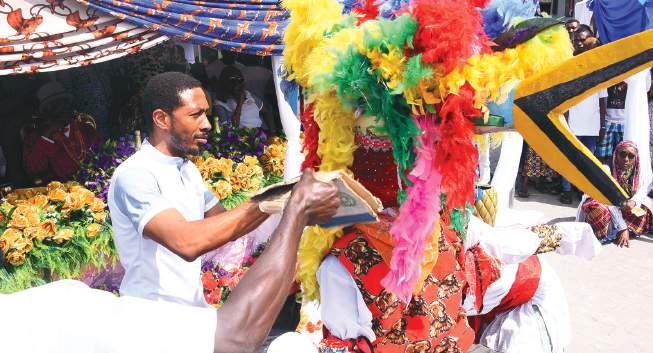
Nigeria’s oil heartland has long wrestled with a paradox: beneath the swamps and creeks of the Niger Delta lie some of the world’s most prolific hydrocarbon reserves, yet the communities living on top of the oil see little of the wealth extracted from their land. In a region where oil spills, gas flaring and decades of mistrust have entrenched suspicion toward industry players, the simple act of winning community consent can make or break an oil project. That reality is one reason the Nigerian government embedded a new legal structure into its sweeping petroleum reform law, the Petroleum Industry Act (PIA) of 2021. Under the legislation, companies operating upstream assets are required to set aside 3 per cent of their operating expenditure annually in dedicated Host Community Development Trusts. These trusts are designed to be run by community-appointed boards, with transparent governance and financial planning, marking the country’s most ambitious attempt yet to link oil production to local development. Against that evolving backdrop, a relatively small but increasingly visible indigenous operator, Petralon 54 Limited, is drawing industry attention for how it is using the PIA’s trust structure not merely as a compliance requirement, but as an extension of its corporate identity. Just four days after its first oil from the Dawes Island Field, Petralon 54 inaugurated two host community trusts, the Ogoloma Host Community Development Trust (HCDT) and the Koniama HCDT, deepening an 11-year engagement with the Ogoloma, Okochiri and Koniama communities of Okrika Local Government Area in Rivers State. The timing was symbolic. Production start-up is the moment when most operators focus inward on engineering, logistics and oil flow. Petralon instead widened its aperture to governance and partnership, projecting a message that commercial performance and social license are inseparable.
The Dawes Island Field was discovered by Chevron 46 years ago, but like many marginal discoveries in the Niger Delta, it never progressed to development. Bureaucratic bottlenecks, uncertain economics and community relations challenges kept the site idle. Today it is producing under the operatorship of Petralon 54, which took over the asset three years ago and rehabilitated infrastructure, including the dormant DI-2 well, until it flowed crude again in June 2025. The revival of a long-abandoned field would normally be the story. Instead, Petralon 54 shifted the spotlight to its host communities. At Ogeyi’s Place Hotel in Port Harcourt, where the inauguration ceremonies were held over two days, senior
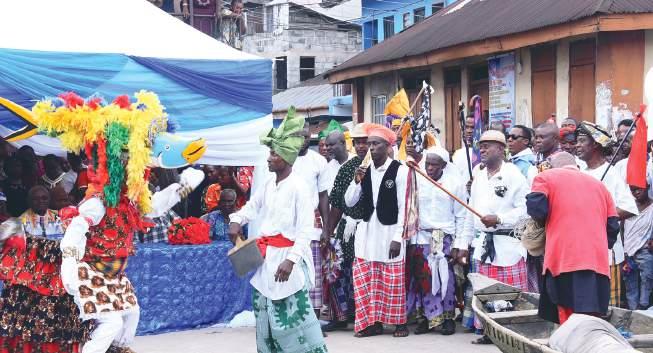
officials from NUPRC, the Rivers State Ministry of Local Government and Chieftaincy Affairs, traditional rulers, community leaders and stakeholders gathered around a concept that has often eluded the Niger Delta: shared ownership of development outcomes. Petralon 54’s Executive Director, Udiakobong Equere, cast the event as a turning point, telling attendees that the establishment of the trusts “represents a bold and commendable shift in how community development is approached in the Nigerian oil and gas sector.” “It institutionalises a model where host communities, settlers and regulators collaborate transparently to define priorities and allocate resources,” he said.
The PIA mandates operators, referred to as “settlors”, to fund and support the trust structure, but community representatives hold the steering wheel. That shift in control is a departure from traditional corporate social responsibility (CSR) programmes that companies typically define and execute themselves. For Ahonsi Unuigbe, Petralon 54’s founder and chief executive officer, the trust inauguration was more than regulatory compliance. It was the realisation of an ethos. “We wrote it down 11 years ago when I founded the business,” Unuigbe said. “Sustainable partnerships are a core principle. CSR is not a box-ticking activity, it’s how we operate.”
Petralon 54 is not a major producer, at least not yet. It holds a 6.06% stake in Prime Oil & Gas Coöperatief U.A., which in turn owns positions in three of Nigeria’s most prolific deepwater fields, Agbami, Akpo, and Egina, operated by multinationals Chevron and TotalEnergies.
Through that stake, Petralon 54’s net production stands at 3,300 barrels of oil equivalent per day. The Dawes Island field, however, is its first operated asset.
Originally discovered by Chevron 46 years ago, Dawes Island had never been brought into meaningful production. Petralon 54 assumed operatorship in 2022, inherited rusted infrastructure, battled regulatory setbacks, and frequently negotiated with host communities in Okrika Local Government Area, Ogoloma, Koniju, and Okochiri.
By inaugurating the Host Community Development Trusts (HCDTs) now, Petralon 54 is betting on the proposition embedded in the PIA, that stable returns for investors require shared prosperity for communities.
“In the Niger Delta, development had too often been transactional,” said Oyeyemi Oke, Petralon 54’s company secretary, during a legal briefing at the inauguration.
“PIA institutionalises something different,
governance, transparency, measurable impact. It transforms communities from negotiators into stakeholders.”
Historically, oil companies in Nigeria relied on volatility management, paying off aggrieved groups, responding to grievances only when production was threatened, or negotiating memoranda of understanding that dissolved under political strain. The result was an environment where both investment and development were episodic. Petralon 54’s approach attempts to make the economics predictable for everyone. Under the new trusts, Ogoloma and Koniama communities elect trustees, who then appoint a management committee, which in turn selects project advisors and fund managers. All expenses and withdrawals are audited and disclosed to the community and the Nigerian Upstream Petroleum Regulatory Commission (NUPRC).
The commission’s Chief Executive, Gbenga Komolafe, represented at the event by Deputy Director Ogechi Opete , highlighted the change: “This is a structural shift from ad-hoc promises to enforceable community governance.”
According to NUPRC data cited at the ceremony, 207 applications have been received nationwide for trust incorporation, with 154 receiving regulatory approval and 136 fully registered with Nigeria’s Corporate Affairs Commission. As of October, the cumulative balance of Host Community Trust funds across the country had reached N373 billion (approximately US$244 million), supporting more than 500 development projects. For regulators, the framework is meant to link community benefits not to political influence or activism, but to oil production itself. The PIA also contains a penalty clause: any vandalism or interference by community members automatically triggers a deduction from the trust’s allocated development funds. “If pipelines are sabotaged, the trust loses money, not the company,” Opete told attendees.
At the Ogoloma ceremony, trustees filed to the front of the ballroom. Some were traditional chiefs, others engineers or public administrators. Dr. Taimunopekerebia Ama Miebaka (JP), an educator and long-time community influencer, was sworn in as chairman of the Ogoloma Host Community Development Trust. The Koniama Trust inauguration the next day installed Chief Dr. Chris Biriowu as chairman. Their mandate places them
at the center of a governance experiment: communities must transition from protest politics to administrative accountability. “We urge you to view this as a call to duty,” said Patrick Ndukwe, permanent secretary at Rivers State’s Ministry of Chieftaincy and Community Affairs. “Your people expect fairness, integrity, and results.” In what felt more like a shareholder briefing than a traditional inauguration, NUPRC’s Engr. Olatokunbo Karimu spent part of his address walking trustees through the operational mechanics, four mandatory bank accounts (collections, project, administrative, reserve) and the separation of powers between trustees, management committees, and fund managers. “Do not usurp roles,” he warned. “Board of Trustees approves. Management Committees execute.” For residents of Ogoloma and Koniama, areas scarred by decades of industrial neglect, the bureaucratic language carried an unfamiliar but welcome tone: permanence.
The ceremony was not purely administrative. Petralon 54 executives left the hotel ballroom to travel to the renovated palace of the Amanyanabo of the Ancient Ogoloma Kingdom, King Emmanuel Tamunoigbeindebia Ibiagolika Obudibo, where the company had recently funded restoration work as part of its social investment commitments. Unuigbe nodded to the symbolism. Standing before the monarch’s restored palace, he described the renovation as “a token of respect for the institutions that held these communities together long before any oil field existed.” Petralon 54’s social initiatives began before revenues ever flowed. Its “Future Leaders Programme” sponsors university education for students from oil-producing communities, ensuring that development extends beyond infrastructure into human capital. A year and a half ago, 10 students began receiving full sponsorship, before the Dawes Island field generated a naira of revenue. “It sends a message that promises are not contingent on profit,” said Dr. Kenneth Uzor, the company’s CSR and community relations manager.
The Niger Delta’s history casts long shadows. Shutdowns, sabotage, piracy, militant agitation, operators have watched billions of dollars of infrastructure destroyed by unrest. Some multinationals, including Shell, are trying to divest from onshore assets entirely. Against that backdrop, Petralon 54 presents itself as an example of what local ownership, smaller company agility, and steady community diplomacy can achieve.
The story continues online on
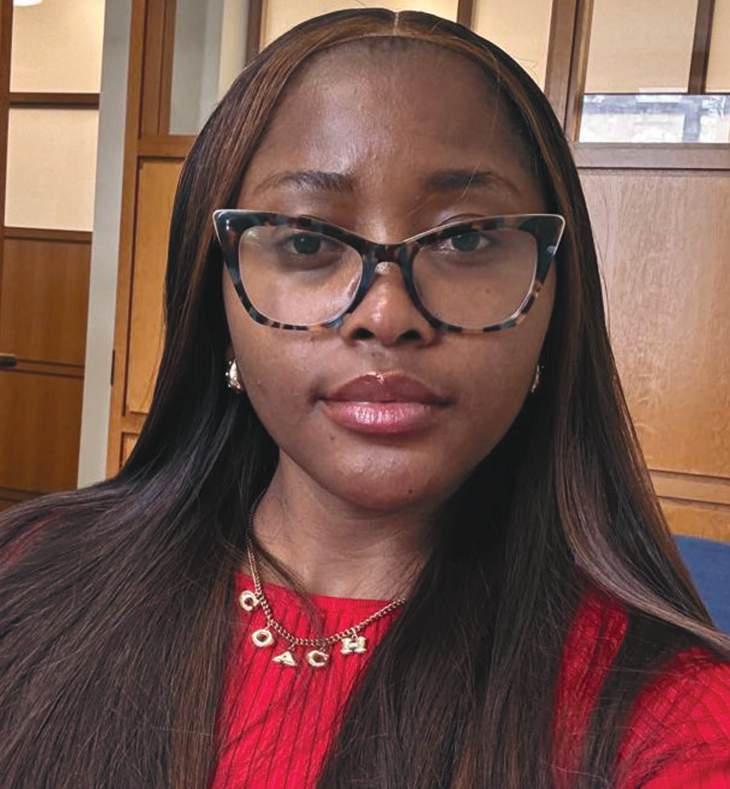
In a world where words shape narratives and inspire change, Mary Ijeoma Nriagu stands out for her intellect and creativity. a scholar, activist, and mentor, she is redefining literature through groundbreaking research and innovative storytelling. From exploring the link between epigenetics and literature to empowering young writers, Nriagu’s work highlights the transformative power of language. Her research bridges science, history, and art— showing how stories illuminate identity and culture.Recently, she was invited by Fordham University’s Graduate School of arts and Sciences to present her research, “Through the Lens of History: Exploring Race, Identity, and Power in Photography,” at its Inaugural Research day on april 16, 2024—a testament to her growing academic influence. In this interview with MArY NNAH, she reflects on the future of african women’s voices, the impact of digital activism, and the importance of mentorship in nurturing the next generation of writers and thinkers
How has your academic journey across Nigeria and the U.S. influenced your approach to scholarship and global education?
My academic journey began in Nigeria at Adekunle Ajasin University, where I earned a Bachelor of Arts degree. I then pursued a postgraduate diploma in Education at the esteemed Nnamdi Azikiwe University, followed by a master’s degree in literature from the University of Ibadan, which I completed in early 2025. Interestingly, I commenced my Ph.D. in English at Fordham University in 2022 with only my B.A., and I am currently specializing in African American Literature within the broader field of Twentieth-Century American Literature. This journey has been profoundly transformative. It has enabled me to engage with diverse intellectual traditions while remaining deeply rooted in African epistemologies. This dual lens not only enriches my scholarship and pedagogy but also empowers me to mentor globally and advocate for inclusive narratives in literature and education.
What sparked your interest in exploring the lives of Black and African women through your research, and what significance does this work hold in today’s context?
My interest in the lived experiences of Black and African women stems from the richness and complexity of their stories, which often embody the weight of history, silence, and resilience. As a long-time enthusiast of women’s writing, I began exploring these themes through my contributions to Edith Edition Magazine in Nigeria, where I wrote about domestic violence, gender dynamics, and the strength of womanhood. This passion was further fueled by my undergraduate thesis on Chimamanda Ngozi Adichie’s Americanah, which examined the intersections of class, race, and gender in the lives of Black individuals in the diaspora. Today, these narratives remain crucial for understanding the interplay between gender, race, and environment in shaping identity and memory, particularly in postcolonial and diasporic contexts.
Can you elaborate on the ‘fourth generation’ of Nigerian women writers you’ve mentioned, and what distinct characteristics define this group compared to earlier literary movements?
The ‘fourth generation’ of Nigerian women writers are digital natives who seamlessly blend activism, aesthetics, and global consciousness. Unlike earlier literary movements, they engage with contemporary themes such as
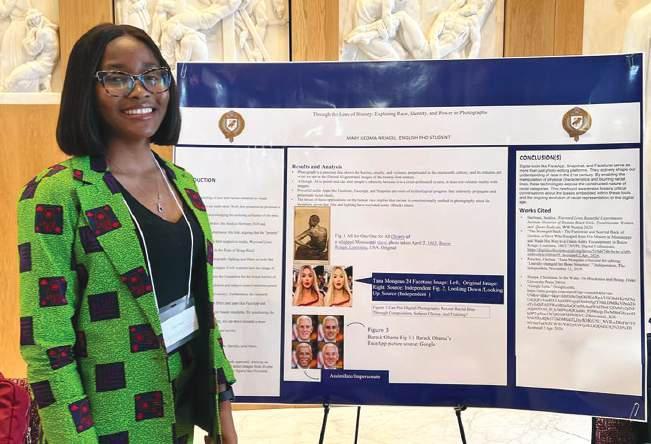
mental health, migration, and queer identity, often leveraging social media and hybrid genres to reach diverse audiences. I identify with this generation, as my writing frequently utilizes digital platforms like LinkedIn and Facebook to amplify the voices and experiences of women, both of our time and those who will come after us. Through these platforms, I strive to cultivate global awareness around gendered struggles and to foster a transnational dialogue on resilience, justice, and representation.
Epigenetics is a powerful framework in your work. How do you connect scientific concepts like trauma inheritance to literary expression in African women’s writing?
My research leverages epigenetics to understand intergenerational trauma transmission, focusing on African American women’s literature, particularly Toni Morrison’s The Bluest Eye. I investigate how trauma is inherited within Black communities in the U.S., exploring the interplay between environment, genetics, and psychological development. Building on Clare Hansen’s work in Literary Imagination, I argue that parental care and environmental stability are crucial for healthy development. When either is lacking, biological disruptions can occur, encoding trauma into future generations. Literature serves as a powerful tool for expressing this phenomenon, using metaphors of the body and environment to convey pain and resistance. By examining these narratives, we can unlock the potential for
healing, historical reckoning, and epistemic recovery
How do you see social media and technology reshaping literature, particularly for African and Black women writers?
Social media has profoundly democratized storytelling, enabling African and Black women writers to bypass traditional gatekeepers and cultivate vibrant communities of readers and thinkers across continents. Platforms such as Instagram, Facebook, LinkedIn, and Twitter have evolved beyond mere promotional tools; they now serve as dynamic spaces for literary innovation, cultural dialogue, and activism. In today’s digital age, it is difficult to fully engage with twenty-first-century literature without acknowledging the pervasive influence of social media. These platforms have become powerful conduits for literary dissemination, with their global reach and interactive metrics contributing to what I describe as the “global tottering of literature”, a transformative shift in how narratives are created, circulated, and consumed across borders.
What recurring themes do you notice in contemporary African women’s literature, particularly in relation to race, gender, and identity?
Recurring themes in contemporary African women’s literature include intergenerational trauma, migration, environmental degradation, and spiritual reclamation. Writers such as Chimamanda Ngozi Adichie, Sefi Atta, Lola Shoneyin, and the late Buchi Emecheta have powerfully
explored these motifs in their work. Notably, fourth-generation Nigerian women writers are expanding this thematic landscape by examining how urban life shapes female identity and agency. This is particularly evident in the recent works of Cheluchi Onyemelukwe-Onubia and Abi Daré, who foreground the complexities of city living in their portrayals of women’s experiences. These writers are not merely chronicling lived realities; they are actively reimagining futures in which African women occupy central roles in global conversations on justice, ecology, and identity.
With a track record of guiding over 300 students through fellowships and scholarships, what drives your passion for mentorship, and how do you assess the impact of your work?
With a mentorship career spanning over 500 individuals through webinars, workshops, and one-on-one conversations at Fordham University, I’ve come to understand mentorship as a deeply personal endeavor. Having navigated complex academic systems myself, including securing over $450,000 in scholarships for my PhD, I’m committed to paving the way for others. For me, impact isn’t just about numbers – it’s about the stories of students who’ve achieved success, whether through winning fellowships, publishing their work, or paying it forward as mentors. That ripple effect is my greatest reward.
Your online platforms have reached over 10 million people. How do you use social media to foster academic opportunities and critical dialogue? I use social media as a bridge between academia and everyday life. Through MineduCafe, I share resources, host live sessions, and spotlight opportunities especially for students in underserved regions. My goal is to foster access and spark critical conversations that matter. Beyond this, I view social media as a dynamic marketplace, where users engage with a diverse array of ideas and opportunities. Algorithms curate our timelines based on our interests and interactions, making it essential for users to be intentional about how they engage with these platforms. I encourage everyone to use social media to their advantage. I’ve received countless messages from individuals who have applied the insights I share and gone on to win scholarships and academic opportunities. This, to me, is the true measure of digital impact when knowledge shared online translates into real-world transformation.
When Tolagbe Martins, Founder of The TM Grammar Ministry and convener of The Language of Retail, convened over 30 of Nigeria’s most dynamic retail and service operators at GAIA Africa, Lagos, on Friday, November 7, 2025, for The Operators’ Roundtable, it was a well thought-out, high-level, invitation-only working session aimed at co-creating practical frameworks to drive excellence across Nigeria’s retail economy.
The session brought together chief executives, founders, and senior managers from the fashion, beauty, hospitality, food, and distribution sectors. The goal: to tackle real operational challenges and design actionable solutions that can strengthen Nigeria’s retail landscape.
Unlike traditional conferences, The Operators’ Roundtable was structured as a design sprint, part fireside conversation, part collaborative laboratory, focused on translating frontline operator insights into frameworks that can inform both business practice and policy engagement.
“The people building and operating Nigeria’s most successful businesses often have the deepest insights but the least time to share them. This Roundtable was about creating space to listen to those voices, connect what’s working across sectors, and document lessons that can strengthen both enterprise performance and employment systems,” Martins said.
One of the event’s highlights was a candid fireside conversation with Wonuola Okoye, Chief Operating Officer of Persianas Retail Limited and Managing Director of Ashluxe Fashion and Beauty Limited.
The discussion explored the evolving realities of operating within Nigeria’s retail ecosystem, from navigating policy
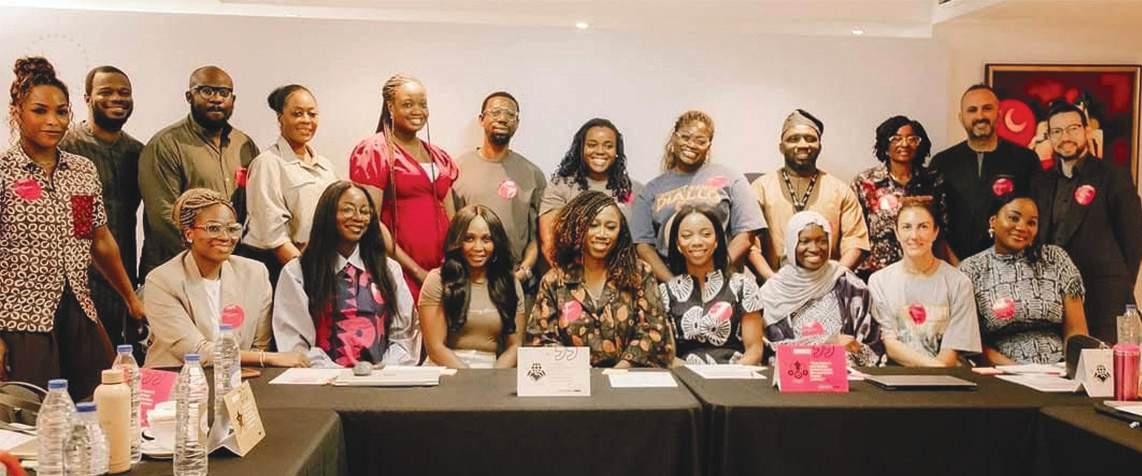
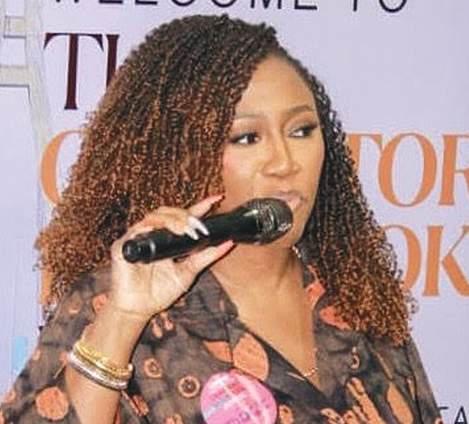
environments to building strong service cultures and developing sustainable business models.
The working sessions, facilitated by Ndali Orepitan, Head of Learning Experience Design at Talstack, guided participants
through structured breakout discussions. Through these sessions, operators mapped shared challenges and co-created solutions around four strategic pillars: Talent Development, Service Culture, Operational Excellence, and Policy & Partnerships.
Insights from the Roundtable will be consolidated into The Operators’ Playbook, a practical, community-built resource that captures tested strategies for sustainable growth within Nigeria’s complex operating environment. The Playbook is envisioned as both a reference tool and a blueprint for businesses seeking to balance profitability with purpose and long-term resilience.
The initiative was supported by ecosystem partners including the Lagos State Employment Trust Fund (LSETF), GIZ, and
Uzoma Mba
At the Civic Centre in Lagos, the lights dimmed and music swelled as a palpable sense of pride filled the room. It was not just another awards night, it was a celebration of a new kind of wealth in Nigeria, one measured not only in profits but in purpose.
The Impact Investors Foundation (IIF) hosted the grand finale of its 8th Annual Convening on Impact Investing (ACII) with a glittering awards dinner honouring individuals and organisations transforming communities and businesses through purposeful investment.
For the IIF, the event went beyond celebration, it was a statement of intent. The foundation’s mission has always been clear: to prove that capital can drive positive change while generating financial returns.
In her opening remarks, IIF’s Chief Executive
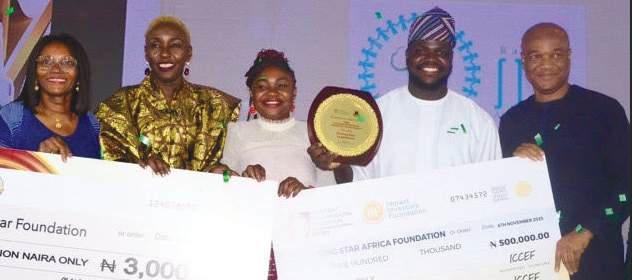
to make capital work for both profit and purpose.
other private sector stakeholders committed to strengthening Nigeria’s talent-driven retail economy.
According to organisers, The Operators’ Roundtable marks a major milestone in The Language of Retail’s mission to codify and share the frameworks that drive service excellence and enterprise development. Since its launch in 2023, the platform has trained more than 500 frontline staff and cultivated a growing community of practitioners across fashion, food, lifestyle, fitness, and hospitality sectors.
Looking ahead, Martins said The Language of Retail will expand to Kano and Abuja in 2026, before returning to Lagos for its fourth edition in the last quarter of the year.
With initiatives like The Operators’ Roundtable, Nigeria’s retail ecosystem is increasingly defined by collaboration, innovation, and the shared ambition to build businesses that are not only profitable, but purpose-driven and sustainable.
Dr Sir Raphael Nwachukwu Arinze will will be laid to mothet-earth at his country home come November 28, 2025.
This was disclosed in statement signed by Pharm Chinedu Ogonna Arinze and Sir Chika Arinze.
According to the statement, the funeral pans will kickstart on Monday November 24, 2025 with Commendation Service by 4pm at Church of the Pentecost (Anglican Communion) by Old Government House Awka.
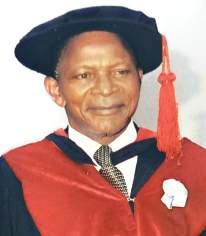
L-R: Executive Director, Project Alert; Ms Josephine Effah-Chukwuma; CEO, Impact Investors Foundation (IIF), Etemore Glover, Monitoring and Evaluation Officer, Raising Star Africa (Innocent Chukwuma Award for Social Impact Awardee) Kofoworola Showunmi; Babatunde Oyinkansola from Raising Star Foundation; CEO Workman, Mr Nnanna Ude, at the Annual Dinner and Awards Ceremony of Impact Investors Foundation (IIF) ,held at Civic Centre, Victoria Island, Lagos on 6th November 2025 Officer, Etemore Glover, reiterated this vision, reminding guests that “finance must become a force for social and environmental good.” Her words set the tone for an evening that blended elegance with impact.
Against the glittering backdrop of the Lagos Lagoon, guests mingled, business executives, social entrepreneurs, policymakers, and development partner, all united by a common goal:
The mood was equal parts celebratory and hopeful, with lively discussions about how Nigeria’s investment ecosystem can drive inclusive growth and sustainable development.
This year’s awards selection process was particularly rigorous. Nominees were required to demonstrate how they integrated social or environmental objectives
into their investment strategies.
According to Olufunke Baruwa, Chair of the Judges Committee, the purpose of the awards is to “celebrate those who prove that doing good and doing well can and must go hand in hand.”
Each submission was assessed against both quantitative and qualitative metrics, ensuring that only measurable impact was recognised.
Followed by Service of Songs by Council of Knights on Wednesday November 26, 2025 at Diocese of Awka at 3pm at Church of the Holy Spirit, Paul University.
On Thursday November 27, 2025, will be another Service of Songs at his residence in Akaba, Umudiji, Umuohama Ukpor by 5pm. Friday 28, November, 2025 starts with Lying in State for a Requiem Thanksgiving Service, at St. Andrews Anglican Church Umuohama Ukpor by the Council of Knights,Diocese of Nnewi, Anglican
Communion at 8:30am while the funeral service kicks off by 10:00am at St Andrew’s Anglican Church Umuohama Ukpor. Interment follows immediately at the family compound by the members of the Clergy and immediate family while reception follows after at the popular St. Mary’s Catholic Church Field by Ohineleke Central School, Umuohama, Ukpor in Nnewi South Local Government Area of Anambra State.
The funeral will be wrapped up with a thanksgiving service at St. Andrew’s Anglican Church, Umuohama Ukpor on Sunday, November 30, 2025.
The Nigeria Social Insurance Trust Fund (NSITF), has said that it has boosted Nigeria’s economy with over N1 billion in compensation payments to employees and families of deceased workers — a move the agency describes as both an economic stimulus and a social investment.
Managing Director and Chief Executive Officer, NSITF, Oluwaseun Mayomi Faleye, disclosed this during the Lagos International Trade Fair, noting that the payouts serve as a financial lifeline for households affected by workplace accidents and occupational hazards.
Represented by Mrs. Nkiru Ede Ogunnaike, Faleye emphasised that the payments were not acts of benevolence but the fulfillment of the Fund’s statutory obligation under the Employees’ Compensation Scheme (ECS).
“Compensation is not charity; it is justice, empowerment, and nation-building,” Faleye stated. “Each payment represents stability for families, liquidity for the economy, and confidence for Nigeria’s workforce.”
The NSITF said the N1 billion disbursed covered cases across diverse sectors including oil
and gas, manufacturing, finance, and public service, reflecting the Fund’s growing role in Nigeria’s social protection framework.
President of the Lagos Chamber of Commerce and Industry (LCCI), Mr. Gabriel Idahosa, praised the NSITF for its long-standing partnership with the Chamber, particularly in supporting the Lagos International Trade Fair.
He commended the Fund for discharging its duties transparently and for offering relief to families who have lost loved ones in the line of duty, urging its leadership to sustain these efforts.
The immediate President and Chairman of Council of the Institute of Capital Market Registrars (ICMR), Oluseyi Owoturo, has urged registrars to embrace innovation and efficiency in service delivery to strengthen trust and deepen participation in Nigeria’s capital market.
Speaking at the 14th Annual Conference and
Presidential Investiture of the Institute in Lagos, Owoturo, also the Chief Executive Officer of Coronation Registrar Limited, said the forum was designed to explore how registrars can transform their operations through technology and forwardthinking strategies to meet the demands of the future.
He said the conference theme, “Unlocking Global Value: The Evolving Role of Capital
Market Registrars in Trust, Efficiency and Innovation,” reflected the need for registrars to evolve from traditional recordkeepers to strategic partners shaping the future of the capital market.
According to him, the role of registrars now extends to fostering transparency, enhancing investor engagement, and supporting the growth of a resilient and sustainable market.
The Executive Director at Tropical General Investments (TGI Group), Mudassir Amray, has described gold as “a metal of strategy” and “an inflation firewall” for African economies.
Amray made this remark during his keynote address at the Gold Roadshow Africa, held in Lagos.
In his presentation, titled, “The Bridge Between Trust, Value and Financial Sovereignty for Africa,” Mr. Amray highlighted that the recent rally, which saw
gold cross the $4,300 mark for the first time in history, reflects a broader global shift in trust, capital, and power.
“For years, gold was seen as a metal of beauty,” he said. “Today, it stands as a metal of strategy, politically neutral, instantly liquid, and a firewall against inflation and currency depreciation.”
He stated that Africa produces over 40% of the world’s gold but captures less than 2% of its financial value, calling for a stronger focus
on domestic value addition. “We export raw and import finished wealth,” Mr. Amray noted. He commended ongoing local initiatives by Kian Smith Gold Refinery as important steps toward sustainable value capture and industrial growth.
Following his keynote, Mr. Amray joined a high-level dialogue with Bolaji Balogun, Founder and CEO of Chapel Hill Denham, moderated by Bode Oyetunde of the African Development Bank (AfDB).
Mary Nnah
Honda Nigeria is showcasing its latest products and innovations at the 2025 Lagos International Trade Fair, which kicked off on Friday, October 6th, and will run until November 16th at the Tafawa Balewa Square, Lagos. The exhibition features Honda’s full range of products, including its latest automobiles, motorcycles, and power products.
Head of Sales, Marketing, and Logistics, Remi Adams, said the company’s participation in the fair is motivated by its commitment to connecting with people and providing products that meet their needs.
“The motivation is people. The Lagos International Trade Fair is a renowned event that everyone wants to be part of. It’s an opportunity for us to connect our products
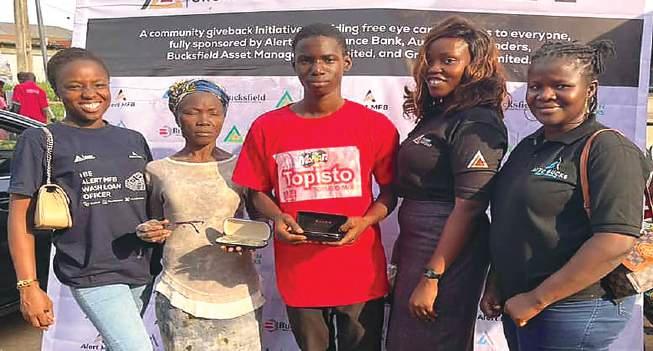
to the people.”
Adams also highlighted the company’s contribution to the Nigerian economy, noting that Honda’s assembly operations in the country have created jobs and transferred knowledge to Nigerians. “We touch lives, and the number of employees is way over 200. And every day, what we do is to see how to enhance the lives of those who work with the brand,” he added.
Kayode Tokede
The Nigerian stock market yesterday maintained its positive momentum, propelled by investors bargain-hunting activities in financial stocks, as the market capitalisation advanced by N1.003 trillion.
The Nigerian Exchange Limited All-Share Index (NGX ASI) gained 1,577.34basi points or 1.08 per cent to close at 146,981.17 basis points.
Also, market capitalisation rose by N1.003 billion to close at N 93.481 trillion.
The upturn was driven by price appreciation in large and medium capitalised
stocks amongst which are; Nigerian Aviation Handling Company (NAHCO), Zenith Bank, Stanbic IBTC Holdings, Nigerian Breweries and Oando.
Market sentiment was overwhelmingly bullish, with 55 advancing stocks significantly outnumbering 10 decliners. Custodian Investment and Linkage
Assurance emerged the highest price gainer of 10 per cent each to close at N38.50 and N1.76 respectively, per share. Oando followed with a gain of 9.97 per cent to close at N43.55, while NAHCO and Legend Internet advanced by 9.96 per cent each to close at N106.55 and N5.74 respectively,
per share.
On the other side, Austin Laz & Company led others on the losers’ chart with 9.96 per cent to close at N2.35, per share. Union Dicon Salt followed with a decline of 9.68 per cent to close at N7.00, while Sterling Financial Holdings Company shed 5.81 per cent to close at N7.30, per share.
Nigerian Exchange Group declined by 5.31 per cent to close at N52.60, while Guinness Nigeria down by 5.14 per cent to close at N166.00, per share. The total volume traded decreased by 28.15 per cent to 599.711 million units, valued at N22.696 billion, and exchanged in 23,675 deals.

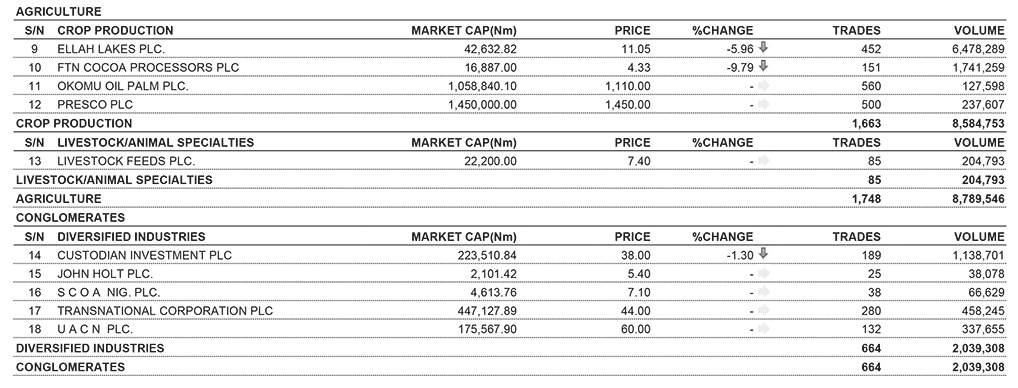
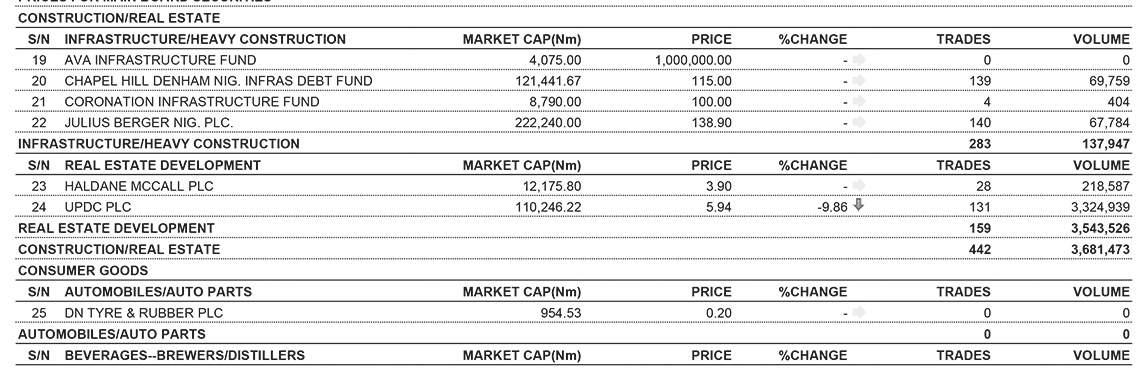
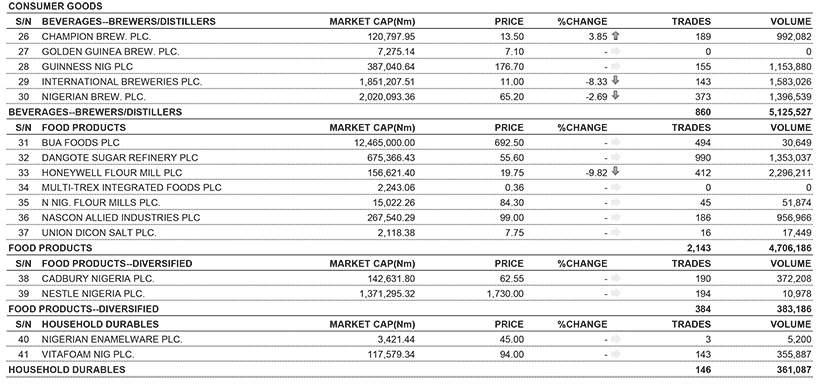

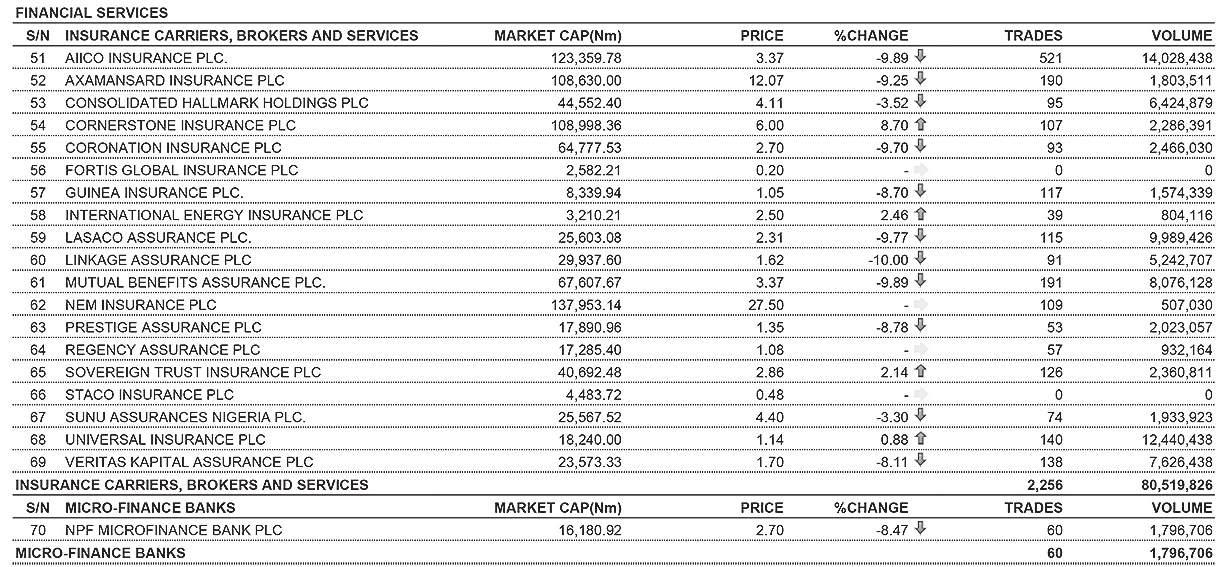

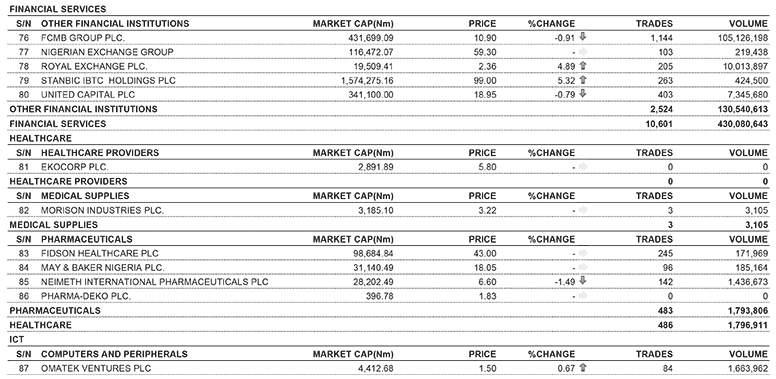
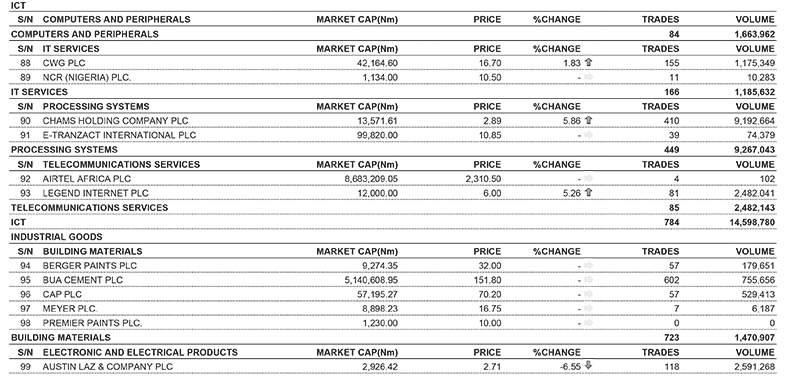

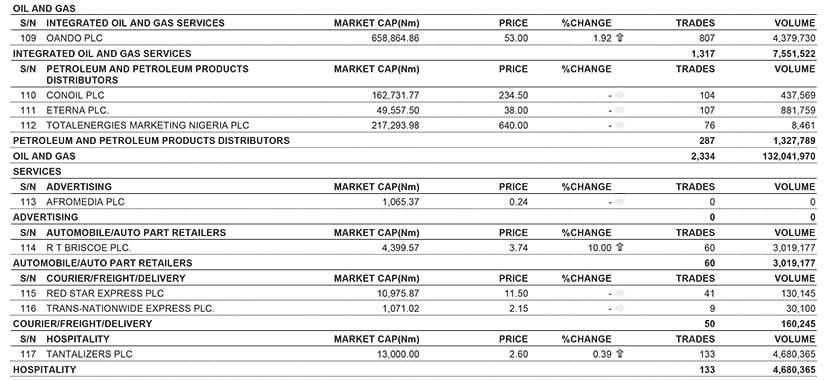
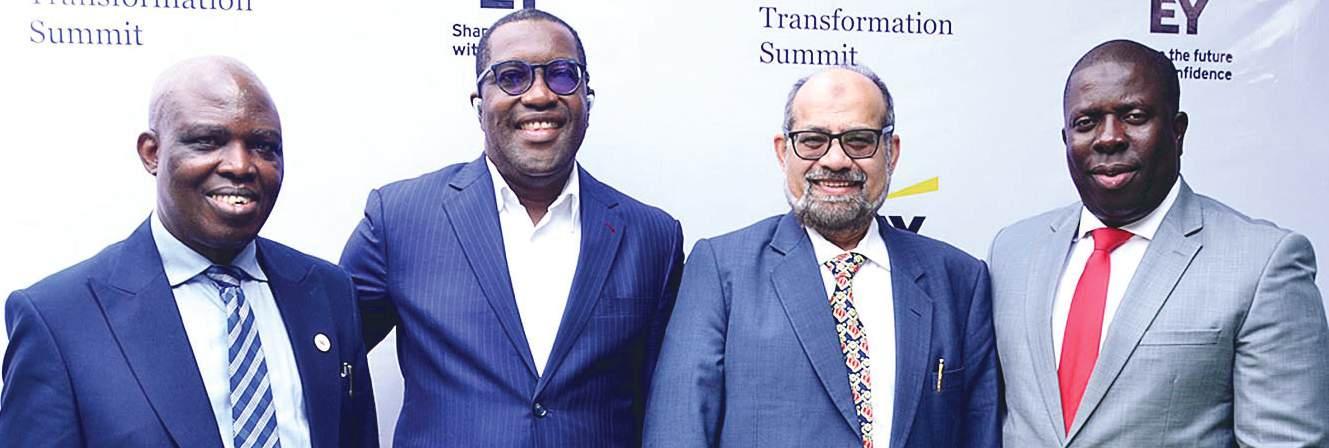
L-R: Director and Head of Corporate Governance of the Directorate of the Financial Reporting Council of Nigeria (FRC), Titus Osawe; Regional Managing Partner, EY West Africa, Anthony Oputa; Chief Financial Officer, Brittanua-U, Ahmed Ahkter Qazi; and Partner and Assurance Leader, EY West Africa, Jamiu Olakisan, at the Audit Committee Transformation Summit, organised by EY Nigeria held in Lagos ... yesterday
Sunday Aborisade in Abuja
The Senate on Thursday took a major step toward modernising Nigeria’s justice system by passing for second reading a bill to amend the Sheriffs and Civil Process Act, which has governed enforcement of court judgments since 1945.
The bill, sponsored by Senator Idiat Oluranti Adebule (APC, Lagos West), seeks to align the administration of justice with modern digital realities by introducing electronic service of court processes, updating fines, and removing bureaucratic bottlenecks that impede enforcement of judgments.
Leading debate on the general principles of the bill, Senator Adebule said the proposed law would overhaul an outdated framework that no longer reflects the realities of Nigeria’s judicial system.
The former deputy governor of Lagos State said, “Our
laws still require personal or hard-copy service of court processes, even though courts have since adopted electronic procedures through administrative“Theseguidelines.amendments will bridge that gap and align our justice system with the digital age,” she added.
The Lagos State Government Thursday announced plan to align the state, federal and international climate policies with investor priorities to fast track green finance and fund coastal resilience and ocean innovation projects.
In a communique from the recently held 11th Lagos International Climate Change Summit, it was resolved that bankable projects in renewable energy, aquaculture and marine innovation would be developed.
The participants also agreed to use blended finance, fiscal incentives and transparent
systems to attract private and international investments.
It was resolved that data should be deployed alongside AI, and digital tools for efficient resource management while supporting research, start-ups and partnerships to scale climate smart and ocean innovation solutions.
Participants also agreed to enforce environmental laws and expand mangrove, wetland, and marine habitat protection and integrate nature-based solutions and community initiatives into development planning.
The communique also
resolved to promote electric vehicles and clean transport hubs linking land, water and rail and ensure expansion of EV infrastructure, support local manufacturing and create green jobs.Other resolutions include: adopting climate smart agricul- ture, strengthening cooperatives and building cold-chain systems to enhance food security and reduce and waste.
They also recommended expanding drainage, water and flood control infrastructure as well as Integrating resilience into housing and urban plans
Sunday Aborisade in Abuja
The Senate Committee on Finance, on Thursday, screened Barrister Obehi Aire Okafor, President Bola
Ahmed Tinubu’s nominee for the position of CoChairman of the newly established Governing Board of the Unclaimed
Funds Trust Fund.
The screening, held at the National Assembly complex, Abuja, was conducted by the committee chaired by Senator Mohammed Sani Musa (APC, Niger East).
The nominee was accompanied to the session by the Senior Special Assistant to the President on National Assembly Matters (Senate),
Senator Basheer Lado. Okafor’s appointment marks a significant step in the operational takeoff of the Unclaimed Funds Trust Fund, a fiscal innovation introduced by the Tinubu administration to manage idle and unclaimed balances in banks and other financial institutions across the country.
using smart water technologies and PPPs.
“Establish a climate project office and investment fund to mobilize capital, strengthen investment opportunities in- stitutions, and turn innovations into bankable climate projects”.
The summit also resolved to promote habitat restoration, digital biodiversity monitoring and ecotourism to protect ecosystems and create jobs.
Adebule described the 1945 Act as “obsolete” and “incompatible with the pace of judicial reforms and technology-driven practices.”
She stressed that the bill would enhance efficiency and speed in the dispensation of justice.
She also faulted the existing requirement that judgments against government agencies must receive the consent of the Attorney-General of the Federation (AGF) before enforcement, calling it unjust and unconstitutional.
“Judgment creditors often abandon their claims due to bureaucratic bottlenecks. This reform will promote accountability and restore confidence in our justice system,” she argued.
Supporting the bill, Senator Kaka Shehu Lawan (Borno Central) said the amendment was timely and would make justice more accessible to ordinary Nigerians.
“This legislation will bring justice closer to the people and remove unnecessary delays,”
he stated.
Also lending his voice, Chair- man of the Senate Committee on Judiciary, Human Rights and Legal Matters, Senator Adeniyi Ayodele Adegbonmire, described the AGF’s consent provision as “a colonial relic that frustrates enforcement of valid judgments.”
He said, “Once the govern- ment loses in court, enforcement is stalled because consent is withheld. That defeats the very essence of justice.”
He urged the Senate to embrace reforms that reflect current realities.
Similarly, Senator Ali Ndume (Borno South) noted that laws must evolve with society, emphasizing that the amendment would bring Nigeria’s judicial system in line with global best practices.
After extensive debate, the bill was unanimously passed for second reading and referred to the Senate Committee on Judiciary, Human Rights and Legal Matters for further legislative work.
King’s Trust International (KTI) has appointed Nigerian business leader, Aigboje Aig- Imoukhuede, and his wife, lawyer and philanthropist Ofovwe Aig-Imoukhuede, as Co-Chairs of its Africa Advisory Board.
The leadership change, it said, marked a strategic shift aimed at strengthening KTI’s youth education, employability, and entrepreneurship programmes across the continent.
The couple succeeds Bernard and Genevieve Mensah, who have served as founding Co-
Chairs for six years, establishing KTI’s footprint in Africa and supporting over 30,000 young people across nine countries. KTI reports that 83 per cent of these participants secured employment or returned to education within three months of completing the programme.
In a joint statement on Thursday, Aigboje and Ofovwe Aig-Imoukhuede said: “We are honoured to take on this role at a pivotal time for Africa’s future. Our mission is to unlock the potential and creativity of Africa’s youth, nurturing
a generation that will lead sustainable development across the continent. We look forward to collaborating with partners who share our commitment to transforming lives through education, opportunity, and innovation.”
King’s Trust CEO, Will Straw, paid tribute to the outgoing Co-Chairs, noting: “Bernard and Genevieve have provided exceptional and visionary leadership that has been instrumental in establishing and growing KTI’s presence and impact across Africa.
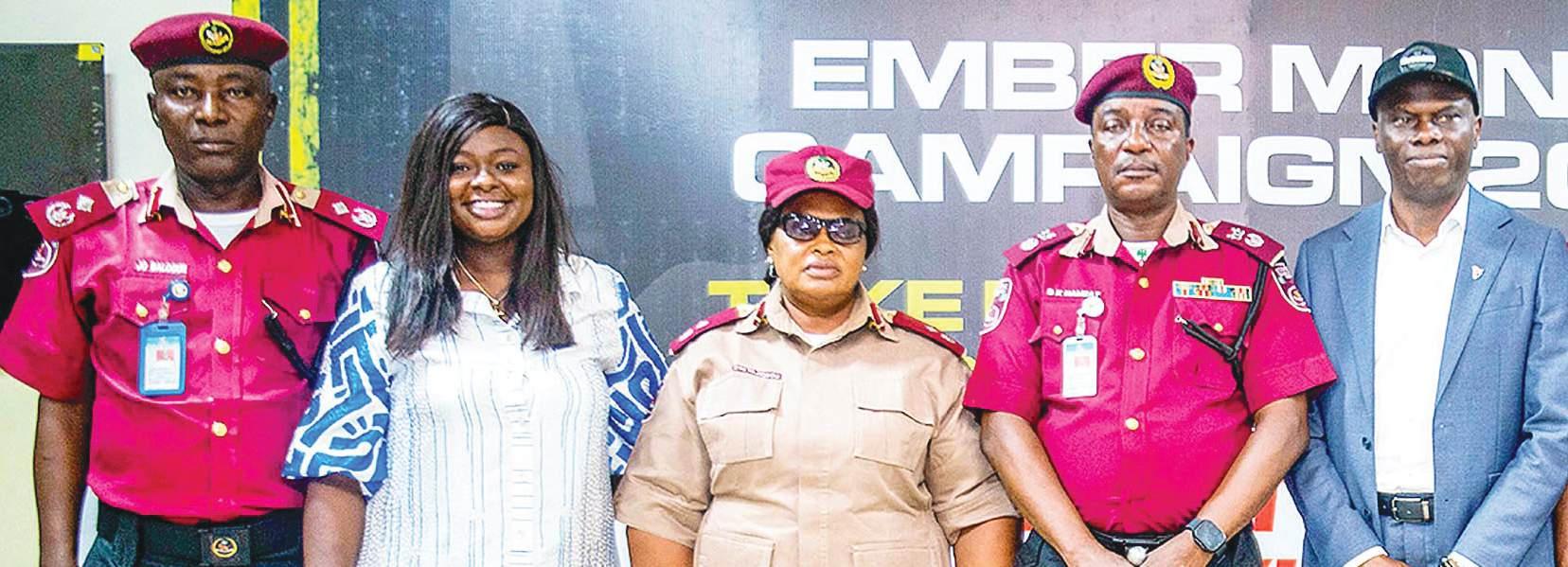
L-R; Deputy Corps Commander, Logistics, Federal Road Safety Corpps, DCC J. Balogun; Executive Assistant to Corporate Relations Director, Guinness Nigeria PLC, Augusta Oguzie-Chibuike; Deputy Corps Commander, Training FRSC, Bridget Nnodi Njoku; The Sector Commander, Corps Commander Kehinde G. Hamzat; Corporate Relations Director, Guinness Nigeria PLC, Rotimi Odusola at the FRSC Ember Don’t Drink and Drive Campaign
Peter Uzoho and Olusegun
Samuel in Yenagoa
The federal government through the Minister of State for Petroleum Resources (Oil), Senator Heineken Lokpobiri, has threatened to use all instrumentality of the law to pursue indigenous oil companies that have failed to repay the loans they took from the $450 million Nigerian Content Intervention Fund (NCI Fund), an initiative of the Nigerian Content Devel- opment and Monitoring Board (NCDMB).
The minister conveyed the government’s resolve yesterday while speaking at an occasion or- ganised by Tamrose Limited, an indigenous oil service company, at the NCDMB headquarters in Yenagoa, Bayelsa State, tagged “Celebration of Growth and Impact.”
The NCI Fund which has grown from the initial $250
million to the current $450 million is a financial initiative established by the NCDMB to support indigenous companies in Nigeria’s oil and gas industry, and each company is only al- lowed to take a maximum of $10 million.
Managed by the Bank of Industry (BOI) and the Nigerian Export-Import Bank (NEXIM), the fund provides low-interest loans for various purposes like manufacturing, asset acquisition, and working capital.
The fund is sourced from a 1 per cent deduction of contracts in the upstream oil and gas sector and is intended to boost local capacity and competitiveness.
According to the NCDMB, over 70 companies have taken advantage of the fund but only 21 companies including Tamrose have fully repaid their loans after successfully growing their operational capacities.
But speaking at the event,
Lokpobiri, who doubles as the Chairman of NCDMB Governing Council, underscored the importance of companies repaying the loans, saying that would enable others to also benefit from the fund.
He, however, expressed disappointment that only 21 companies were able to repay
their loans out of over 70 beneficiaries, vowing that the government will pursue those defaulters using all instrumen- tality of the law to recover the loans.
“So I’m encouraging all com- panies that have taken advantage of this money, please, meet your obligation, service these loans, so
that money can continue to be kept afloat to service companies in this “Andindustry. also, as a lawyer, I also want to use this opportunity to say, those who feel that they are not going to pay back this loan, we will use the instrumentality of the law to recover this money, so that we can use it to develop
this“Weindustry. are not going to allow anybody to use this money to go and buy private jets instead of using it to grow the fleet in the industry. We will pursue anybody who is taking this money and who is not fulfilling the obligation of repaying the money”, Lokpobiri stated.
Segun Awofadeji in Gombe
The Gombe State Government has taken decisive measures to strengthen security across the state, following an expanded state security council meeting chaired by Governor Muham- madu Inuwa Yahaya.
The meeting was attended by heads of security agencies
The Minister of Interior, Hon. Olubunmi Tunji-Ojo, has called for comprehensive reforms to integrate private guard companies into Nigeria’s national security framework, noting that their contributions are critical to addressing emerging security challenges across the country.
Speaking at the 5th Private Security Industry Summit (PSIS) in Abuja, the Minister emphasised that private security firms,
if properly regulated and coordinated, could serve as a vital complement to the efforts of conventional security agencies. He also highlighted the need to review the Private Guard Companies Act 1986, describing it as outdated and inadequate for addressing current security realities. The minister said: “Private security outfits are crucial to what the government seeks to achieve. We need you not only for maintaining security in estates and busi-
ness premises but also for intelligence gathering and sharing.
According to official records, “you are among the largest employers of labour in the country, providing jobs for over one million Nigerians. We will begin with the review of the existing law and prioritise training, because we need one million officers to augment state security forces. These officers must also serve as potential intelligence agents for Nigeria.”
and paramilitary services in the state; relevant commissioners, local government chairmen and traditional rulers led by the Emir of Gombe, HRH Alh. Dr. Abubakar Shehu Abubakar III.
Briefing journalists shortly after the meeting yesterday, the Attorney General and Com- missioner for Justice, Barrister. Zubair Muhammad Umar, said the council deliberated extensively on recent security developments and adopted far- reaching resolutions aimed at maintaining the enviable status of Gombe as one of the most peaceful states in Nigeria.
Barrister Umar disclosed that the council had received reports of renewed farmer-herder skirmishes in parts of the state, which unfortunately led to the loss of 2 lives in Funakaye Local Government Area.
He explained that to contain the conflicts and nip it in the bud, the council recommended suspension of two traditional leaders, including the district and village heads of the af- fected community who were accused of negligence in their responsibility to prevent escala- tion of local conflicts.
“The council viewed their inaction as a serious dereliction of duty. Traditional rulers are the government’s first line of contact at the grassroots, and they must be proactive in resolving disputes before they escalate,” the commis- sioner said.
In another security measure, the council banned the transportation of scrap materials (Bola-Jari) from 6:00 PM to 7:00 AM, following reports that stolen parts and vandalized public properties are often moved under the cover of darkness.
The first set of millionaires have emerged in Globacom’s “Play Up” lottery, a fun and rewarding game that combines entertainment with the chance to win life-changing cash prizes.
At a prize-presentation event held by the company in Lagos on Wednesday, four lucky subscribers from different parts of the country
who won in the first draw of the lottery received N1 million each.
They included Engineer Edward Worgu, 48, from Port Harcourt, Rivers State, who said the win could not have come at a better time.
His words: “Initially, I didn’t believe it,” he explained, but after speaking with a very persistent Glo customer care
agent, I made the journey to the Lagos regional office. It’s a very timely surprise that I least expected. My wife is currently hospitalized, so this will go a long way in paying for her treatment. Kudos to Glo.”
Another winner, Mr. Akindele Ayenugba, 68, from Ondo State, described the experience as nothing short of a miracle.
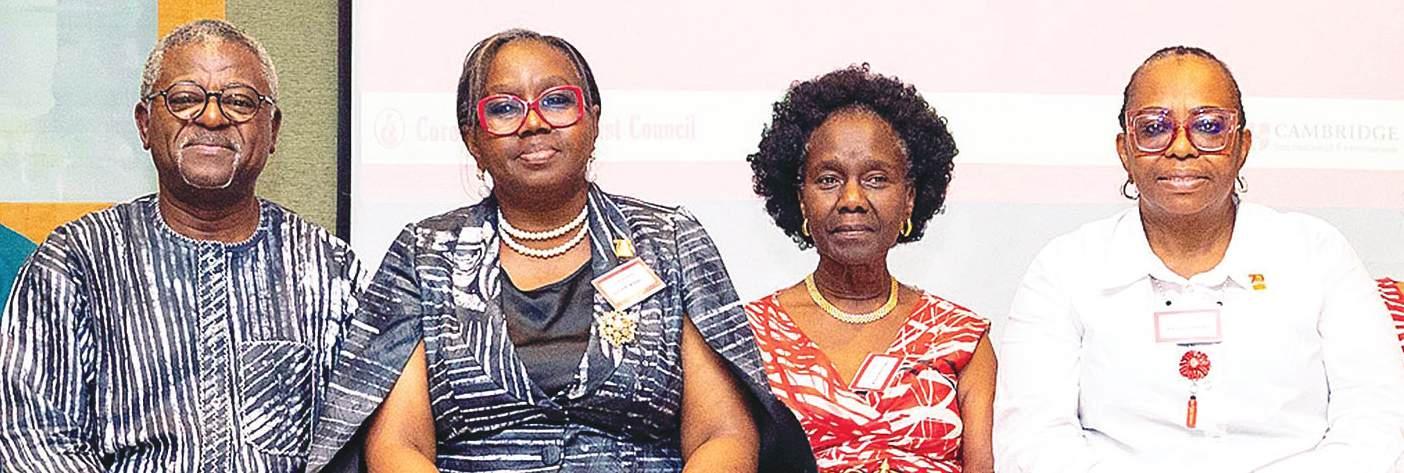
L-R: Chairman, Human Resource Committee Member, Corona Schools’ Trust Council Governing Board, Engr Kunle Adebajo; Chairman, Corona Schools’ Trust Council Governing Board, Honourable Justice Raliat Adebiyi;President, Corona Schools’ Trust Council Board of Trustees, Dr. Myma Belo-Osagie; and CEO, Corona Schools’ Trust Council, Mrs Adeyoyin Adesina at the schools’ Governing Board Retreat held in Lagos… recently
President Donald Trump has finally signed legislation ending the longest government shutdown in U.S. history, hours after the House of Representatives voted to restart disrupted food assistance, pay hundreds of thousands of federal workers and revive a hobbled air-traffic control system.
The Republican-controlled
chamber passed the package by a vote of 222-209, with Trump’s support largely keeping his party together in the face of vehement opposition from House Democrats, who are angry that a long standoff launched by their Senate colleagues failed to secure a deal to extend federal health insurance subsidies.
Trump’s signature on the bill, which cleared the Sen-
ate earlier in the week, will bring federal workers idled by the 43-day shutdown back to their jobs starting as early as Thursday, although just how quickly full government services and operations will resume is unclear, a Reuters report said.
“We can never let this happen again,” Trump said in the Oval Office during a late-night signing ceremony that he used
to criticise Democrats. “This is no way to run a country,” he emphasised.
The deal extends funding through January 30, leaving the federal government on a path to keep adding about $1.8 trillion a year to its $38 trillion in debt, the Reuters report said.
“I feel like I just lived a Seinfeld episode. We just spent 40 days and I still don’t know
The 2023 presidential candidate of Labour Party and former Governor of Anambra State, yesterday, called on Nigerian editors to use their platforms to hold leaders accountable and help restore the nation’s moral compass. He also reiterated that he was not desperate to become the President of Nigeria, saying his only desperation was to see the nation function properly for all to benefit.
Delivering a goodwill mes- sage at the 21st All Nigeria Editors Conference in Abuja,
titled: “Reclaiming Our Nation’s Dignity,” Obi urged editors to champion truth, integrity, and responsible leadership as vital steps toward rebuilding Nigeria’s dignity and national values.
Obi said: “Today, more than ever, Nigeria stands at a critical crossroads, and it is vital that we reflect together on the path we must take if we are to restore both the dignity of our country and the hope of our people.
“This platform allows us to discuss not only the challenges that confront us—the moral, social, and economic crises that have brought us to this
juncture—but also the vision, responsibility, and collective action required to reclaim the promise of a better Nigeria for all citizens.
“Our country, Nigeria, stands today at a most critical crossroads. Just two weeks ago, the President of the United States, Donald Trump, made a comment on social media referring to Nigeria as a “now disgraced country.”
He added: “He singled out the killings in our land without compunction, but in truth, he was merely echoing what many Nigerians of good conscience have been saying
Chuks Okocha in Abuja
Chieftain of the People’s Democratic Party (PDP) and former presidential candidate, Dr. Gbenga -Hashim, has donated reusable sanitary pads worth over N5 million to young girls across the North Central.
Speaking during the presentation ceremony in Abuja,
the presidential hopeful in 2027 said the initiative was part of his ongoing efforts to support adolescent girls, especially those affected by the economic hardship in the country.
He disclosed that over 2,000 girls will benefit from the first phase of the distribution, while more beneficiaries would be included in subsequent phases
of production and distribution.
Also speaking at the event, one of the coordinators, Mrs. Judith Tsenvel fidelis, the immediate past Commissioner, Nigeria Girl Guides Association, Plateau State Chapter, explained the gesture was inspired by the growing inability of many young girls to afford disposable sanitary pads due to rising costs.
for years—often at the risk of being accused of de-marketing their own country.
“The reality is stark: Nigeria is facing existential challenges that demand our sober reflection. For many, the immediate reaction was to debate whether there is genocide in Nigeria or not. But that is not the central question. The questions we should ask ourselves are far deeper: are there killings, whether genocide or not?
what the plotline was,” said Republican Representative David Schweikert of Arizona, likening Congress’ handling of the shutdown to the misadventures in a popular 1990s U.S. sitcom.
“I really thought this would be like 48 hours: people will have their piece, they’ll get a moment to have a temper tantrum, and we’ll get back to work.” He added: “What’s happened now when rage is policy?”
The shutdown’s end offers some hope that services crucial to air travel in particular would have some time to recover with the critical Thanksgiving holiday travel wave just two weeks away. Restora- tion of food aid to millions of families may also make room in household budgets for spending as the Christmas shopping season moves into high gear.
It also means the restoration in coming days of the flow of data on the U.S. economy from key statistical agencies. The absence of data had left
investors, policymakers and households largely in the dark about the health of the job market, the trajectory of inflation and the pace of consumer spending and economic growth overall. Some data gaps are likely to be permanent, however, with the White House saying employment and Consumer Price Index reports covering the month of October might never be released. By many economists’ estimates, the shutdown was shaving more than a tenth of a percentage point from gross domestic product over each of the roughly six weeks of the outage, although most of that lost output is expected to be recouped in the months ahead.
The vote came eight days after Democrats won several high-profile elections that many in the party thought strengthened their odds of winning an extension of health insurance subsidies, which are due to expire at the end of the year.
In a major boost to educa- tion in Nigeria, OPay has launched a N1.2 billion scholarship initiative, with N126 million already disbursed to 420 students across Nigeria.
The financial technology company says the pro- gramme, part of its efforts to create social value and contribute to the country’s future, is aimed at empower- ing the next generation of leaders.
According to Elizabeth Wang, OPay’s Executive Di- rector and Chief Commercial Officer, this initiative is part of the company’s commitment to creating social value and contributing to Nigeria’s future.
Wang, speaking at the OPay CSR Empowering Futures 2025 conference held recently in Lagos, emphasised the importance of education in shaping the future of the country. “The student is the future. Education is the future,” Wang said, adding,
“That’s why OPay would like to join the future and contribute to the future of Nigeria.”
She added that the company’s vision is to become the most respected and popular financial technology company that creates social value.
The scholarship pro- gramme, which is a key component of OPay’s Cor- porate Social Responsibility (CSR) efforts, aims to provide financial support to deserv- ing students and help them achieve their academic goals.

L-R: Professional Relations/BSBF Manager, Colgate-Palmolive Tolaram, Dr. Ogechukwu MacJohnson; President, International Association for Dental, Oral and Craniofacial Research (IADR), Nigerian Division, Prof. Oyinkansola Sofola; Former President, IADR, Nigerian Division, Prof. Omoigberai Braimoh; Professor of Dental Public Health, College of Medicine, University of Lagos, Prof. Omolara Uti; and Senior Lecturer, Lagos State University College of Medicine, Dr. Afolabi Oyapero, during the Colgate Sponsored Symposium at the 22nd IADR Annual Scientific Conference, held in Lagos...recently
Emmanuel Addeh, Olawale Ajimotokan, Linus Aleke in Abuja, Sunday Ehigiator in Lagos, Ibrahim Oyewale in Lokoja and Seriki Adinoyi in Jos
Divergent reactions have continued to trail the allegation of alleged genocide against Christians in Nigeria, with the African Union (AU) Commission maintaining that nothing of such scale was happening in Africa’s most populous nation.
He also threatened to “stop all aid and assistance to Nigeria, and may very well go into that now disgraced country, ‘guns- a-blazing,’ to completely wipe out the Islamic Terrorists who are committing these horrible atrocities.”
irrespective of race, creed, or religion.”
Nigeria, which has 200 ethnic groups practicing Christianity, Islam and traditional religions, has a long history of peaceful coexistence. But it has also seen flare-ups of violence among groups, often exacerbated by ethnic divisions or conflict over scarce resources.
Idris charges advertisers to change religious perception of Nigeria U.S. intervention could get messy, says Sam Adeyemi CSO urges Trump to seek collaboration, not confrontation Continues online
AU Commission Chairperson, Mahmoud Ali Youssouf, rejected the accusations by U.S. President Donald Trump that “very large numbers” of Christians were being killed in Africa’s most populous“What’scountry. going on in the northern part of Nigeria has nothing to do with the kind of atrocities we see in Sudan or in some part of eastern DRC,” Youssouf told reporters at the United Nations in New York, referring to Democratic Republic of Congo.
“Think twice before... making such statements,” he said. “The first victims of Boko Haram are Muslims, not Christians,” Reuters quoted the AU chief as Thesaying.extremist Islamist armed group Boko Haram has also terrorised northeast Nigeria, an insurgency that has killed tens of thousands of people over the past 15 years. Human rights experts have said most Boko Haram victims have been Muslims.
Trump earlier this month said he has asked the Defence Department to prepare for possible “fast” military action if Nigeria fails to crack down on the killing of Christians. He did not provide any specific evidence for his accusation.
Nigeria’s Foreign Ministry has said the country would keep fighting violent extremism and that it hoped Washington would remain a close ally, saying it “will continue to defend all citizens,
But separately, the Pentecostal Fellowship of Nigeria (PFN) and the Plateau State chapter of the
Christian Association of Nigeria (CAN) have disagreed with the notion that there’s no mass killing of Christians in the country, urging the federal government to end what it described as an ongoing “Christian genocide” in the country and warning that continued silence in the face of mass killings could threaten Nigeria’sSpeakingunity.after an emergency executive meeting of the Fel- lowship held at its national
headquarters in Lagos, PFN President, Bishop Wale Oke, said the Christian body would no longer remain silent while Christians are “targeted, killed, raped, and displaced” across several states.
“There is Christian genocide going on in Nigeria,” Oke declared. “If we call it by any other name, it will bring Nigeria down. We are crying out to our international friends, beginning with America and
Donald Trump. Whatever you can do to help our government put an end to it, come quickly and get it done,” he added. The cleric cited recent mass killings in Benue and Plateau States, where, according to him, hundreds of Christians were massacred on Christmas Day and in Dogon Noma. He described the incidents as clear evidence of systematic targeting.
President Bola Tinubu has reiterated his administration’s resolve to ensure that Nigeria maximises its human, material, and intellectual potential for enhanced industrialisation, peace, and prosperity.
Speaking on Thursday while receiving in audience members of Course 33 of the National Defence College at the State House, Abuja, the President charged the participants to view themselves as agents of positive national development and commended them for their patriotic duty and commitment throughout the programme.
Tinubu reiterated that the government will always provide a platform for proffering inclusive solutions to emerging socio–economic national challenges.
The President also stated that his administration was committed to empowering the nation’s defence and military institutions to develop a crop of sufficiently trained officers,
thereby enhancing national power in the defence and security environment.
According to President Tinubu: “I congratulate all of you, the leadership of the college, the participants and resource persons. We are building a political, economic and security future here. We must develop Nigeria. The strategic path to industrialisation, as enumerated in your presentation, gives credence to that”.
In the research paper titled, ‘Harnessing Indigenous Manufacturing for Enhanced National Security by Year 2040’, President Tinubu assured that his administration will carefully study the recommendations for implementation and challenged the participants to be committed towards intellectual analysis of the nation’s emerging challenges.
“I have listened attentively to your presentation. We must develop future strategic leaders sufficiently equipped with the requisite knowledge and analytical skills necessary to
enhance the instrument of national power in a dynamic defence and security environment.
“It is our joint responsibility to ensure that this nation, Nigeria, is productive, it is governed inclusively, and takes care of the future of our generation yet unborn.
“It is our patriotic duty to look further into the horizon, to be determined and be resilient, to invoke our spirit that can achieve greatness, to train our people, develop our economy, promote industrial development, and ensure that sovereignty is assured, pro- tected, and will remain resilient.
“We challenge our intellectual curiosity by being highly inquisitive and looking at what other nations are doing, where we are today, how we got here, and where we are headed tomorrow,” the President further stated.
Tinubu also told the management of the College to be ‘patient’ on the request for the full development of the college’s
permanent site, which started in 2010.
Earlier in his presentation, Commandant of the College, Rear Admiral A. Ahmed, informed that the College, established in 1992, is the highest professional military educational institution in Nigeria.
He told President Tinubu that the theme of Course 33 was “Strengthening Institutions for National Security and Development in Nigeria.”
According to the Com- mandant, Course 33 had 99 participants made up of 25 from the Army, 16 from the Nigerian Navy, 12 from the Nigerian Air Force, five from the Police and 18 from different MDAs, as well as 23 international participants from Africa, Asia and South America.
He said the College had so far graduated 3,097 participants, comprising military officers from the Nigerian Armed Forces, the Police, as well as friendly African countries.
Also speaking, leader of the
team, Captain M.A. Ahmed, informed President Tinubu that the course’s research topic aligns with the Renewed Hope Agenda, particularly in terms of economic diversification through industrialisation, digitalisation, creativity, and manufacturing. According to him, the National Defence College sent study teams to over 23 countries worldwide, including eight in Africa, nine in Europe, and six in Asia, to study the indigenous manufacturing sec- tor. This is due to the sector’s significant role in generating wealth, creating jobs, driving economic development, and contributing to the country’s overall growth. He explained that nations actively pursue industrialisa- tion, economic diversification, national security and national development. He said that the case of Qatar particularly struck a chord with the team because it shares similar characteristics with Nigeria as part of its economy’s makeup.
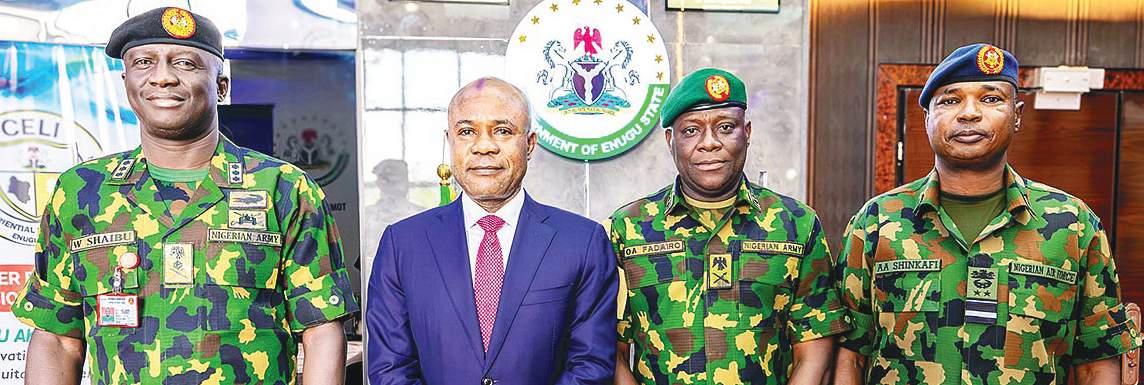
L-R: Chief of the Army Staff, COAS, Lt. Gen. Waidi Shaibu; Governor of Enugu State, Dr. Peter Mbah; General Officer Commanding, 82 Division, Nigerian Army, Maj. Gen. Oluremi Fadairo and the Air Officer Commanding, Ground Training Command, Nigerian Air Force, Air Vice Marshal Abdullah Shinkafi, during the COAS’ courtesy visit to Governor Mbah at Government House, Enugu ... yesterday
Onyebuchi ezigbo in Abuja
The federal government has said that Nigeria’s health sector is yet to attain the expected heights, despite recent suc- cesses recorded in the effort to rebuild healthcare system.
It said although there is evidence of some improvements over the last few years, “they
stand that he called the Chief of Defence Staff, who advised him to wait for the outcome of an investigation.”
Wike Blasts Buratai, Insists Yerima Carried Out Illegal Order
Wike, while addressing the media at Life Camp, blasted Bu- ratai for asking him to apologise to Yerima for the incident, which happened in Gaduwa District of Abuja, saying the former army chief cannot educate him on decency.
The minister also did not spare Yerima for his role in the altercation that escalated over the disputed parcel of land, said to belong to former Chief of Naval Staff, Vice Admiral Awwal Gambo, which the FCT Administration said was illegally occupied.
He accused the naval officer of accepting an illegal order in stark contravention of the rule of law.
Wike stated, “I read what one former Chief of Army Staff wrote. He cannot tell me of decency and this he can’t teach me. This was the same man who directed his GOC to rig election, my election in 2019. He couldn’t rig me. He lost.
“He told his GOC to kill me and I could not be killed. He became an agent in APC primaries to one of APC’s presidential aspirants. Look at the rank becoming a polling agent. He is the one commenting
remain not complimentary enough for a nation of our stature, resources and ambition”.
Minister of State for Health and Social Welfare, Dr. Iziaq Adekunle Salako, who delivered a paper titled: “Strengthening Nigeria’s Health System Resilience for Sustainable and Inclusive
that the minister did this and that. I have never seen people like this.
“I have no regrets for my political opponents. I will continue to make them have sleepless nights. Whether you are in PDP, whether you are in APC, whether you are in ADC, it is not my business.
“I have no regrets supporting President Tinubu and I have never hidden my intention and I will continue to do what is right. So, if you like write anything you want to write, in as much as I know, I am standing by the side of the law. If you like, bring every ethnic colouration, it is your business.”
Wike blamed Yerima for the part he played, insisting he acted within the confines of his authority as a minister representing the president and Commander-in-Chief of the Armed Forces.
He said, “I mean, anybody should know. Yes, you are a young man and you are a commissioned officer. Mr man, I am a minister and I’m representing Mr. President, that alone should have given you that decorum. But no, no, you chose to challenge the minister representing the president.
“And then you think that I am not a human being, I have no emotions. You are carrying out an illegal job. When people say, order, do you need to carry out an illegal order? When you are an officer you are doing something illegal. Even if it’s
Care” at the 2025 Joint Annual Review Meeting (JAR) in Abuja on Thursday said the federal government was fully aware of the challenges and is making concerted efforts to reverse it.
Salako who reeled out statistics and health indices portraying current challenges, said Nigeria still accounts for
a legal order given to you, that job you are doing is illegal.
“A professor once said that even though you’re told to obey orders, you must not obey illegal ones. He’s right. You’re obligated to obey only lawful instructions. If you follow illegal orders simply because of who gave them, you’re endangering yourself.“Imagine being told to shoot an innocent person because a former president ordered it. You’ll still be held accountable for murder. No one is above the law.”
Wike also reaffirmed his respect for the military, stating that he would approach the Chief of Defence Staff, the Army, Navy, or Air Force leadership—or even the president – if there are grey issues to be addressed instead of resorting to confrontation or misinformation.
He said, “We’ve had prob- lems, yes, but we’ve always tried to resolve them without intimidation or weakening the government. Once we start tolerating such behaviour, others will follow, and we’ll lose all order.
“Gentlemen, I have great respect for the military and always will. I understand what discipline and structure represent. I’m not a fool—I went to school. So, when people say I have problems with the military, that’s simply not true. I don’t, and I will not.
“And that’s why I keep saying I don’t have problems with the
approximately 14 percent of global maternal deaths and 9 percent of global under-5 deaths, despite representing only 2.6 percent of the world’s population.
Quoting figured from the 2023 Nigeria Demographic and Health Survey (NDHS) preliminary results; Salako said that Nigeria’s maternal
military. There’s no such thing. But I also respect the president’s authority and his decisions. If we have thousands of officers doing their duties, then we don’t have a crisis. What we need is continuity and order.
“However, what I will not tolerate is selective enforcement, where one person is told not to go somewhere because of personal bias. That’s unac- ceptable. Those responsible for such actions must be held accountable.”
The minister also accused those taking sides in the matter of bias and failing to thoroughly investigate what transpired, saying as minister he could not remain aloof while the FCT administration officials, up to the level of director, were being assaulted by soldiers.
He accused Gambo of abuse of power as a former chief of naval staff by not emulating retired generals, including former President Olusegun Obasanjo and General Theophilus Dan- juma, who had the courtesy of calling him to resolve their land matters, rather than sending soldiers to attack government officials.
Wike stated, “Chief Olusegun Obasanjo, a general, former head of state, former president, he will call me on the phone… ‘Minister, look o! There’s this problem of land here can you’… and we will solve the problem.
“That is former head of state. Former elected president, he had the courtesy of calling
mortality ratio stands at 512 deaths per 100,000 live births (down from 576 in 2018).
He said that Under-5 mortality rate stands at 110 deaths per 1,000 live births (a reduction from 132 in 2018), while neonatal mortality is at 41 deaths per 1,000 live births.
Also, the minister said that Skilled Birth Attendance is up
the minister, look, I have this problem. See how he can look into it.
“General TY Danjuma will call you. Look at this and, and this. These are people, they are all retired generals, these are people with discipline.
“They didn’t bother because they were former chief of army staff, former president. They never sent soldiers. They never sent anybody to go and attack anybody.”
Wike said the land in question was not allocated to Gambo, but a company called Santos, in 2007 for parks and recreation, while the former minister, Mohammed Musa Bello, refused the application for a change of use, when the company applied for the purpose to the FCTA.
Former President of the Senate, Senator Ahmad Lawan, charged Nigerians not to disrespect personnel of the country’s armed forces, saying their sacrifices demand consistent national support and appreciation.
Lawan, who spoke to newsmen on Thursday at State House, Abuja, after a closed-door meeting with President Bola Tinubu, said Nigeria’s military personnel “give their lives for the sake of this country” and must be treated with utmost respect.
from 43 percent in 2023 to 53 percent (up from 43 percent in 2018).
Similarly, the minister said that full immunization coverage which stood at 39 percent is an improvement from 31 percent in 2018 while modern contraceptive prevalence is at 20 percent among currently married women.
His remarks came in the wake of Tuesday’s altercation between Wike, and Yerima.
Applauding the military for its service, the president of the ninth senate, who currently chairs Senate Committee on Defence, said he had first-hand knowledge of the dedication and sacrifice of security personnel. Lawan stated, “I know how committed our armed forces are. I know how they give their lives for the sake of this country. They deserve our respect; they deserve our support at all times.
“This administration is investing heavily in the armed forces and other security agencies, and Nigerians, regardless of status, must respect Commentingthem.” on the delayed transmission of the 2026 Ap- propriation Bill to the National Assembly, Lawan said there was “no cause for alarm,” stating that both arms of government understand the urgency of passing the budget early.
According to him, “Time is of essence when it comes to the national budget. I am sure the executive is working around the clock to finalise the estimates. Once it is presented, we will process, scrutinise and pass it withoutLawandelay.” said he was at State House to commend Tinubu for what he described as bold and courageous reforms aimed at stabilising the economy and strengthening national security.

L-R: Godwin Oriazowanlan, Senior Manager, Lottery, Globacom; Omotara Shitta-Bey, Campaign Management, Globacom; Glo Play Up lottery winner, Engineer Edward Worgu; Mojeed Aluko, Head Value Added Services, Globacom; Israel Oluwafemi, Quality Assurance Officer, Nitorswitch and Vincent Eze, Head A2P and USSD, Globacom, at the Glo Play Up Lottery prize presentation at Globacom’s office in Lagos on Wednesday
sunday aborisade in Abuja
The Senate, yesterday, took a historic legislative step toward reforming Nigeria’s military justice system, passing for second reading, a bill seeking to repeal and re-enact the Armed Forces Act to make it constitutionally compliant, democratically accountable, and operationally modern.
The proposed legislation,
He said, “Mr. President, in the last two years, has taken profound steps to reposition the economy and significantly increase investments in the security sector. Our economy has stabilised, we are heading in the right direction, and there is growth—what remains is to make that growth inclusive.”
Acknowledging the linger- ing security challenges facing the country, the Yobe senator expressed optimism that the administration’s massive investments in defence would yield positiveLawan,results. a critical stakeholder in the ruling All Progressives Congress (APC), pledged full support for the Tinubu administration, stating that constructive engagement—not public criticism—remains his preferred approach.
He stated, “If I can sit with my president and offer advice, why should I criticise him publicly? It is important to counsel our leader, support him, and ensure the administration delivers what Nigerians need. President Tinubu is a listening leader, and where the public raises legitimate concerns, he alwaysLawanreconsiders.” said he would continue to advocate support for his constituency and the country, adding that ensuring the success of the administration is the responsibility of every loyal party member and public office holder.
titled: “A Bill for an Act to Repeal the Armed Forces Act and to Re-enact a Modern, Constitutionally Compliant and Operationally Responsive Legal Framework for the Armed Forces of the Federal Republic of Nigeria, and for Related Matters, 2025,” was sponsored by Chairman of the Senate Committee on Army, Senator Abdulaziz Musa Yar’adua, APC, Katsina
Irabor Warns Against Disrespecting Men in Uniform, Says Face-off Condemnable
Speaking during a presenta- tion at the 21 All Nigeria Editors’ Conference in Abuja, organised by Nigerian Guild of Editors, former Chief of Defence Staff, General Lucky Irabor, said the incident involving the FCT minister and the naval officer should not be viewed merely as a personal confrontation. He said it should be seen as a symbolic affront to the authority of the state.
The former CDS, whose presentation was titled, “Media, Terrorism and National Security: Addressing the Complexities,” added, “The uniform is not just clothing; it represents the authority of the state.
“Whether worn by a young officer or a senior one, it symbolises the power and legitimacy vested in them by the Commander-in-Chief. Any act of disparagement or confrontation against an officer in uniform amounts to a disrespect to the state itself.”
He explained that in military law, an offence was determined by two elements: actus reus (the act itself) and mens rea (the intent behind it).
According to him, any attempt to demean or publicly insult a uniformed officer undermines not just the individual, but the very institution of national secu-
Central.
The bill proposed far-reaching reforms to the Nigerian Armed Forces, including a key provision that would make convictions handed down by military tribunals subject to judicial review by civil courts, a move hailed by lawmakers as critical to ensuring fairness, transparency, and adherence to constitutional principles.
Leading debate on the
rity that the uniform represents.
“Such conduct desecrates the oath of office and weakens the sanctity of the state,” Irabor added.
Irabor lamented what he described as the erosion of civic education and the diminishing public understanding of author- ity and duty, blaming it partly on the decline of subjects, like Civic Studies in schools.
“This lack of understanding has led to confusion, disrespect, and lawlessness,” he stated.
He said, “The uniform helps us recognise those entrusted with law enforcement. Whether police, military, or any other security agency, they deserve respect. Even if an officer errs, there are proper channels for redress; not confrontation.”
Drawing parallel with ad- vanced democracies, the former defence chief stressed that in civilised societies, citizens do not resort to public altercations with security officers.
“When a police officer in the United States or Europe violates the law, the response is not mob justice but legal accountability. The same standard must apply here,” he said.
He urged the media to play an active role in clarifying such issues and shaping responsible publicIrabordiscourse. said, “Respect for authority is not optional; it is essential for national stability. When we erode that respect, we edge closer to anarchy.”
general principles of the bill, Yar’Adua said the existing Armed Forces Act, originally derived from military decrees of the 1960s and last consolidated in 2004, was outdated and incompatible with Nigeria’s democratic framework and evolving security environment.
He said, “The Armed Forces of Nigeria remain the cornerstone of our sovereignty
Falana: Wike, Officer Took Laws into Their Hands
Senior lawyer, Femi Falana, SAN, tasked President Bola Tinubu to compel the FCT minister to apologise for using uncomplimentary remarks and abusive words against the naval officer, whom he said could have shot the minister during the confrontation.
But Falana also condemned the naval officer, Yerima, for engaging in an illegal duty of guarding a private property, and preventing the minister from carrying out his legal duty.
Falana went ahead to fault the federal government’s move to have former Deputy President of the Senate, Ike Ekweremadu, serve his remaining prison sentence in Nigeria.
He spoke yesterday at Yakubu Gowon University (formerly University of Abuja) Abuja, during the opening of Legal Year of Faculty of Law, organised by Law Students Association of Nigeria (LAWSAN), UNIABUJA Chapter.Speaking on the face-off between Wike and Yerima, Falana stated that although Wike was carrying out his statutory responsibilities as enshrined in Section 11 of the Land Use Act, his failure to exercise emotional intelligence and his use of de- rogatory language towards the military officer were wrong.
He cited a case in Ghana
and national security.
“They have stood gallantly in defence of our nation, from combating insurgency and terrorism to peacekeeping mis- sions across Africa. However, our military law has not kept pace with the evolving defence environment.”
Yar’adua explained that the proposed law would align military governance with constitutional norms and
where a minister had to apolo- gise for making uncompliment- ary remarks about a taxi driver, emphasising the importance of dignity and respect.
Falana stated, “On no ground should a minister force himself and abuse the military officer. No minister has the power to call any Nigerian a fool. Mr President should compel the minister to apologise. He was lucky he was not shot.”
Falana also said, “The military officer contravened the law by preventing the minister from doing his legal duty. The officer engaged in illegal duty to guard the land of a private person.
“So when he said he was acting on superior orders; those orders are illegal. But the minister went off track.
Even the president can’t call any Nigerian a fool.”
Falana added that Nigerians were impressed that even in the heat of provocation, the officer did not lose his patience.
The human rights activist faulted the Nigerian govern- ment’s move to have Ekweremadu, serve the remainder of his prison sentence in Nigeria.
He questioned the rationale behind the decision, wondering why the government failed to intervene in the cases of other 232 Nigerians serving in British prisons.Promising to take up the issue, the legal practitioner also questioned the prisoner exchange programme, arguing that there
international best practices while introducing reforms to disciplinary procedures, operational structures, and welfare provisions.
He said obsolete penalties such as N200 and N500 fines would be replaced with percentage-based sanctions tied to officers’ salaries, while non-commissioned officers would enjoy expanded rights and fair hearing protections.
is no British citizen currently serving in Nigerian jail.
Speaking on the theme, “Liti- gation as a Bloodline of Justice: Building the Next Generation of Advocates,” Falana urged the law students to leverage technol- ogy, expressing satisfaction that courts across West Africa are increasingly adopting virtual hearings and electronic filing of court processes.
He also tasked them to take more than a passing interest in the affairs of the country.
Odinkalu: Wike Trespassed on Private Land, Defied Presidential Authority
Odinkalu accused Wike of acting outside the law in what he described as a recent forced entry into a private land. In a post on X, Odinkalu stressed that Wike, a presidential appointee, was neither a police officer nor a court bailiff, and, therefore, had no legal authority to enforce possession of private property.
He described Wike’s actions as “plainly on the wrong side of everything: law, common sense, decorum, and ministerial propriety”, adding that “the only thing he had on his side was alcohol”.
Odinkalu emphasised that no ministerial office granted the right to enter land in adverse possession without a court order. “Wike had no right to be

L-R: Managing Partner, Law Corridor, Ajibola Ganiyu; Director General, Ekiti State Transport Agency, Tajudeen Akingbolu; President, Law Students Association of Nigeria (LAWSAN), University of Abuja Chapter, Muhammed Akingbolu; Special Guest of Honour/Honouree, Femi Falana (SAN); Dean of the Faculty of Law, UNIABUJA, Prof. Uwakwe Abugu, and Senior Special Assistant to the President on National Assembly Matters (House of Representatives), Ibrahim Kunle-Olarewaju, during the conferment of Senior Advocate of the Masses (SAM) on Falana by UNIABUJA Law Students in Abuja...yesterday
Olawepo-Hashim backs caretaker idea Wike, Anyanwu, supporters call for boycott Adamu reconciliation c’ttee submits report Wabara: Convention is absolutely practicable to go on in Ibadan
Chuks Okocha and Olawale Ajimotokan in Abuja
Ahead of Saturday’s national convention of the Peoples Dem- ocratic Party (PDP), a former Senate President, Dr. Bukola Saraki, has advised his party to suspend its planned national convention slated for November 15 and 16, 2025 in Ibadan, Oyo State, citing legal and political controversies surrounding the exercise.
He, however, ‘advised the Board of Trustees (BO) to set up a Caretaker Committee to
where he was. There is no ministerial right or power to enter land in adverse posses- sion without a court order,” he said, calling Wike’s behaviour “Ministerial Vigilantism”.
The human rights advocate also cited Section 33(2)(a) of the Nigerian constitution, which allowed the use of force in lawful defence of property rights, stating that effective possession is recognised as an intangible propertyAccordingright. to Odinkalu, Wike’s action effectively positioned him as a trespasser using force without lawful justification.
Highlighting the personal risk Wike faced, Odinkalu said, “He was lucky to come out without injury or worse. An officer of less discipline or one who takes Johnnie Walker for breakfast, may have been less parsimoni- ous with a projectile.”
He drew parallels to past clashes involving Shiite protesters in Zaria, cautioning that similar recklessness could have had seriousBeyondconsequences. the immediate legal implications, Odinkalu warned that Wike’s actions could
steer the affairs of the party for the time Supportingbeing. the idea, a presidential hopeful, Dr. Gbenga Olawepo-Hashim, also called on the PDP leadership to urgently convene a joint meeting of its National Executive Committee (NEC), bringing together members from all factions, to appoint a caretaker committee that would organise a unity convention for the party.
Also, at a meeting of party stakeholders, the Minister of the FCT, Nyesom Wike; embattled National Secretary of the PDP
undermine the authority of the president as Commander- in-Chief, saying, “The officer corps will be looking out for how the C-in-C handles this.”
Odinkalu wrote, “Nyesom Wike is a Minister of the Federal Republic and an appointee of the President. He is neither a police officer nor a bailiff. A lot of people who claim to be lawyers go about this thing with no regard for law. Wike was plainly on the wrong side of everything: law, common sense, decorum, and ministerial propriety. The only thing he had on his side was alcohol.
“Wike had no right to be where he was. There is no ministerial right or power to enter land in adverse possession without a court order. Ideological purists like me may quarrel with it, but a lot of people forget that s. 33(2)(a) of the Nigerian constitution grants a right to kill lawfully in defence of property rights & effective possession is an intangible property right.”
Odinkalu stated, “Wike was a trespasser using force to enter land in adverse possession & without lawful Court order or
and their supporters, yesterday, in Abuja, appealed to members to boycott the Saturday conven- tion.
But the reconciliation committee set up by the PDP BoT to reconcile all factions, has submitted its report to the chairman of the board, Adolphus Wabara, with a recommendation that the national convention should go ahead as scheduled.
Wabara, while fielding ques- tions from the reporters, said the convention was “absolutely practicable’’ adding that, the report would be discussed after
warrant. He was on a mission of Ministerial Vigilantism. He was lucky to come out without injury or worse. An officer of less discipline or one who takes Johnnie Walker for breakfast—like Wike—may have been less parsimonious with a projectile. The Shiites in Zaria did a lot less & see what happened to them.
“I am not sure people realize what amount of trouble this puts Wike in. This affects the authority of the president as C-in-C. The officer corps will be looking out for how the C-in-C handles this.
“In case anyone wonders who wrote this, my name is Chidi Anselm Odinkalu. This nonsense has to stop!”
Group Petitions U.S, U.K, EU Over Wike’s Role in Nigeria’s Democracy Decline
A civil advocacy group, under the banner of #Nigeria Unite, petitioned major Western governments and international institutions, including the United States, United Kingdom and the European Union, against Wike,
the convention.
Speaking after meeting the Adami committee, Saraki said,
‘’My advice to the BOT team is that the only solution available to us now is for the party to set up a Caretaker Committee to steer the affairs of the party for the time being.
‘This must be done in the next two days. This is the path to true reconciliation and stability of the party. It is also the best way to give confidence to our members who intend to contest elections on the PDP platform.
‘’In the present circumstance,
over what they called his role in Nigeria’s democracy decline.
In the petition, titled, “Im- minent Collapse of Democracy in the Sahel Region (West Africa),” the group expressed deep concern over what it called the “systematic erosion of democratic institutions” in Nigeria. It warned that the country’s political trajectory mirrored the instability already engulfing parts of the Sahel.
The document, signed by the group’s national secretary, Sun- day Daniel, was addressed to the U.S. House of Representatives in Washington D.C., the European Commission in Brussels, the U.K. Foreign, Commonwealth and Development Office, and key international figures, including Senator Ted Cruz and European Commission President Ursula von der DanielLeyen. called for diplomatic intervention to protect Nigeria’s democracy and stability amid what it described as a growing authoritarian drift.
The petition linked the decline of democratic norms in Nigeria to alleged abuses of power by Wike, accusing him
no serious politician with electoral ambition will seek to contest on the platform of the PDP, not knowing whether his or her nomination will be valid or declared null and void,’’ Saraki stated.
According to the former Senate President, “It is clear that going ahead with the National Convention in Ibadan on 15-16 November 2025 will only serve to further fuel the present crisis.
“Therefore, going ahead with the convention as scheduled is a waste of efforts. It does not have my support. It’s not too
of “intimidation, bribery, and manipulation of state institu- tions” to weaken opposition parties and consolidate control.
Citing ongoing instability in Mali, Burkina Faso, and Niger, three Sahel nations under military rule, the group warned that Nigeria’s demo- cratic backsliding could have “catastrophic regional and global consequences,” including rising insecurity, migration pressures, and humanitarian crises.
The group stated, “We urge the African Union, the United States, and the United Kingdom to take a proactive stance in safeguarding democracy in Nigeria. Diplomatic engagement, monitoring electoral processes, and offering support to civil society organizations are essential steps in this endeavour.
“We implore the international community to impose targeted sanctions against Nyesom Wike, the architect of many of these anti-democratic machinations. Measures such as visa bans, and the confiscation of assets abroad would send a clear message that the international community will not tolerate the undermining of
late to find a win-win solution
‘’My advice to the BOT team is that the only solution available to us now is for the party to set up a Caretaker Committee to steer the affairs of the party for the time being. This must be done in the next two days.
“This is the path to true reconciliation and stability of the Party. It is also the best way to give confidence to our members who intend to contest elections on the PDP platform.
Continues online
democratic principles.”
It said, “In addition to targeting Wike, we advocate for similar punitive measures against the compromised judges and police officers who facilitate the enforcement of his schemes. Holding these individuals ac- countable is crucial for restoring the rule of law and rebuilding public trust in Nigeria’s democratic institutions.
“We strongly advocate for the immediate sanctioning of public judicial officials implicated in collusion with Wike in this alarming scheme. Noteworthy among these individuals are John T. Tsoho, Peter Odo Lifu, Joyce Obehi Abdulmalik, and James K. Omotosho, whose actions undermine the integrity of our judicial system.
“Additionally, the Com- missioner of Police of the Federal Capital Territory and the Independent National Electoral Commission must be held accountable for their roles in this troubling alliance. Ensuring accountability is es- sential to restore public trust and uphold the rule of law in our democratic processes.”
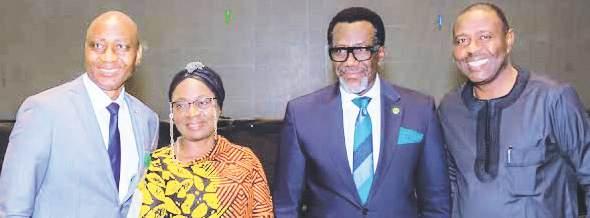
L-R: Managing Director, CHI Life Assurance, Mr. Olutope Ilesanmi; President/Chairman of Council, Chartered Insurance Institute of Nigeria (CIIN), Mrs. Yetunde Illori; Commissioner for Insurance/CEO, National Insurance Commission, Mr. Olusegun A. Omosehin, and CHI Life Assurance Non-Executive Director, CHI Life Assurance, Mr. Uwamai Igein, at the Insurance Directors’ Conference in Lagos…recently
The African Democratic Congress (ADC) has condemned the federal government’s fresh request for of N1.15 trillion in domestic borrowing, accusing President Bola Ahmed Tinubu of policy inconsistency and fiscal recklessness.
In a statement signed by the party’s National Publicity Secretary, Mallam Bolaji Abdullahi, ADC noted that despite Tinubu’s public claim that Nigeria had met its non-oil revenue targets—reportedly N20.59 trillion by August 2025—the administration continues to deepen the country’s debt crisis.
Citing a report that Nigeria’s total public debt could rise to N193 trillion if all of Tinubu’s 2025 loan requests are approved, the party said the government
was “borrowing against its own words” and failing to deliver meaningful relief to Nigerians still burdened by inflation and rising living costs.
According to the spokesman of the coalition party, approval by the National Assembly of N1.15 trillion in fresh domestic borrowing by the APC-led federal government exposed the contradictions and dangerous fiscal trajectory of President Bola Ahmed Tinubu’s administration.
Olugbode in abuja
Mrs Oborevwori, Commissioner to Lead Train
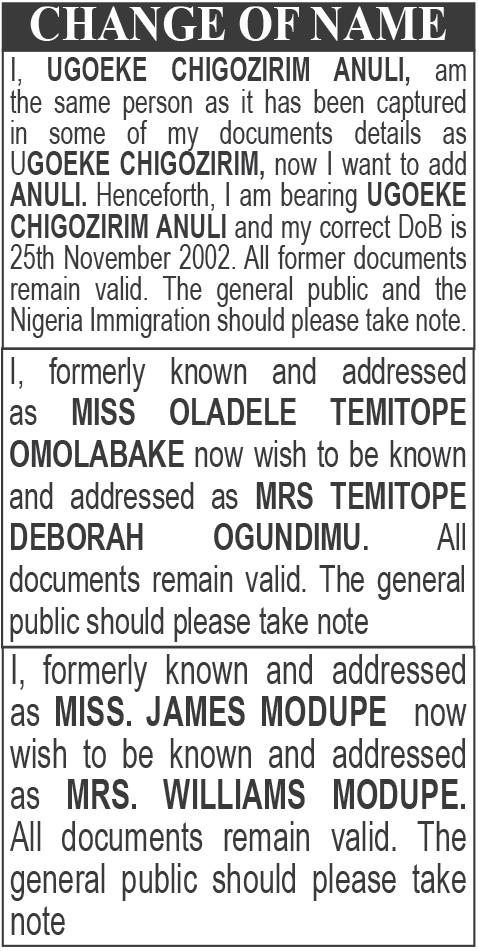
for Primary Education, Dr. Ashibogwu Nze Kingsley, are set to play leading roles at the flag-off of the Train the Trainers Summit in Asaba. The summit is a national initiative aimed at equipping parents, teachers, and community leaders with modern strategies to raise confident, values-driven children.
Themed “Empowering Our Generation NEXT Leaders: Raising Children to Thrive and Lead,” the summit is being hosted by the Duke’s Infant & Child Foundation.
A statement by its convener, Mrs. Augusta AnyanwuEgbom, noted that the summit presents a unique opportunity to engage educators, caregivers, and community leaders in shaping Nigeria’s future leaders with a strong foundation of moral values, resilience, and leadership skills. The Train the Trainers Summit is scheduled to flag off in Asaba tomorrow and continue in Warri on Sunday, November 16, 2025. It will feature an impressive lineup of speakers, including Africa’s leading parent coach Wendy Ologe, Uche Monu, CEO of Silver Crest Educational Services, CSP Omosetemi AgbedeZuokumor, Co-Initiator of Security Education Advocates (SEA), and other thought leaders in child development and empowerment.
The Nigeria Security and Civil Defence Corps (NSCDC) has arrested 20 suspects for various degrees of involvement in kidnapping, armed robbery, murder vandalism, crime
bordering on obtaining by false pretence amongst others across the Federal Capital Territory (FCT), Nasarawa, Benue, Plateau, and Ondo States.
The Commandant CG’s Special Intelligence Squad, Apollo Dandaura, said the arrests were made
by his men, acting on the NSCD Commandant General Prof. Ahmed Audi’s directive on clamping down on criminal activities and conducting thorough investigation into cases bothering high profile syndicate operations across the federation. Dandaura said in keeping with the directive, his men apprehended gangs of dangerous syndicate of criminals responsible for heinous crimes across the FCT, Nasarawa, Benue, Plateau, and Ondo States.
The Vice Chancellor of the University of Port Harcourt (Uniport), Professor Owunari Georgewill, has advised the newly inaugurated executives of the Graduate Students’ Association (GSA) to uphold peace, dialogue, and service as they take up
their new roles.
Speaking during the inauguration ceremony held at the university campus, Professor Georgewill commended the smooth conduct of the recent GSA elections, and expressed satisfaction with the peaceful transition of leadership.
He said: “Democracy
has come to stay, and I am happy that the GSA elections have ended peacefully.”
However, the VC also issued a word of caution to the new leaders, urging them to avoid reverting to the old days of conflict and division within the association, saying: “My word of caution is this: do
not take us back to the old days when the GSA was full of conflict and division.”
Professor Georgewill praised the immediatepast administration for maintaining stability within the association urged the new leaders to work closely with the university management.
Africhange has announced two major milestones in its mission to empower Africans living abroad. The company has partnered with Griffin, a United Kigdom (UK)licensed bank, to launch GBP bank accounts for customers in the UK, while also being
officially recognised by the Bank of Canada as one of the country’s first registered Payment Service Providers (PSPs).
Africhange’s partnership with Griffin tackles a problem that’s plagued African immigrants in the UK for years: getting access to proper banking services. However, from now, Africhange users can open GBP bank accounts with their own unique sort codes and account numbers.
According to the company, these aren’t the usual virtual accounts that simply pass transactions along. They’re dedicated bank accounts with full banking functionality. Users can receive direct deposits, hold GBP balances securely, and transfer money through the faster payments network.
James sowole in abeokuta
Former President Olusegun Obasanjo yesterday led walk to commemorate the World Diabetes Day.
The walk, which lasted for about 15 minutes covering over three meters from inside
his Olusegun Obasanjo Presidential Library (OOPL) and back home, was held to sensitise Nigerians to embrace physical exercise to check the growing scourge of diabetes.
The former president, who is a diabetic patient himself of over 40 years,
was joined in the walk by medical personnel, security operatives from the police and Federal Road Safety Corps (FRSC) as well as members National Youth Service Corps (NYSC).
The Executive Director of Olusegun Obasanjo
Foundation, Dr Olalekan Makinde, said that the former president has with the brisk 15 minutes walk passed across the message that Nigerians must embrace healthy living, most especially physical exercise to put diabetes at bay.
nothing in common with the people from the north of the country, Boko Haram, where Islamism is. Those were our ethnic enemies and yet you end up being lumped in with those people”.
Cut of the same wool and shopping for distraction from the republican party electoral woes at home, Trump zeroed in on Nigeria and bellowed “If the Nigerian Government continues to allow the killing of Christians, the USA will immediately stop all aid and assistance to Nigeria, and may very well go into that now disgraced country, ‘guns-a-blazing,’ to completely wipe out the Islamic Terrorists who are committing these horrible atrocities,”. In their affectation of radical ideological/sectarian posturing, Trump and Badenoch will find a political soulmate in the late President Muhammadu Buhari
The difference between Badenoch and Trump is that as incumbent president, the latter is in a position to put his ideas into effect while the former as shadow prime minister is not. In the proclivity for stirring the hornet’s nest, they epitomise the Yoruba saying that ‘oro ti ologbon ba so ni koko, enu omugo ni a ti ngbo’ (what the wise and circumspect says in privacy, will be ranted out by the talkative fool in the openness of the street). Their propositions constitute a dangerous simplification of the Nigerian problem which, nonetheless, is validated by the historical context of Nigeria, a history in which Islam (in the North) appears to be inherently bound to violence.
This interpretation is borne of such recent pedigree as the impunity of the murder of Deborah Samuel in Sokoto for an alleged blasphemy of prophet Mohammed. The impunity was compounded by the consequent abdication of the Nigerian judiciary to Islamic terror, inclusive of the fear- induced withdrawal of the public admonition of the murderers by Vice-president Atiku Abubakar. You will recall the adjournment sine die of the case by the presiding judge in the face of the mob bearing down on the court the day some of the murderers were arraigned before the Judge. Giving a historical perspective to this pedigree (by going all the way back to the era of the slave trade), Iliyiasu Gudu persuasively argued that “the point about the brutal historical experiences of the minority ethnic groups in the hands of Hausa-Fulani in the pre-colonial and colonial periods of our history is incontestable. It has been historically documented that the area under reference suffered immensely from the slave raiding activities of rulers and agents of the Fulani dominated Sokoto Caliphate”.
Before the Trump intervention, there has been
website raised hopes, but slow updates during the presidential results phase eroded trust. Seventh, logistics and communication were shaky; rules were applied inconsistently, and mixed messages made the process seem unreliable. Eighth, the entire system felt fragile: security, party organisation, election monitors, media, vote counting, and courts all appeared compromised, causing widespread distrust.
Why does this matter? Because democracy isn’t just about following rules—it requires people’s consent and support. When fewer people vote, leaders lose legitimacy, and trust in the system breaks down. Governing becomes a constant struggle to convince the public. The economy is in turmoil, and society oscillates between protests and anger. When trust is low, democracy’s vital everyday elements—service, public engagement, accountability—are weakened. The Sceptic Tribe isn’t just skipping an election; they’re stepping away from democracy itself.
Looking ahead to 2027, there are three possible paths:
The best path takes the issue of regaining trust seriously: testing everything openly in the next two off-cycle elections, publishing results that truly reflect voters’ will, following strict rules for vote counting and result transmission, and allowing free observer access. Voter turnout may not skyrocket, but people will feel the system is earning their trust.
The middle path offers some improvements within the current electoral framework, but many problems remain. Processes run unevenly, results are challenged in court, rulings are inconsistent or compromised, and people grow tired of hoping. This leads to more sceptics and declining faith in the system. This is a landmine waiting to explode.
The worst case is continued broken promises: authorities use security agents to manipulate the process, vote uploads are discarded, technology is exploited to falter, collation centres become hubs of manipulation, counting becomes secretive,

an increasing normalisation of the tragedy of the regular slaughter of the long suffering Christian minorities of the North. Having now found a trump card in the arrival of ‘the man on the horse back’, they would be clueless not to maximally milk the cow. For Nigeria, it presents a once in a blue moon opportunity for a course correct.
Prior to Donald Trump and in a unique inter- nationalization of the crisis the British House of Lords once clarified the fraught situation as follows: ‘many thousands of civilians have been killed in attacks led by Islamist Boko Haram and Fulani militias in Northern and Central-belt states in a targeted violence and the perpetration of atrocities against predominantly Christian communities’. (British House of Lords, 2018).
For those who thrive on dealing with the symptom while ignoring the underlying malaise, I find no better characterisation of the Donald Trump threat than the megaphone of Reverend Hasan Matthew Kukah that the American president is ‘merely the sympton of the big elephant in the room namely the persecution of Christian minorities in Nigerian politics’. This underlying disease has several manifestations.
They are substantially captured in the coinci- dence that nearly all incendiary eruptions with an underlying tone of religious intolerance, (as
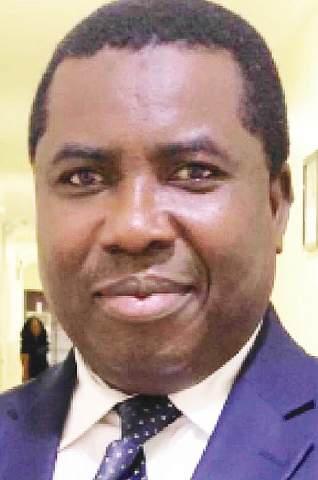
complaints pile up, clashes occur at polling centres, and trust collapses rapidly. Stability, then, means merely avoiding open conflict, not having absolute confidence, and causing long-lasting damage. This is a scenario nobody should wish for Nigeria, but to which politicians seem committed. What’s the solution? Everyone involved in politics must take responsibility. It’s in our enlightened self-interest to make the 2027 election genuinely free and fair. This is not about favouritism; it’s about ensuring legitimacy, which supports peace and stability. Free and fair elections in 2027 are one of the only options to preserve the nation and put us on the path to progress.
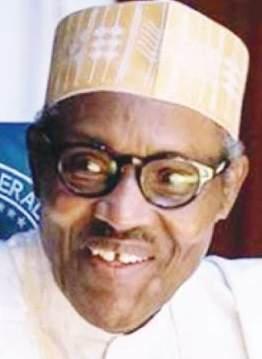
between Christians and Muslims), had been initiated by sectarian partisans of the latter. I do not know the categorical doctrinal position of Islam on blasphemy, but many violent religious outbursts have been attributed to provocative blasphemy against prophet Mohammed. While I do not condone profanity or sacrilege, I cannot recall any such reciprocal culture in modern Christianity that encourages violent retribution for blasphemy against Jesus Christ.
The spatial proclivity for the degeneration of religious sensitivity to militancy is similarly skewed, as in the conspicuous instance of the Zango Kataf inter ethnic crisis (between the Hausa settlers and the indigenous Atyap people who were banned from trading pork and beer by the settlers). There is always this impression that the Christians tend to suffer the fate of the underdog. There is equally the religious chauvinism implied in the Muslim/ Muslim ticket of President Bola Ahmed Tinubu No Nigerian leader is more circumspect and sub nationally value-neutral (in his comments on Nigeria) as President Olusegun Obasanjo, yet he was driven to such an extent that he could not hold himself from expressing fears of ‘Fulanisation’ and ‘Islamisation’. The case of General Theophilus Danjuma is particularly striking. Here was a man who busted into national prominence as a pivotal figure in the July 1966 counter coup imposition of
For the government, this means passing key reforms by early 2026 with a focus on transparency and actions, not just reports. Currently, there is no sign of commitment to electoral framework reforms.
For the election commission (INEC), it calls for radical transparency: publicly test voting and results systems during off-election periods, share honest reports within 72 hours, and fix issues before the next election. On election day, show a dashboard indicating polling units that opened on time, local incidents, and results uploaded. Transparency isn’t about perfection; it’s about showing the system monitors itself and invites public oversight.
The judiciary needs to self-correct and save itself. Judges and lawyers must collectively enforce strict accountability and transparency by investigating, disciplining, and prosecuting any judicial officers found to be corrupt or unethical.
Political parties should lead by example: take political education of citizens seriously, make primary elections open, share funding reports, and punish violence or vote-buying in their own internal elections. If they want transparency from officials, they must start with themselves.
Security agencies should act clearly and restrainedly. Publish rules before voting day, maintain a public hotline, and update incident reports in real time. Their role is to protect the election environment, not influence results.
Citizens, civil society, and media should register to help run polls, use freedom-of-information laws to monitor campaign spending, and support independent vote tracking to complement official results. Raising political consciousness and public awareness is critical to a credible election.
Before election day, people should see clear, simple proof: public tests with honest reports, published rules for accessing counting centres, a live incident dashboard, transparent staff recruitment details, and a visible results upload counter. This turns trust from a feeling into measurable facts that the
‘one North” hegemony, turning around to lead Middle Belt buyer’s remorse at the latter stage of his storied life. He is today the godfather of the Northern Christians revolt against the dominant Islamic partner of Northern irredentist politics. In exasperation, he once typically and loudly remonstrated “The ethnic cleansing must stop in Taraba State and other parts of Nigeria. otherwise, Somalia will be a child’s place. I urge all of you to be at alert and defend your country. defend your territory, defend your state,” he said.-(24th March 2018)
At the other end, none has personified the Jihadist variant of Islam in Nigeria than President Muhammadu Buhari, the Al Turabi of Nigerian Muslims. In and out of office, by omission and commission, he is, without doubt, the most symbolic representative of militant Islam in Northern Nigeria. Among his iconic orchestration and incitement of sectarian violence are:
“An attack on Boko Haram is an attack against the North”
“I will continue to show openly and inside me the total commitment to the Sharia movement that is sweeping all over Nigeria. God willing, we will not stop the agitation for the total implementation of the Sharia in the country.” – Buhari (News24, August 27, “Muslims2001)should only vote those who will promote Islam. We are more than the Christians if you add our Muslim brothers in the West.”- Buhari (Liberty Radio Kaduna, 2003). “Why should Christians be concerned when Muslim cut off their limbs? After all, the limbs that are being cut off are Muslim ones and not Christian. So why should Christians bother about it?? – Buhari (Liberty Radio, Kaduna 2003)
I hereby adopt the following excerpts from the pedagogic contribution of a Nigerian media icon, Muyiwa Adetiba, as concluding remarks “We have seen the declaration of Fatwa on people whose words and actions have made some religious hardliners uncomfortable. Worse, we have seen people actually being stoned to death on the streets and in broad daylight on grounds that they desecrated Islam. In these cases, the State had been silent and the leaders mute. No line in the sand had been drawn, no culprits apprehended. It is this silence that smirks of complicity on the side of State and northern elites. And in doing so, have played into the hands of pro-genocide advocates. There is also no denying that Boko Haram, ISWAP, ISIS and Fulani Herdsmen are Islamic groups.”
public can verify.
All this should happen within the next six months. By early 2026, pass a focused electoral reform law, run the first state-wide tech test in an off-cycle election, and share the results. Start monthly public updates on election preparedness. Before June 2026, launch a dashboard for civil groups to review, test the result upload process and publish timings. Last quarter of 2026, conduct a national mock election drill with observers and release an audit report months before voting. By election time, citizens should be able to track everything as easily as they check the weather—openly and routinely.
I remember sitting in that First Daily lecture hall, listening to the cautious words of expert and civil society panellists. It’s easy to feel discouraged, but the doubters just want proof. People will take hope if the system is transparent. We don’t need new ideas to make 2027 count—we need to do ordinary things well and openly: pass a new electoral act, publish plans to make elections more transparent and reflective of the people’s will, stick to timelines, report failures, fix issues before the next test, and be clear about it.
Elections aren’t performances; they’re the founda- tion of stability. It’s in everyone’s interest—from government to courts, parties, election officials, and security—to ensure elections are genuinely free and fair. When trust returns, legitimacy follows. When legitimacy grows, the future opens a bit more. In 2027, the biggest challenge may not be the voters or any political party, but the total loss of faith in the electoral process. To overcome it, we must replace empty promises about electoral reform and election management with clear, verifiable actions—one step at a time. That work must start now, with open choices everyone can see and verify. •Dr Dakuku Peterside is the author of two new books, “Leading in a Storm” and “Beneath the Surface”.
Duro Ikhazuagbe
Nigeria’s Super Eagles will take on Democratic Republic of Congo in the final of the 2026 World Cup African Playoffs in Rabat, Morocco on Sunday.
Super Eagles booked their passage in the playoffs final with a 4-1 demolition of Gabon after extra time of the first semi final played inside the Moulay El Has-
san Stadium in the administrative capital city of Morocco.
A brace from top striker Victor Osimhen and one each from Sevilla duo of Akor Adams and Chidera Ejuke got the job done for Nigeria. Regulation time had deadlocked 1-1 before the game dragged into extra time. Gabon’s Mario Lemina who is Osimhen’s teammate at Galatasaray had dragged the
Norway are on the verge of qualification for a first World Cup in 28 years as doubles from Erling Haaland and Alexander Sorloth sealed a comfortable 4-1 win against Estonia.
A seventh win out of seven in qualifying has them sat top of Group I, three points ahead of Italy in second place and 19 goals better off.
The Italians however handed a 2-0 defeat to Moldova in a late night fixture to delay Norway’s celebrations of a place at the 2026 World Cup.
However, it is unlikely that Italy will overhaul Norway’s significantly better goal difference
with one game remaining.
For a while in this game it seemed that Norway were in danger of not getting the win they needed as they failed to take the chances they had in the first half.
But Sorloth got the break- through early in the second period with a header, then nodded in another goal mo- ments later.
Manchester City striker Haaland then scored his first of the evening when he headed in Julian Ryerson’s cross and fired in a second seven minutes later to put the result beyond doubt.
Kylian Mbappe scored twice - including a Panenka penalty - while Liverpool’s Hugo Ekitike got his first goal for France as they secured a place at the 2026 World Cup with a dominant 4-0 victory against Ukraine.
After a goalless first half, the hosts ran riot in a dominant second period with the glut of goals kick-started when they were awarded a spot-kick after Michael Olise was fouled inside the box.
Real Madrid striker Mbappe
stepped up to send a chipped penalty down the middle as goalkeeper Anatoliy Trubin committed to a dive.
Ukraine will have felt ag- grieved as just moments before they thought they might be awarded a penalty.
After initially waving play on following a challenge by Dayot Upamecano inside the box, referee Slavko Vincic was asked to check the monitor by the video assistant referee (VAR), but opted to stick with his original decision.
Djibouti football witnessed a major milestone with the opening of the FIFA Talent Academy on Thursday in the capital Djibouti City.
The FIFA Talent Academy, part of the world’s football governing body’s Talent De- velopment Scheme (TDS), was launched under the leadership of FIFA Chief of Global Football Development, Arsene Wenger. It seeks to give every talented
young player a genuine op- portunity to progress, while strengthening the global competitiveness of both men and women’s football.
Djibouti thus becomes the second African country after Mauritania and 40 others globally – to benefit from this strategic programme, which aligns with FIFA’s vision: raising the level of national teams and reducing regional disparities.
game into extra time as his shot deflected off Bright Osayi-Samuel to beat Stanley Nwabali in the 89th minute for the equaliser.
Osimhen could have won the game for Nigeria in added time, but incredibly scoffed his shot wide off target when only face-to-face with the Gabon goalkeeper.
Substitute Ejuke restored Nigeria’s lead in the 97th minute, when he put away a superb through ball by Wilfred Ndidi. It was his first Super Eagles goal. Osimhen then made it 3-1 in the 102th minute, when he
fired past the excellent Gabon goalkeeper after he was set up by the rampaging run of defender Benjamin Fredrick.
The Galatasaray striker got his brace in the 109th minute, when he controlled a long free kick before he smashed home for Nigeria’s fourth goal on the night and his eighth in the run up to the 2026 World Cup.
For Pierre-Emerick Aubamey- ang, it was heartbreaking as another chance to get close to playing at the World Cup for the first time has evaporated. He probably may end his illustri-
ous career that includes being crowned 2015 African Player of the Year and featuring in four AFCON and Summer Olympic Football event without playing at the World Cup. He will be 41 by the time of the 2030 World Cup.
In the second semifinal, DR Congo waited till 90th minute before defeating Cameroon’s Indomitable Lions 1-0 to end their World Cup dreams.
DR Congo’s Captain, Chancel Mbemba, snatched the last-gasp winner as the Leopards will face Super Eagles in the African playoffs final on Sunday.
The winner of Sunday’s final will represent Africa in the FIFA
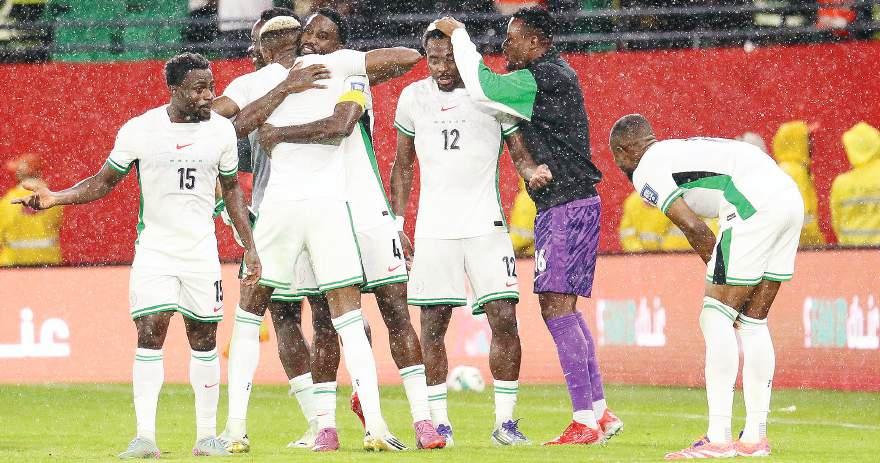
In a rare display of professional artistry, three golfers yesterday emerged winners in the ongoing 50th anniversary tournament of the Ikoyi Club 1938 Ladies’ Golf Section.
The winners who played a stableford format (29- 36 HCP) in the event which began on Tuesday included Tessy Okpalefe who scored
35 points, followed by Daisy Okocha with 33 points while the third position was clinched by Busela Joseph who had 31 points.Speaking on their victories, the trio of Okpalefe, Okocha and Busela said they were excited, fulfilled over their performance; adding however, that it calls for more commitment, dedication
and sacrifice to perfect their golfing skills, hoping to emerge winners, not only in this tourna- ment, but other international competitions.
The three-day tournament which ends today, has about 130 participants spread across 11 countries, with Nigeria having dominant presence with golfers from IBB International Golf Club,

Abuja, Port-Harcourt, Benin, Warri Golf Clubs, among others. Earlier, a Masterclass was held for ladies interested in golfing. According to Mrs. Yemi Afariogun, Head of Publicity Committee for the tournament, the “Masterclass, which is a form of lecture, entailed educating all those who are interested in playing golf and have registered for the session, on the language, rules, processes and techniques of playing the game.”
Tuesday’s kick off of the tournament was also preceded by a ‘Twilight Evening’; ac- cording to Mrs. Candy Agu, Past Ladies’ Captain of Ikoyi Club, The ‘Twilight Evening’ is “playing golf with fun under a relaxed setting before sun set”. Other activities held earlier included a cocktail, networking and bonding interaction among the participants.

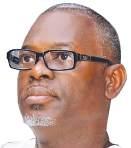
Unlike Professor Wole Soyinka’s Idi Amin caricature, my image of President Donald Trump is very much like Robert Holt’s portrayal of Henry V111, “who started with everything and squandered it all, who had the physical and mental fortitude to endure a lifetime of gratified greed. We recognise in him an archetype, one of the champions of our baser nature, and are in him, vicariously indulged”. Yet, in spite of it all, we still dare say, his intervention, though bearing his trademark aptitude for megalomaniac exaggeration, is of shock therapy utility. Truth is I never imagined that the day would come when I could find myself in something of a common purpose with the leading fascist and racist of the contemporary world.
I experienced the onset of a depressive episode in the early hours of November 7th 2015, the day Donald Trump was elected the president of America. For nearly a year thereafter, I avoided any news of America because I didn’t want to see or
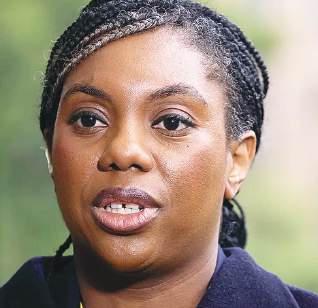
hear anything concerning the Trump presidency. I ended the abstinence when all started going awry for him and all looked set for the termina-
tion of his presidency four years to the date he was sworn in. My friend, Kunle Awojobi, was with me the night the first Trump tragedy befell America and the world. At the time, the Cable News Network, CNN, star commentator, Fareed Zakaria, metaphorically remarked that ‘Trump is a cancer on American democracy’.
When Kunle, whom I hadn’t seen for quite a while, rather fortuitously, wandered into my residence on the night of the American presidential election on the first Tuesday of November 2024, I had a premonition that here comes the Trump harbinger again! In subsequent confirmation of my misgivings, Trump went on to win the reelection.
Already, his second term has surpassed the first in the audacity of its assaults on the foundations of American democracy.
About a year ago and in somewhat a pleasant surprise, the Nigeria born British national, kemi Badenoch assumed the position of the leader of the Conservative Party in the United Kingdom,
UK, after a disastrous outing of her Party at the general elections. Perhaps, in a bid to act more British than King Charles, she fashioned herself as a conservative right wing ideologue in the mould of the American president.
With specific regards to her politics, I had earlier written that ‘I’m not a fan of right wing politics, let alone the neo Trumpian extreme right radicalism posturing. They generally tend towards bigotry and there are the pseudo ideologues, the demagogues and sundry political mercenaries who without real ideological convictions merely employ the platform as a tool for political gain’.
Hitherto, and with the subtlety of a thunderclap, she had launched a verbal grenade on the Nigerian political status quo. She said “I find it interesting that everybody defines me as being Nigerian. I identify less with the country than with the specific ethnicity [Yoruba]. That’s what I really am. I have
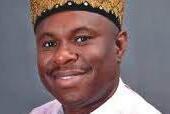
Taking the pulse of a nation can be either complicated or simple. Polls and surveys aim to measure people’s feelings; social media data provides valuable, timely insights into the national mood. But often, the best way is the oldest: gather with people who care about the country and listen to them.
On Monday, 10 November 2025, at the First Daily annual lecture, the question was clear—how can we make our votes count in 2027? Dr Sam Amadi of Abuja School of Social and Political Thoughts led the discussion, and panellists Majeed Dahiru, Gloria Ballason, Sam Itodo, Frank TieTie, and Randy Peterz agreed on one point: Nigerians want to vote, but many don’t trust the system to honour their choices. The low voter turnout in 2023 revealed a deep trust gap between citizens and the government on election matters.
What I’ve been hearing echoes everyday conversations in offices, markets, and bus stops. People who once stood in line to vote with hope
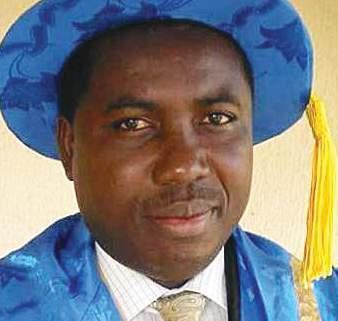
now just shrug and say, “They’ll fix it.” “ It is already decided”. Just before the last elections, less than a quarter of registered Nigerian voters
said they trusted the electoral process, according to a national survey by Tribune Newspaper. In 2023, it was clear: trust and voter turnout were closely linked. This feeling is no longer just private doubt—it’s becoming part of many people’s identity.
A growing group, which I call the Sceptic Tribe, consists of voters who fear their votes won’t count or will be ignored. This group reflects the number of people who have lost faith in the election process.
The Sceptic Tribe isn’t an official group; it’s more a way people have adapted. It includes those who voted and now doubt it mattered, those who registered but chose not to vote, and those who are afraid of intimidation or believe the system is not designed to work. Their doubt makes sense because trust in the electoral system is hard to find, and absolute proof is rare.
How we got here is a story made up of many events that have accumulated until suspicion became the norm.
First, promises by those managing the electoral
process are often broken: timelines are pushed back after elections, and transparency talks fade when legal or practical challenges arise. This gap between words and actions causes disinterest and apathy. Second, electoral reforms are hit-or-miss: good, detailed proposals followed in 2019 and 2023, but politicians treat them as talking points rather than actions. Third, courts are overwhelmed or compromised: many petitions are filed, but verdicts are inconsistent, and long delays fuel suspicion even when judges act rightly. Fourth, one party appears dominant: when the same group stays in power regardless of citizens’ aspirations and choices, many believe political change is impossible. Fifth, opposition parties are manifestly weaker: defections, sponsored internal crises, and legal battles drain their energy, making voters feel they have fewer real choices. Sixth, technology lets people down by design: new devices and a public results